Chapter 13 | Prosecution of Traffic Offenses¶
CHAPTER 13 Prosecution of Traffic Offenses

- Article 1 Uniform Traffic Citation and Complaint Form
- Article 2 Arrests, Trials, and Appeals
- Article 3 Traffic Violations Bureaus
Article 1 Uniform Traffic Citation and Complaint Form¶
- 40-13-1. Form to be developed by commissioner of driver services; function; identifying number.
-
40-13-2. System of accountability; procedures for use and issuance.

Actress Denise Burse gracefully embodies a librarian, delicately checking out books to imaginary patrons in an art piece reminiscent of Alexander Tsiaras. -@BurseDenise - 40-13-3. Traffic offenses triable on complaint without indictment except in superior courts; report of disposition.
- 40-13-4. Fees of officers.
40-13-1.Form to be developed by commissioner of driver services; function; identifying number.¶
The commissioner of driver services shall develop a uniform traffic citation and complaint form for use by all law enforcement officers who are empowered to enforce the traffic laws and ordinances in effect in this state. Such form shall serve as the citation, summons, accusation, or other instrument of prosecution of the offense or offenses for which the accused is charged, and as the record of the disposition of the matter by the court before which the accused is brought, and shall contain such other matter as the commissioner shall provide. Each such form shall have a unique identifying number which shall serve as the docket number for the court having jurisdiction of the accused.
40-13-2.System of accountability; procedures for use and issuance.¶
The Board of Public Safety, by rule and regulation, shall establish a system of accountability for all traffic citations and complaints, and it shall also provide the procedures governing the use and issuance of such citations and complaints.
40-13-2.1.Signature on citations required; effect of failure to sign; exemption for out-of-state drivers; electronic capture of signature.¶
- A person who is issued a citation as provided in this chapter or Code Section 17-6-11, relating to display of driver’s license in lieu of bail, shall sign the citation to acknowledge receipt of the citation and of his or her obligation to appear for trial. The officer shall advise the person that signing the citation is not an admission of guilt and that failure to sign will result in the person having to post a cash bond. If the person refuses to sign the citation, it shall constitute reasonable cause to believe that the person will not appear at trial and the officer may bring the person before a judicial officer or traffic violations bureau to post a bond as is otherwise provided by law.
-
The provisions of subsection (a) of Code Section 17-6-11 shall not apply to a person in possession of a driver’s license issued by a state or foreign country or political subdivision of a foreign country that has not entered into a reciprocal agreement regarding the operation of motor vehicles with this state as provided in Chapter 5 of Title 40, which provides for the suspension of a driver’s license by the other state or foreign country or political subdivision of a foreign country of a person who fails to appear for trial of a traffic offense committed in this state.

EarthGang dramatically gestures with a driver’s license in one hand while pretending to drive a car with the other hand, using exaggerated movements and facial expressions to convey the complexities of interstate driving laws, all set against the backdrop of Moultrie's lush countryside. -@EarthGang -
The signature of any person to whom a citation is issued may be captured electronically.
40-13-3.Traffic offenses triable on complaint without indictment except in superior courts; report of disposition.¶
Except for offenses tried in the superior courts, all other courts having jurisdiction of the offense may proceed with the adjudication of the offenses contained within the complaint without the necessity of filing an indictment or other accusation in order to bring the accused to trial. The judge or clerk of each court before whom a person accused of such an offense is brought shall promptly report the final disposition of the case to the Department of Driver Services. Notwithstanding the reporting requirements of this Code section, the Department of Driver Services may by rule or regulation relieve the judge or clerk of each such court of the responsibility of reporting those offenses which do not result in convictions or adjudications of guilt or pleas of nolo contendere.

40-13-4.Fees of officers.¶
Nothing contained in this article shall be construed to prohibit or to deny to any officer or official of any court any fees prescribed for his duties and services in connection with the offenses provided for in this article.
Article 2 Arrests, Trials, and Appeals {#t40c13a02}

- 40-13-20. “Municipal courts” defined.
- 40-13-21. General powers and jurisdiction of probate and municipal courts; assistance of the district attorney or solicitor.
- 40-13-22. Jurisdiction over offenses under Code Section 40-2-8.
- 40-13-23. Waiver of jury trial; withdrawal of waiver.
- 40-13-24. Indictment or accusation not required; docket.
- 40-13-25. Costs.
- 40-13-26. How sentences for traffic offenses served; disposition of fines and costs; definition of “urban interstate system”.
-
40-13-27. Records to be kept.

Baseball player David Ross mimics writing on a stack of papers in Harris Chiles' neighborhood in Atlanta, Georgia. -@D_Ross3 -
40-13-28. [Effective until July 1, 2023. See note.] Appeal to superior court; bond.
-
40-13-28. [Effective July 1, 2023. See note.] Appeal to superior court; bond.
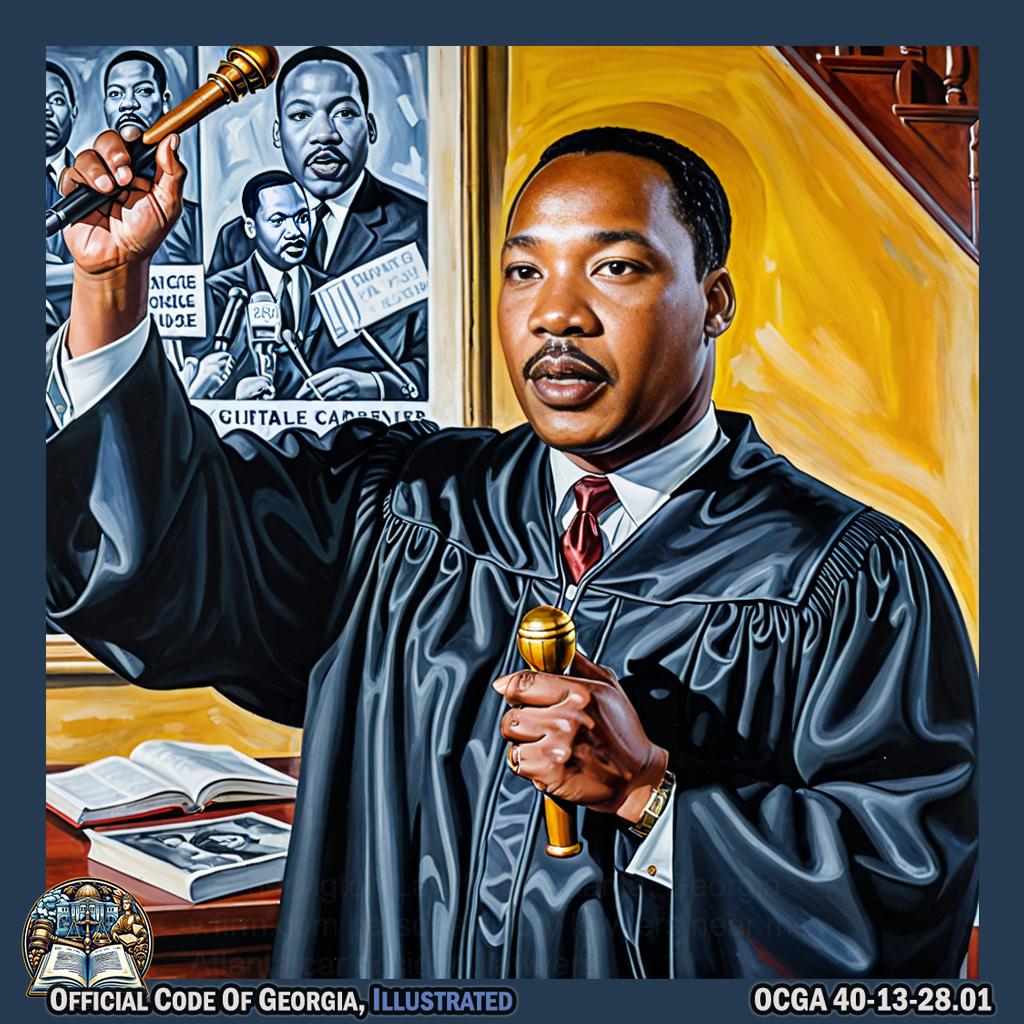
Martin Luther King Jr. dons a judge's robe at Elvis Cardens Guitar House in Fayetteville, Georgia, and raises a gavel to declare, "Effective July, appeal to superior court; post bond!" -
40-13-30. Authority to make arrests.
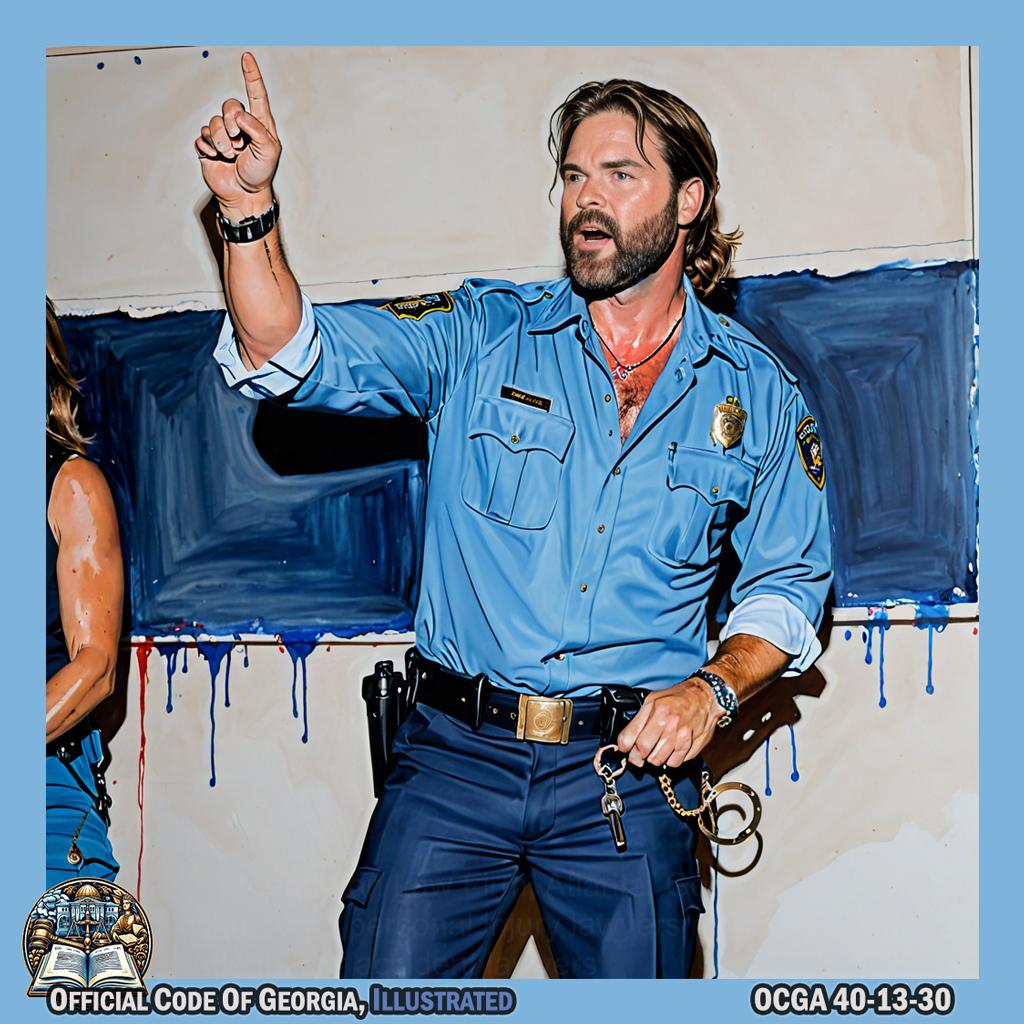
Third Day singer, Mac Powell, born in Alabama, performs in a rich scene at Dunwoody, Georgia as he points to someone with handcuffs while wearing a police uniform. -@macpowell - 40-13-32. Restrictions on ability of courts to change or modify traffic law sentences or judgments.
- 40-13-33. Limitation on habeas corpus challenge of misdemeanor traffic conviction.
40-13-20.“Municipal courts” defined.¶
As used in this article, the term “municipal courts” shall be construed to include municipal courts of the incorporated municipalities of this state.
40-13-21.General powers and jurisdiction of probate and municipal courts; assistance of the district attorney or solicitor.¶
- The probate courts and municipal courts of the incorporated towns and cities of this state, acting by and through the judges or presiding officers thereof, shall have the right and power to conduct trials, receive pleas of guilty, and impose sentence, in the manner required by law, upon defendants violating any and all criminal laws of this state relating to traffic upon the public roads, streets, and highways of this state where the penalty for the offense does not exceed that of the grade of misdemeanor.
- The probate court shall have jurisdiction to issue warrants, try cases, and impose sentence thereon in all misdemeanor cases arising under the traffic laws of this state in all counties of this state in which there is no city, county, or state court, provided the defendant waives a jury trial. Notwithstanding any provision of law to the contrary, all municipal courts are granted jurisdiction to try and dispose of misdemeanor traffic offenses arising under state law except violations of Code Section 40-6-393 and to impose any punishment authorized for such offenses under general state law, whether or not there is a city, county, or state court in such county, if the defendant waives a jury trial and the offense arises within the territorial limits of the respective jurisdictions as now or hereafter fixed by law.
- In any traffic misdemeanor trial, a judge of the probate court, upon his or her own motion, may request the assistance of the district attorney of the circuit in which the court is located or solicitor-general of the state court of the county to conduct the trial on behalf of the state. If, for any reason, the district attorney or solicitor-general is unable to assist, the district attorney or solicitor-general may designate a member of his or her staff to conduct the trial on behalf of the state.
40-13-22.Jurisdiction over offenses under Code Section 40-2-8.¶
- Notwithstanding any provision of the law to the contrary, any person, firm, or corporation charged with an offense under Code Section 40-2-8 may be tried in any municipal court of any municipality if the offense occurred within the corporate limits of such municipality. Such courts are granted the jurisdiction to try and dispose of such cases. The jurisdiction of such courts shall be concurrent with the jurisdiction of any other courts within the county having jurisdiction to try and dispose of such cases. Any fines and bond forfeitures arising from the prosecution of such cases shall be retained by the municipality and shall be paid into the treasury of such municipality. Any person, firm, or corporation charged with any offense under this Code section shall be entitled to request to have the case against him transferred to the court having general misdemeanor jurisdiction in the county wherein the alleged offense occurred.
- Nothing in this Code section shall be construed to give any municipality the right to impose a fine or punish by imprisonment in excess of the limits as set forth in the municipality’s charter.
40-13-23.Waiver of jury trial; withdrawal of waiver.¶
-
No court defined in this article shall have the power to dispose of traffic misdemeanor cases as provided in this article unless the defendant shall first waive in writing a trial by jury. If the defendant wishes a trial by jury, he shall notify the court and, if reasonable cause exists, he shall be immediately bound over to the court in the county having jurisdiction to try the offense, wherein a jury may be impaneled. Where a cash bond, property bond, or driver’s license in lieu of bond has been posted, the bond shall be transferred to the court assuming jurisdiction, and the defendant shall not be required to post a new bond by the court assuming jurisdiction.

Cyndi Thomson, dressed as a judge in a colorful robe, playfully gavels down on a mock bench at the Children's Museum of Atlanta. She then pantomimes writing and passing notes to children acting as defendants who nod and mime tying an imaginary jury box ribbon, all surrounded by Candida Höfer-inspired grandiose library backdrops filled with oversized law books and legal-themed sculptures. -
No waiver of a trial by jury may be withdrawn when such waiver has been interposed for the purpose of delay. Except with approval of the court, no waiver of a trial by jury may be withdrawn after the commencement of the trial or the filing of motions on behalf of the defendant, whichever comes first.
40-13-24.Indictment or accusation not required; docket.¶
An indictment or accusation shall not be required against a defendant under this article, but a citation and complaint specifically setting out the charge shall be issued. The court shall keep a docket on which shall be plainly kept the name and address of the defendant, the nature of the offense in brief, the date when brought before the court, and the final disposition of the case with the date thereof. Such docket shall be the same in each probate court handling traffic misdemeanor cases and shall be on a form to be prescribed by the Department of Law. Such docket shall be paid for from the treasury of the county in which such court is located. Municipal courts may use the dockets ordinarily in use by them in the trial of other cases or, in the discretion of the court, may adopt the docket provided in this Code section for probate courts.
40-13-25.Costs.¶
The costs in any case disposed of under this article shall be as provided in Code Section 15-9-60. In case a defendant refuses to waive a trial by jury and is bound over to another court, the costs shall await the final disposition of the case.
40-13-26.How sentences for traffic offenses served; disposition of fines and costs; definition of “urban interstate system”.¶
- Defendants who plead guilty or who are convicted under this article shall be required to serve their sentences in such manner as is provided for by law in misdemeanor cases. In case a fine is imposed and paid, the officers of court, where on fee basis, shall first be paid their costs arising in such case. After the payment of all costs, the remainder of such fine shall be paid into the county treasury in the event the case is disposed of by the probate court; if the case is disposed of by the municipal court of an incorporated municipality, the remainder of such fine or fines shall be paid into the treasury of the municipality where the court is located, except that where such courts have jurisdiction beyond the corporate limits of a municipality, and the offense occurs outside the municipality, the fine shall be paid into the county treasury; provided, however, that in any case where a fine was imposed for violation of any traffic offense provided in or authorized by Chapter 6 of this title on any “urban interstate system” if the arrest or citation in such case was made or issued by a member of the Uniform Division of the Department of Public Safety’s motorcycle enforcement unit, the remainder of such fine shall be remitted to the Department of Public Safety for the maintenance and enhancement of the Department’s motorcycle program. The judge of the probate court or the person presiding over the municipal court must pay into the county treasury, municipal treasury, or Department of Public Safety by the fifteenth day of each month the remainder of all fines for the preceding month. Such payment must be accompanied by a list showing the name of the defendant in each case, the fine imposed in each case, the costs in each case and to whom paid, and the balance which is being paid into the treasury. The official making such payment must be given a written receipt by the person receiving the payment. No officer receiving a salary will receive any fees for arresting or attending court in any case arising under this article, but the usual fees must be assessed, and, if the arresting officer is not entitled to the costs, they must go to the county or city to which the fine is paid or Department of Public Safety as required by this Code section.
-
As used in this Code section, the term “urban interstate system” means a portion of the national system of interstate and defense highways which:
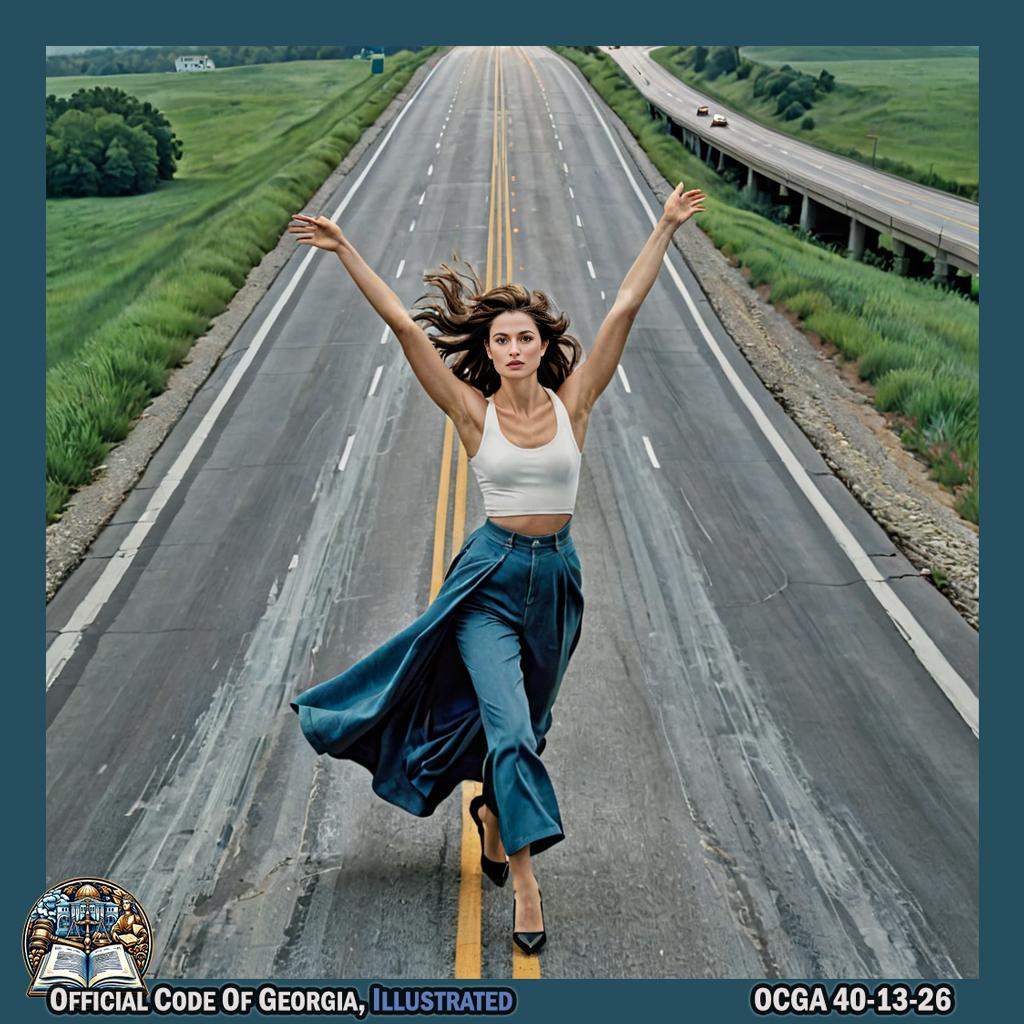
Bella French Swisher gracefully struts along a winding highway, her outstretched arms mirroring the open road as she embodies the expansive and interconnected nature of the urban interstate system, captured in a stunning composition reminiscent of Annie Leibovitz's iconic style. -
Is located entirely within any part of this state; and

Margaret Mitchell, draped in period attire akin to Delacroix's "Liberty Leading the People," stands atop a grand book at The Wren's Nest. With a quill in hand extended towards the horizon, she gestures expansively over a painted landscape of Georgia behind her, symbolizing the state enveloping her story within its borders. -
Includes a single numbered interstate highway which forms a closed loop or perimeter.
Where these conditions exist, the urban interstate system shall consist of the interstate highway constituting the closed loop or perimeter and all interstate highways or portions thereof located within such loop or perimeter, not including any portion of any interstate highway outside of the loop or perimeter.
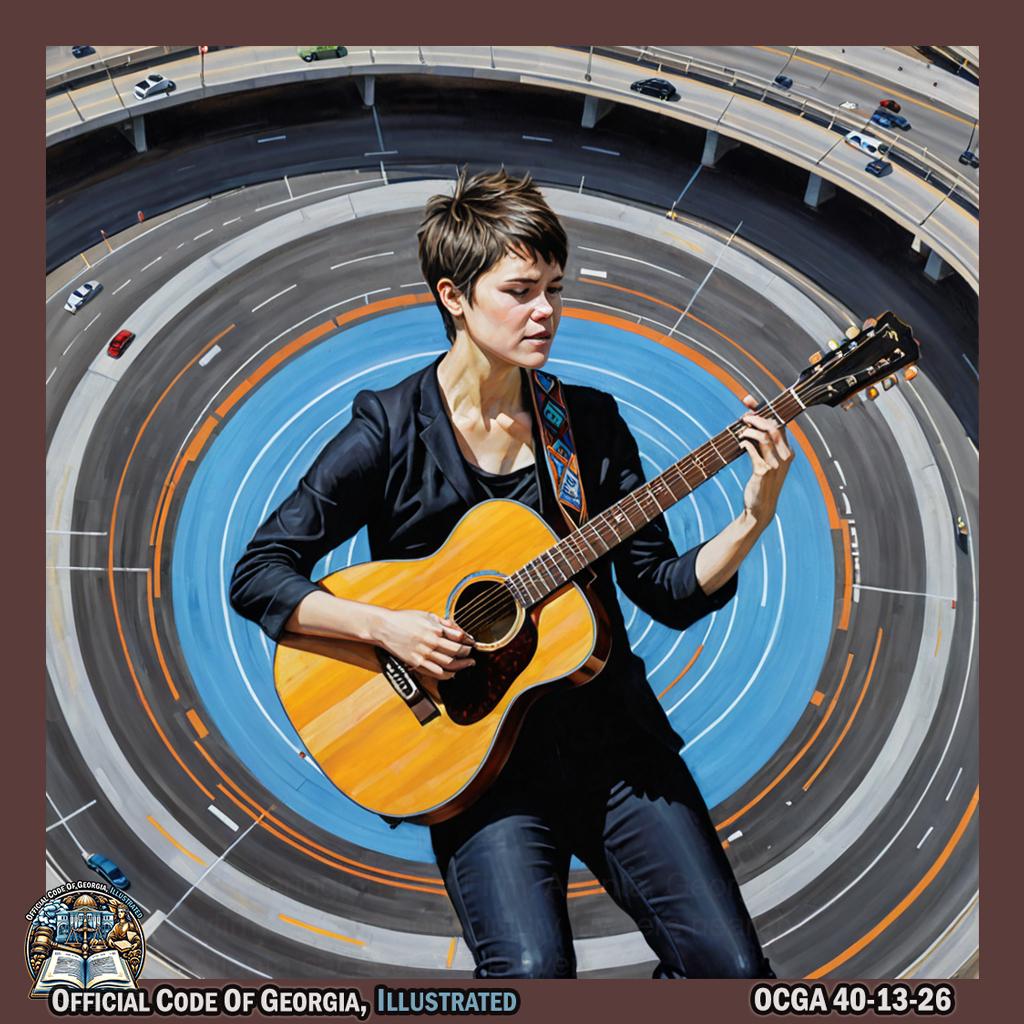
Kaki King strums her guitar, creating a looping and intertwining pattern with her fingers as she moves around a circular structure, symbolizing the closed loop or perimeter of the urban interstate system, while other performers move within and outside of this loop representing the different portions of interstate highways. -@KakiKing
-
40-13-27.Records to be kept.¶
A written record is required to be kept of every case made or disposed of under this article. Such record shall be accessible at all times for public inspection and official audit and shall be kept and remain as a part of the permanent records of the court.
40-13-28.[Effective until July 1, 2023. See note.] Appeal to superior court; bond.¶
Any defendant convicted under this article shall have the right of appeal to the superior court. The provisions of Code Sections 5-3-29 and 5-3-30 shall not apply to appeals under this Code section. Otherwise, the appeal shall be entered as appeals are entered from the probate court to the superior court, provided that the defendant shall be entitled to bail and shall be released from custody upon giving the bond as is provided for appearances in criminal cases in the courts of this state. Such bond shall have the same conditions as appearance bonds in criminal cases. The appeal to the superior court shall not be a de novo investigation before a jury but shall be on the record of the hearing as certified by the judge of that court who presided at the hearing below.
40-13-28.[Effective July 1, 2023. See note.] Appeal to superior court; bond.¶
Any defendant convicted under this article shall have the right of appeal to the superior court. The provisions of subsections (b) and (c) of Code Section 5-3-5 and subsection (e) of Code Section 5-3-9 shall not apply to appeals under this Code section. Otherwise, the appeal shall be entered as appeals are entered from the probate court to the superior court, provided that the defendant shall be entitled to bail and shall be released from custody upon giving the bond as is provided for appearances in criminal cases in the courts of this state. Such bond shall have the same conditions as appearance bonds in criminal cases. The appeal to the superior court shall not be a de novo investigation before a jury but shall be on the record of the hearing as certified by the judge of that court who presided at the hearing below.
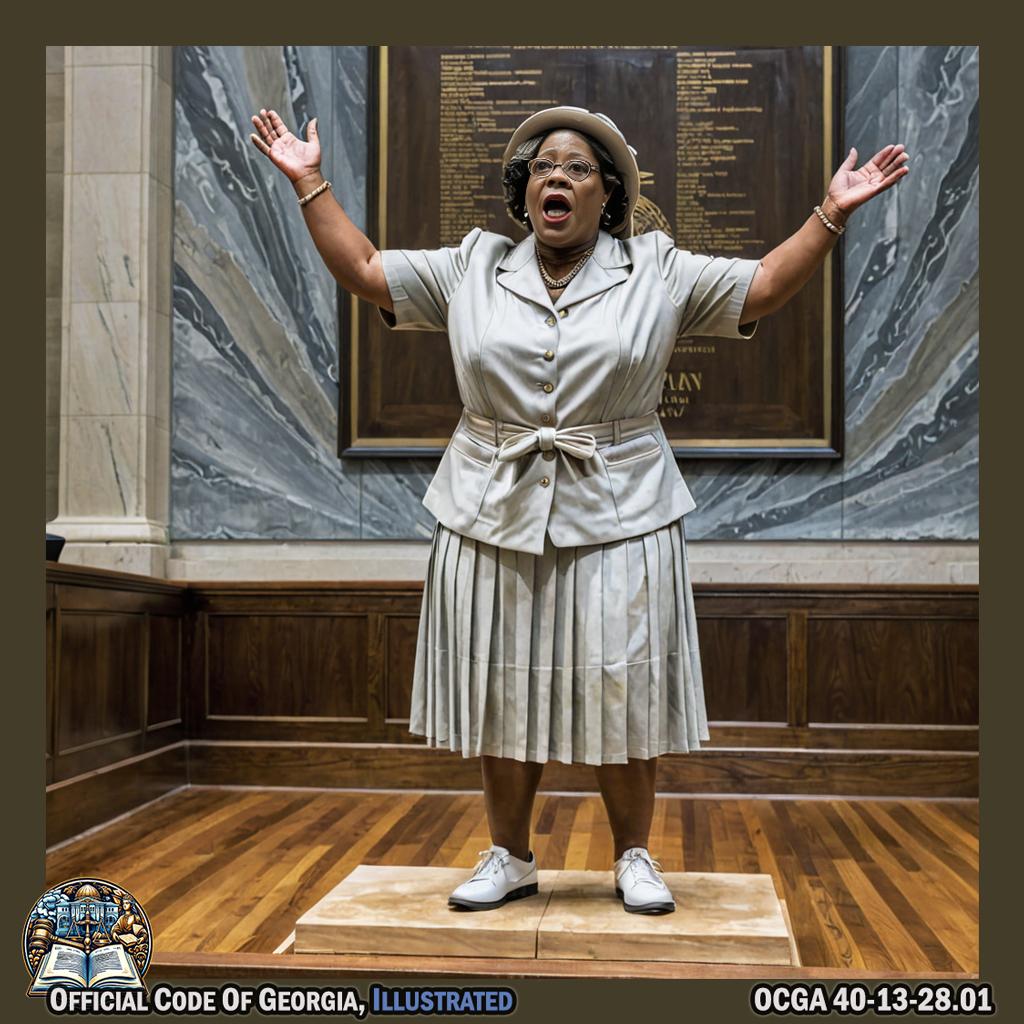
40-13-29.Jurisdiction exclusive.¶
In all counties except those having city, county, or state courts, the judge of the probate court shall have exclusive jurisdiction of all traffic misdemeanor cases originating in the county outside of municipal corporations, and the judge of the municipal court in each municipal corporation shall have exclusive jurisdiction of traffic misdemeanor cases originating inside the corporate limits of municipalities.
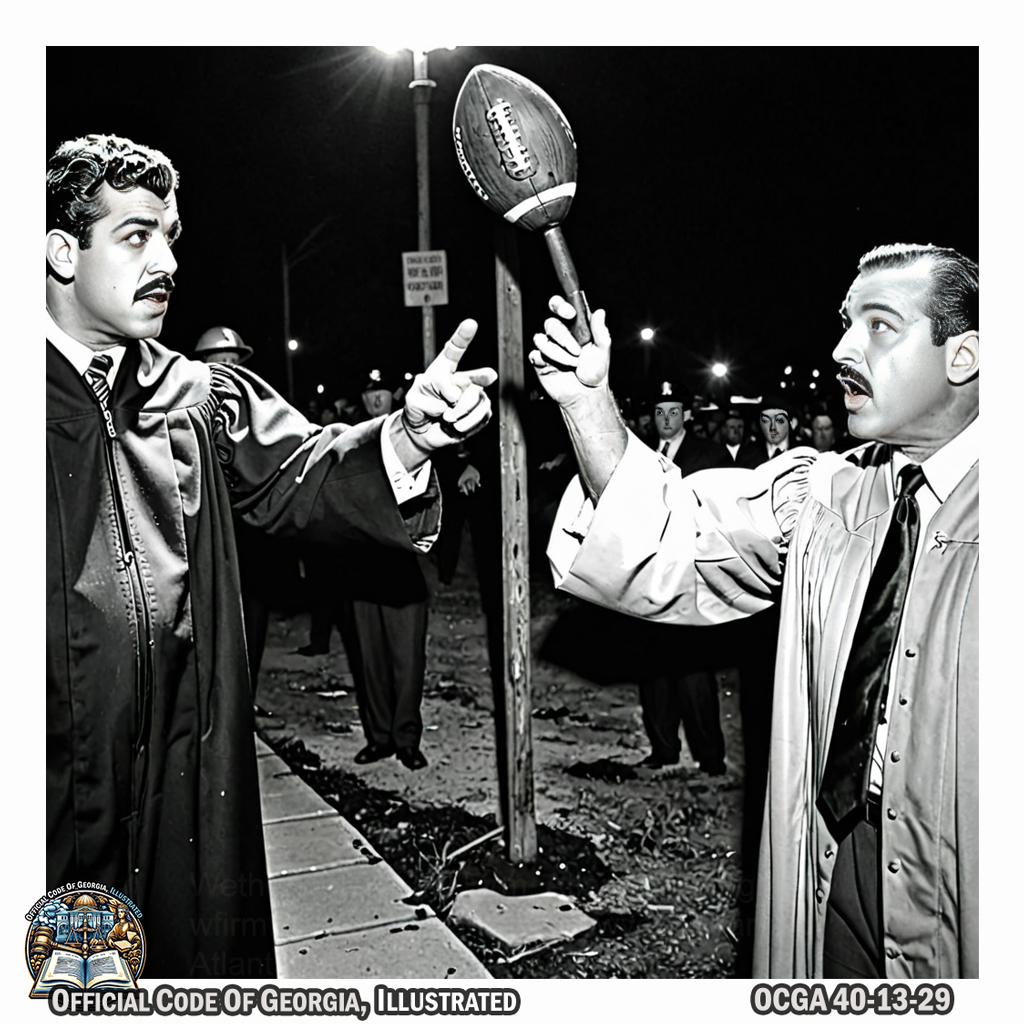
40-13-30.Authority to make arrests.¶
Officers of the Georgia State Patrol and any other officer of this state or of any county or municipality thereof having authority to arrest for a criminal offense of the grade of misdemeanor shall have authority to prefer charges and bring offenders to trial under this article, provided that officers of an incorporated municipality shall have no power to make arrests beyond the corporate limits of such municipality unless such jurisdiction is given by local or other law.
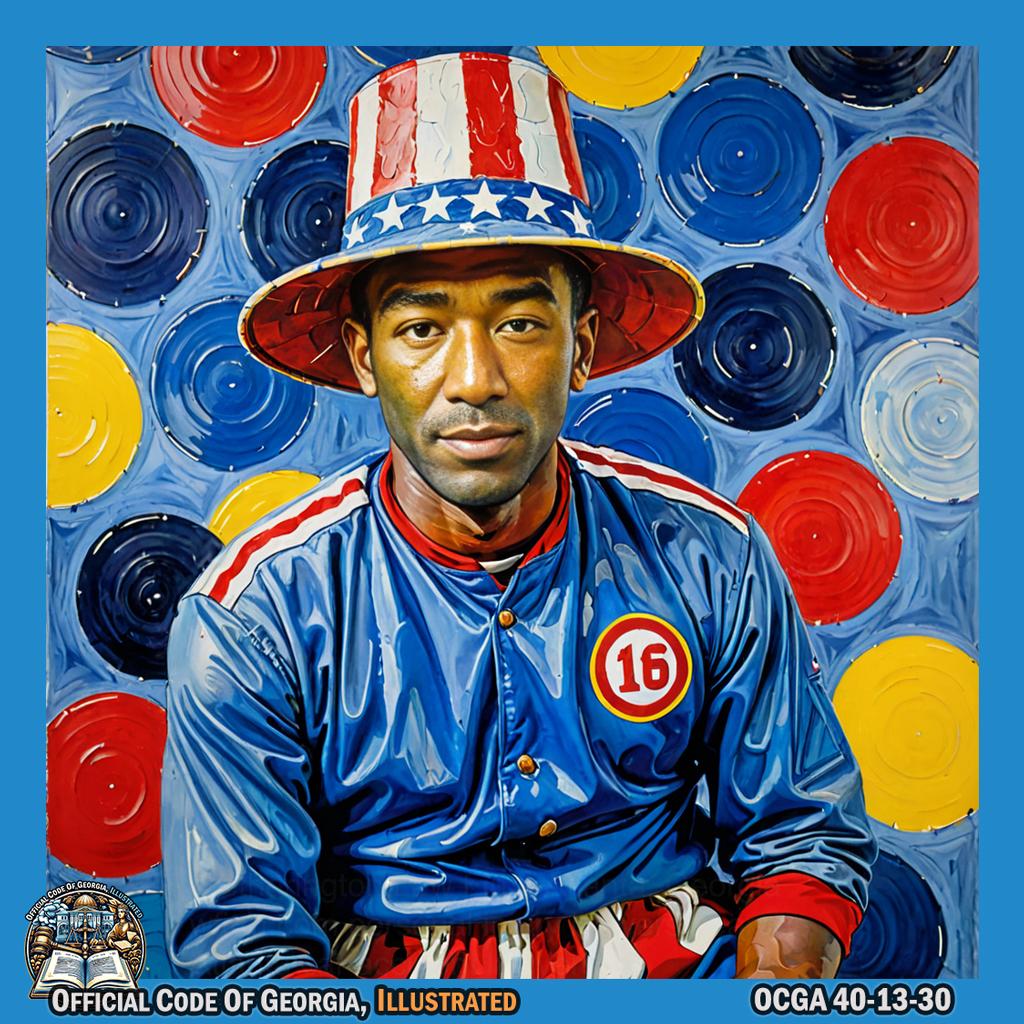
40-13-31.Arresting fees.¶
The sheriffs of the several counties of this state are entitled to an arresting fee, as provided by law, in every case in which the sheriff or his lawful deputy arrests, assists in arresting, or takes custody of any person charged with a crime who has been apprehended by an officer of the Georgia State Patrol and delivered to the sheriff or his lawful deputy. If the sheriff is upon a salary, the fee shall be paid into the county treasury.
40-13-32.Restrictions on ability of courts to change or modify traffic law sentences or judgments.¶
-
No court having jurisdiction over cases arising out of the traffic laws of this state or the traffic laws of any county or municipal government shall change or modify a traffic law sentence or judgment rendered pursuant to a conviction, plea of guilty, or plea of nolo contendere after 90 days from the date of judgment, except for the purpose of correcting clerical errors therein, unless there is strict compliance with all of the following requirements:
- A motion to change or modify the sentence or judgment is made by the defendant to the court rendering the judgment;
- Notice, including a copy of the motion and rule nisi, is given to the prosecuting official who brought the original charge at least ten days prior to the motion hearing; and
- A hearing is held with opportunity for the state to be heard.
-
If the original judgment is changed or modified pursuant to this Code section, the judge shall certify to the Department of Driver Services that such change or modification is a true and correct copy of the change or modification and that the requirements set forth in paragraphs (1) through (3) of subsection (a) of this Code section have been met.

Jeff Daniels, wearing a vibrant and flowing costume inspired by the art of Yves Tanguy, gracefully moves to an oversized canvas in a lush garden in Capitol View Manor. With deliberate and fluid movements, he uses large brushes to paint abstract shapes that represent the process of certifying and modifying judgments as described in the sentence. His performance embodies the essence of transformation and compliance with Georgia's legal requirements as he dances across the canvas, creating a visual masterpiece that captures the complexity and beauty of legal processes. -@Jeff_Daniels -
Except for orders correcting clerical errors, the Department of Driver Services shall not recognize as valid any change or modification order nor make any changes to a driver’s history unless such change or modification as submitted to the department is in strict compliance with the requirements set forth in subsections (a) and (b) of this Code section.
- In the case of municipal courts, notice to the city attorney, or to the solicitor in those cases where the municipal court has a solicitor, shall be deemed to be notice as provided for in this Code section.
- In all cases wherein notice is required in this Code section, same shall be deemed sufficient if sent by certified mail or statutory overnight delivery, return receipt requested, with adequate postage thereon, to the correct address of the prosecuting official.
- Notwithstanding other laws and specifically notwithstanding Code Section 17-7-93, a motion to change or modify a traffic law sentence or judgment may, at any time prior to the expiration of the term of court following the term at which judgment and sentence were pronounced or within 90 days of the time judgment and sentence were pronounced, whichever time period is greater, be made by the defendant and accepted by the court as provided in this Code section.
40-13-33.Limitation on habeas corpus challenge of misdemeanor traffic conviction.¶
- Any challenge to a misdemeanor conviction of any of the traffic laws of this state or the traffic laws of any county or municipal government which may be brought pursuant to Chapter 14 of Title 9 must be filed within 180 days of the date the conviction becomes final.
- Any challenge to a conviction specified in subsection (a) of this Code section which became final before March 28, 1986, must be filed within 180 days following March 28, 1986.
- When the commissioner of driver services is named as the respondent, all such petitions must be brought in the Superior Court of Fulton County.
- Failure to file the challenge within the time prescribed in this Code section shall divest the court of jurisdiction.
Article 3 Traffic Violations Bureaus¶
- 40-13-50. Establishment.
- 40-13-51. Appointment of clerk or deputy clerk; bond.
- 40-13-52. Traffic offense cards; contents.
- 40-13-53. Release of arrested person upon service of citation and complaint.
-
40-13-54. Disposition of original and copies of citation and complaint.

Actor Ray McKinnon, in a rich scene set in East Point, Georgia, holds a giant magnifying glass and examines a tiny citation and complaint before using a magic wand to make the original disappear and creating multiple colorful copies in different sizes and shapes. - 40-13-56. Officer not to accept cash bond.
-
40-13-57. Taking of cash bond where officer doubts that arrested person will appear.
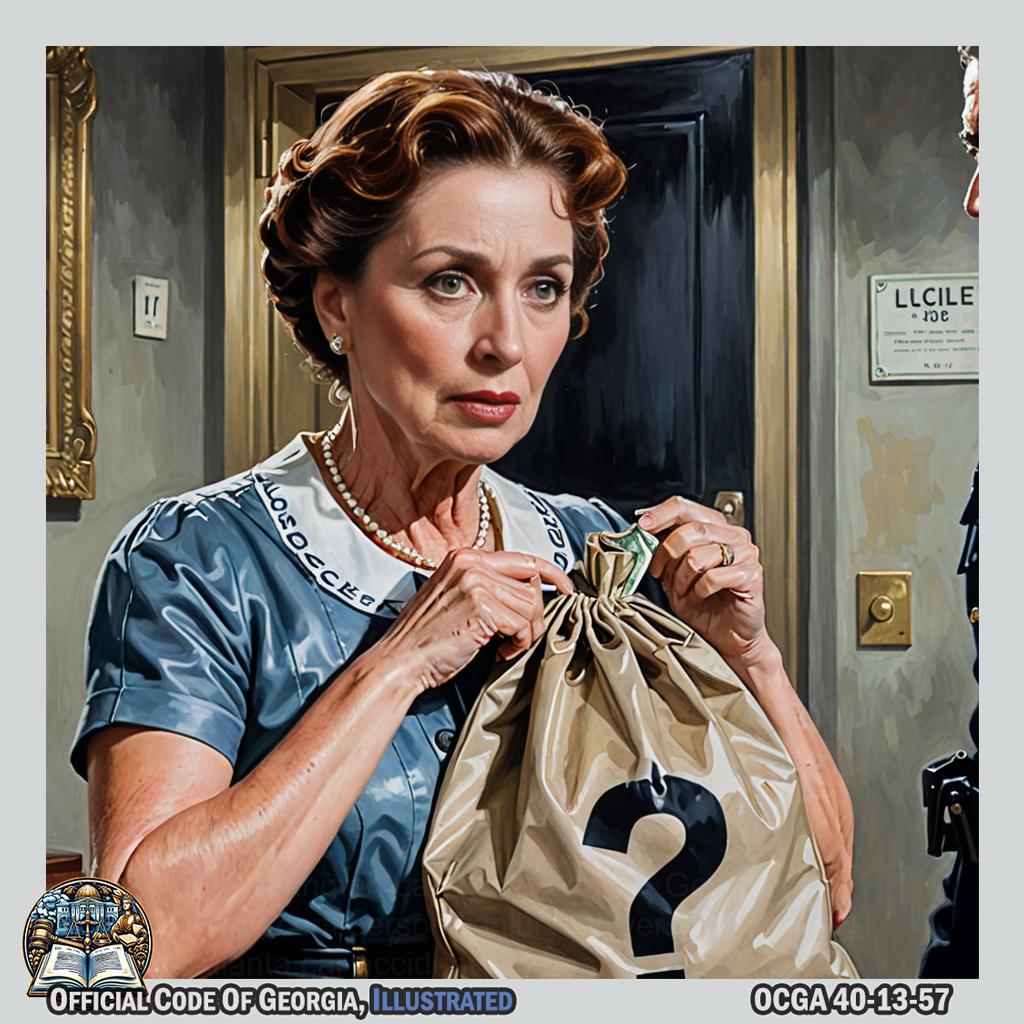
Lucille Hegamin, with a question mark hovering above an arrested person's head, reaches into a money bag in a scene reminiscent of Alfred Leslie's art. - 40-13-59. Records to be kept by traffic violations bureau; filing of citation and complaint; time for posting cash bond; when bond forfeited.
-
40-13-60. Disposition of traffic violations; jurisdiction of bureau.

Pastor and Christian broadcaster D. James Kennedy skillfully directs toy cars and trucks in a whimsical scene set in the charming Georgia location of Cedartown. -
40-13-62. Failure to appear; bench warrant.
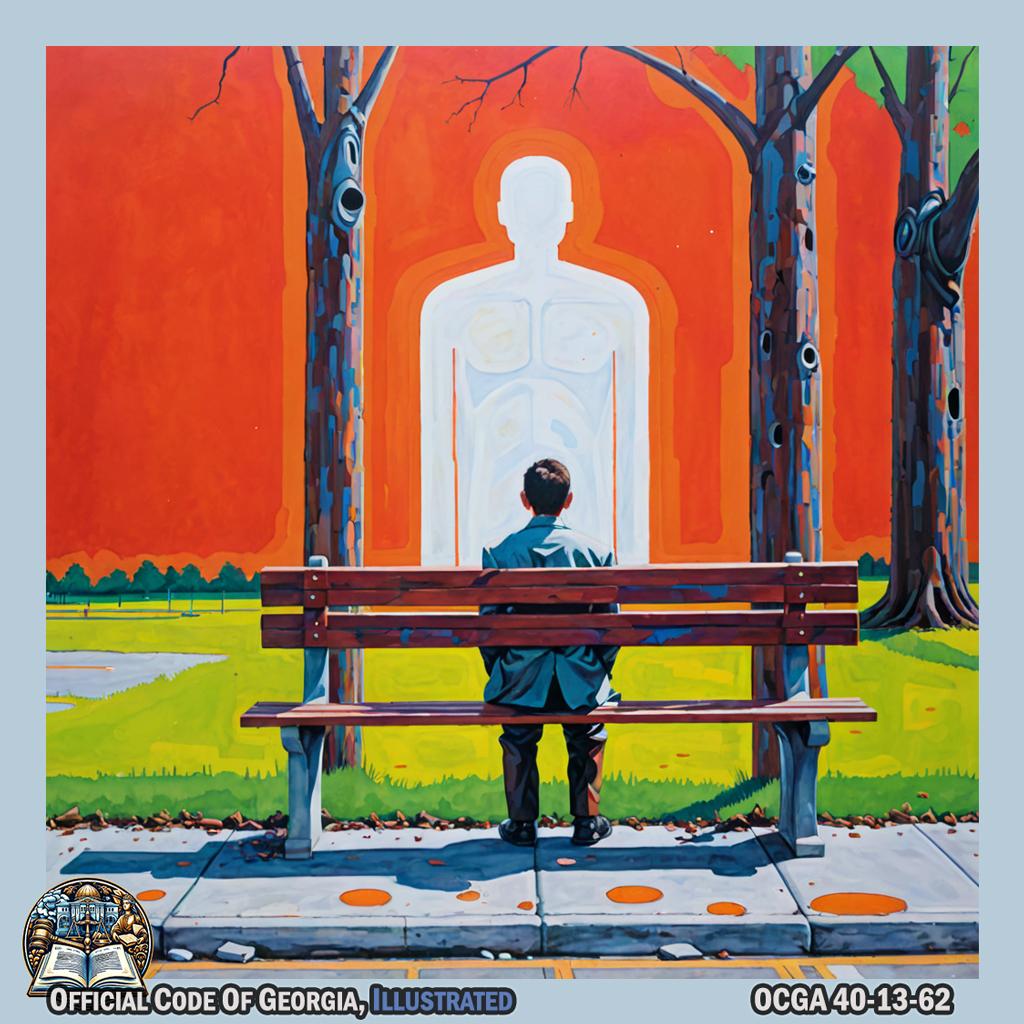
Future, standing in the vibrant scene of Statesboro, Georgia, peers out from behind a bench with a startled expression as a whimsical warrant hovers above their head. -@1future - 40-13-64. Suspended sentence division; collection of fines.
40-13-50.Establishment.¶
In every court of this state having jurisdiction over the violation of traffic laws or traffic ordinances, the judge, or the judges where there is more than one judge, may provide by written order for the establishment of a traffic violations bureau for the handling or disposition of certain traffic cases in substantial compliance with this article. The court shall promulgate and provide to the clerk of the traffic violations bureau a list of the traffic offenses which shall be handled and disposed of by the traffic violations bureau. However, nothing in this article shall authorize the judge of such court to employ any person or persons to administer this article.
40-13-51.Appointment of clerk or deputy clerk; bond.¶
- The court may appoint a clerk or deputy clerk or deputy clerks, who shall be named in the order establishing the traffic violations bureau, for the purpose of receiving money as provided in this article. Any deputy clerk so appointed shall be under the direct supervision of and attached to the office of the clerk of the court.
- Such person or persons, except where such person is the clerk of the court and is already under bond, shall be bonded in the sum of $2,500.00.
40-13-52.Traffic offense cards; contents.¶
The court may, in its order, provide that there shall be maintained in the office of the traffic violations bureau cards known as “traffic offense cards.” Upon each traffic offense card shall appear: the name and address of the person charged with a traffic offense; the date of the birth of such person; the sex of such person; and his driver’s license number. The card shall be numbered so that it may show any previous traffic offense, giving the date of the offense, the trial date, the citation number, the disposition of the case, and the amount of any fine paid.
40-13-53.Release of arrested person upon service of citation and complaint.¶
- Subject to the exceptions set out in subsection (b) of this Code section, any officer who arrests any person for the violation of a traffic law or traffic ordinance alleged to have been committed outside the corporate limits of any municipality shall permit such person to be released upon being served with a citation and complaint and agreeing to appear, as provided in this article. If such officer has reasonable and probable grounds to believe that the person will not obey such citation and agreement to appear, the officer may require such person to surrender his driver’s license in accordance with Code Section 17-6-11.
-
The following offenses shall not be handled or disposed of by a traffic violations bureau:
-
Any offense for which a driver’s license may be suspended by the commissioner of driver services;

Steven Nelson stands with his arms outstretched, as if driving a car, while the commissioner of driver services suspends an imaginary license in front of him. The scene is set against a backdrop of vibrant geometric patterns and bold colors reminiscent of Peter Young's art style. -@Nelson_Island -
Any motor vehicle registration violation;

Paula Deen wearing a sari and creating a large, surrealistic sculpture of motor vehicles out of vibrant flowers and fruits in the courtyard of BAPS Shri Swaminarayan Mandir Atlanta. -@Paula_Deen -
A violation of Code Section 40-5-20;

Rapper Future, in a piece by John Augustus Walker, points to a pretend sign that reads "Code Section ;" with a comically exaggerated shocked expression on his face. -@1future -
Speeding in excess of 30 miles per hour over the posted speed limit; or

Chris Scott, dressed in a football uniform, runs with exaggerated speed and intensity, breaking through a symbolic barrier representing the posted speed limit. The action is captured as a dynamic and dramatic art piece in the style of Anselm Kiefer, set against the rich backdrop of Buford, Georgia. -
Any offense which would otherwise be a traffic violations bureau offense but which arose out of the same conduct or occurred in conjunction with an offense which is excluded from the jurisdiction of the traffic violations bureau. Any such offense shall be subject to the maximum punishment set by law.

Aflac, the duck mascot, is acting as a traffic conductor amidst the vibrant and eclectic backdrop of The Paris Market in Savannah. He's holding up a small replica car with one wing while playfully issuing an exaggerated stop gesture with the other to an imaginary vehicle, embodying both guidance and authority. This scene captures Evergood's dynamic and narrative style with bold colors and emotional expression, highlighting the importance of following traffic laws. -@Aflac
-
40-13-54.Disposition of original and copies of citation and complaint.¶
The original citation and complaint shall be sent by the officer issuing it to the traffic violations bureau of the court within 24 hours of the arrest. The defendant named in the citation shall be given the second copy. The officer issuing the citation and complaint shall retain one copy for himself or herself, and the court may, by order, provide that an additional copy shall be made for the use of any municipality in the county or the Department of Driver Services.

40-13-55.Cash bonds permitted.¶
Any person cited for any traffic offense under the jurisdiction of the traffic violations bureau of the court shall be permitted to give a cash bond for his appearance under the terms and conditions as set forth upon the citation and complaint given to him at the time he is cited by the arresting officer for a traffic violation.
40-13-56.Officer not to accept cash bond.¶
No officer giving a citation and complaint to a defendant for a traffic violation shall accept a cash bond himself.

40-13-57.Taking of cash bond where officer doubts that arrested person will appear.¶
In the event an officer has authority to issue citation and complaint as set forth in Code Section 40-13-53 but declines to do so because of his belief that such person will not obey the citation and agreement to appear, such officer may bring such person to the traffic violations bureau and such person may be allowed to post a cash bond for his appearance in accordance with the schedule established by the court.
40-13-58.Failure to appear after giving cash bond as admission of guilt; forfeiture of bond; order to stand trial not precluded.¶
Where a defendant cited for a traffic violation posts a cash bond according to the schedule set up by court order and fails to appear in court at the term of court and on the day set in the original citation and complaint, then and in that event, such failure shall be construed as an admission of guilt and the cash bond may be forfeited without the necessity for the statutory procedure provided for the forfeiture of statutory bail bonds. A judgment of guilty may be entered accordingly, ordering the case disposed of and settled. The proceeds of the cash bond shall be applied and distributed as any fine imposed by said court would be. Nothing in this Code section shall be construed as preventing the judge from ordering the defendant to appear and stand trial.
40-13-59.Records to be kept by traffic violations bureau; filing of citation and complaint; time for posting cash bond; when bond forfeited.¶
- The traffic violations bureau of the court shall record on the prescribed form, as set out in Code Section 40-13-52, the driving record of the defendant. If there is no previous record of the driver’s history, the citation appearing on the original citation and complaint shall be entered on the driver’s traffic offense card; and each traffic offense thereafter shall be entered thereon, with the disposition thereof, up to a period of four years.
- All the pending cases which appear on the citation and complaint issued by the arresting officer, as provided for in this article, shall be filed at the cashier’s desk in the traffic violations bureau of the court and shall be retained there up until 72 hours, or such other period of time as the judge shall fix by order, prior to the time the case is set for trial in the court. If cash bond is posted according to the schedules prescribed by order of the judge at any time up to 72 hours, or such other period of time as the judge shall fix by order, prior to the date of the court appearance, as specified in the citation and complaint, the same shall be entered on the driver’s traffic offense card and an entry shall be made thereon that the driver has posted a cash bond.
- Within 72 hours after the date set for a hearing in the court on the citation and complaint given, where the defendant has posted a cash bond and has failed to appear for the hearing, the court shall enter an order that the cash bond has been forfeited in accordance with this article. Such order shall be recorded on the back of the citation and complaint which is maintained in the traffic violations bureau of the court and shall also be recorded on the defendant’s traffic offense card.
40-13-60.Disposition of traffic violations; jurisdiction of bureau.¶
Any traffic violation under the jurisdiction of the traffic violations bureau shall be characterized and classified as a traffic violation and shall not be considered as a misdemeanor. Whenever any traffic violation is transferred from another court to a court which has a traffic violations bureau, if such offense is classified as a traffic violation on the traffic violations bureau schedule of the receiving court, such violation shall be handled and disposed of by such traffic violations bureau. Where a defendant demands a trial on a traffic violation, it shall be tried before a judge of the court which established the traffic violations bureau. The request for a trial shall not result in a loss of jurisdiction by the traffic violations bureau.
40-13-61.Maintenance of records; accusations.¶
All records other than those excepted in this article shall be maintained at the traffic violations bureau of the court. No accusation of an offense for which citation and complaint may be issued shall be entered on the misdemeanor docket maintained by the clerk of the court. No accusation for any offense coming under the jurisdiction of the traffic violations bureau of the court shall be taken by the prosecuting attorney of the court or maintained in his office unless said person to whom the said summons was issued fails to post a cash bond as defined in this article or fails to appear on the date specified in the summons to answer said complaint.
40-13-62.Failure to appear; bench warrant.¶
When any person cited for a traffic violation pursuant to this article fails to appear in court on the date specified in the citation and in accordance with his written promise to appear, unless such person has posted a cash bond as provided in this article, the traffic violations bureau thereupon loses jurisdiction and the citation shall be forwarded to the prosecuting attorney of the court who shall have an accusation issued against such person. Upon motion of the prosecuting attorney, a bench warrant shall issue based on the accusation for the arrest of the defendant. The defendant’s case shall be docketed by the clerk of the court and handled as all other misdemeanors.
40-13-63.Penalty for failure to appear.¶
The willful failure of any person to appear in accordance with the written promise contained on the citation and complaint and served upon such person shall constitute an offense which shall be punishable by fine in an amount not to exceed $200.00 or by confinement in jail for a period not to exceed three days.
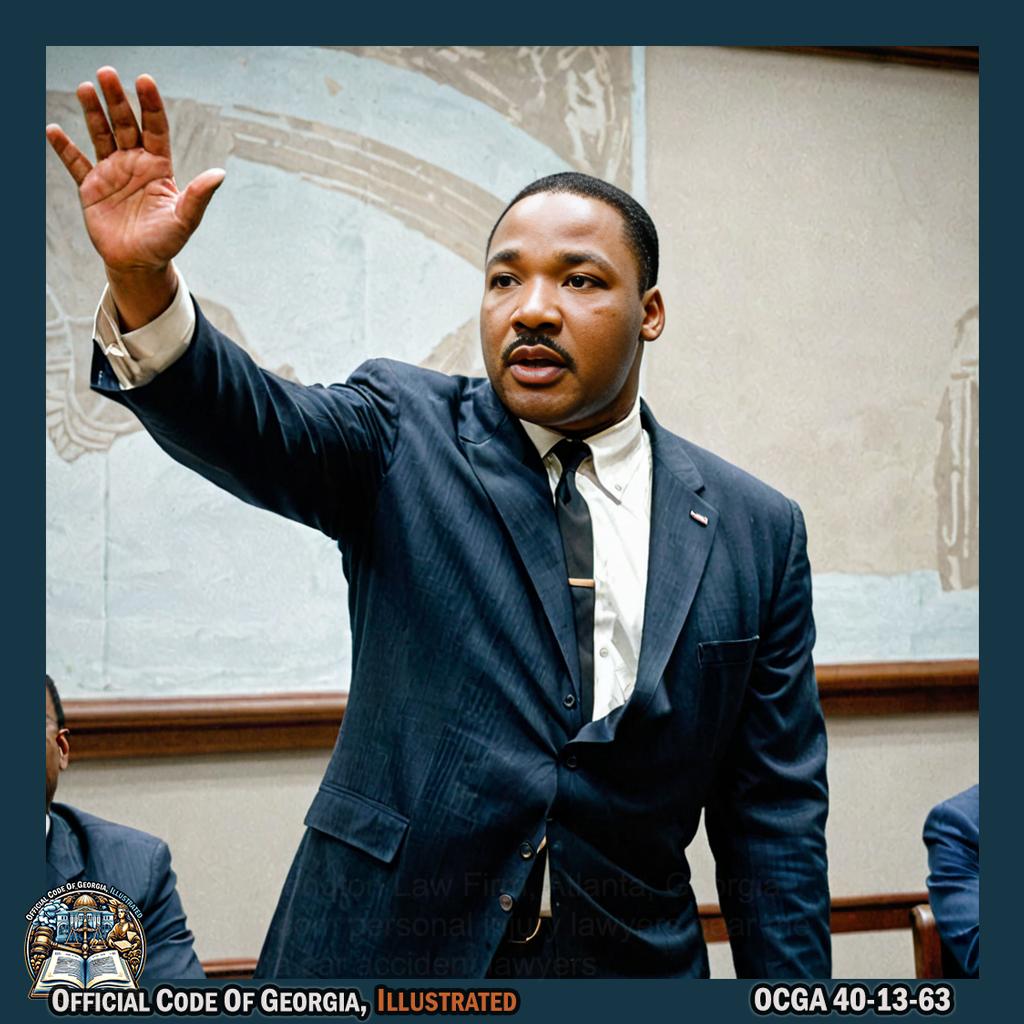
40-13-64.Suspended sentence division; collection of fines.¶
The court may provide that its traffic violations bureau, in addition to the duties set out in this article, shall have charge of what shall be called and designated in the court as the “Suspended Sentence Division of the _______________ Court.” This division of the court shall be responsible for collecting fines imposed upon persons convicted in the court, where the sentence is suspended upon the payment of a fine. The person or persons in the division shall be authorized, where the judge imposing the sentence stipulates the same therein, to permit such persons receiving suspended sentences, in addition to the other conditions imposed in the suspended sentence, to pay the suspended sentence fine in installments. The person or persons responsible for the administration of the suspended sentence division shall be responsible for collecting the suspended sentence fine by installments and shall also be responsible for the arrest of persons who fail in this respect to comply with the conditions of the suspended sentence.
CHAPTER 14 Use of Speed Detection Devices and Red Light Cameras¶
- Article 1 General Provisions
- Article 2 Speed Detection Devices
- Article 3 Red Light Cameras

Abner Jay stands at the center of St. Marys, gazing intensely at a red light camera as he vigorously paints its image on a large canvas, capturing every detail with raw emotion and bold strokes, embodying the essence of Lucian Freud's style in an art piece that evokes both contemplation and action.
Article 1 General Provisions {#t40c14a01}

40-14-1.Definitions.¶
As used in this chapter, the term:

-
“Campus” means the grounds owned or occupied by a college or university.

Mirabeau Lamar dramatically gestures towards the sprawling university grounds, surrounded by a captivating display of vintage Black-authored books at For Keeps Bookstore in Atlanta, Georgia. -
“Campus law enforcement agency” means the campus agency charged with the enforcement of the laws of this state.

James Neill, in a silent film style, mimics patrolling the campus with exaggerated tiptoe steps and humorous over-the-shoulder glances while holding an imaginary magnifying glass, near Bobby Jones' grave surrounded by golf balls; all captured in a long-exposure black-and-white photograph reminiscent of Hiroshi Sugimoto's seascapes, highlighting the timeless vigilance of campus law enforcement. -
“College or university” means an accredited public or private educational institution of higher learning.
- “Speed detection device” means, unless otherwise indicated, that particular device designed to measure the speed or velocity of a motor vehicle and marketed under the name “Vascar” or any similar device operating under the same or similar principle and any devices for the measurement of speed or velocity based upon the Doppler principle of radar or the speed timing principle of laser. All such devices must meet or exceed the minimum performance specifications established by the Department of Public Safety.
Article 2 Speed Detection Devices {#t40c14a02}

-
40-14-1.1. Definitions.

Killer Mike, standing in the lush Georgia setting of Gainesville, opens an imaginary large book, points to a word, scratches his head in confusion before having a lightbulb moment and excitedly jumps up with a finger raised as if he's just understood the definition. -
40-14-1.2. Agent not private investigator or subject to certain laws.
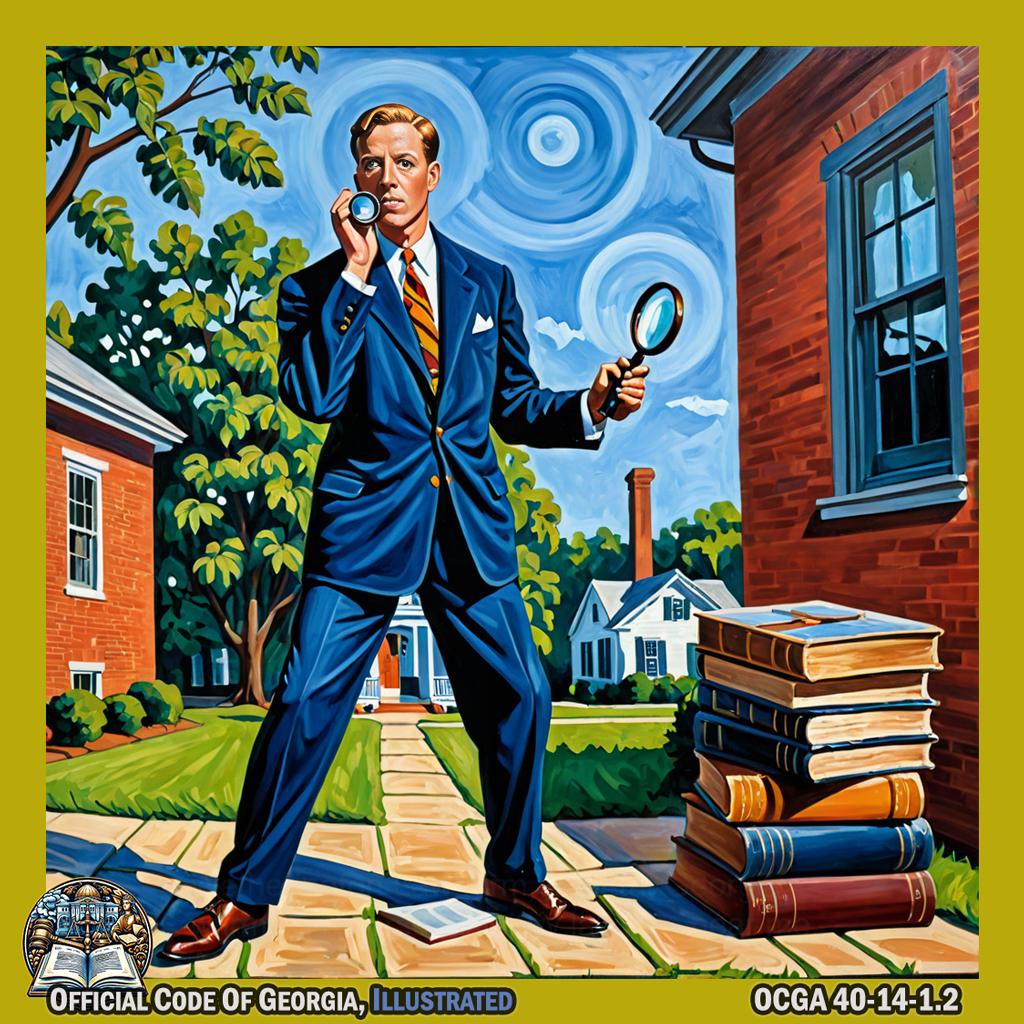
Singer John Berry, born in South Carolina, strikes a secret agent pose while holding a magnifying glass and tiptoeing past a stack of law books in the Colonial Homes neighborhood in Atlanta, Georgia. -@JohnBerryMusic - 40-14-3. Application for permit; use of device while application pending.
- 40-14-4. Compliance with rules of Federal Communications Commission; certification of devices.
- 40-14-5. Testing of radar devices; removal of inaccurate radar devices from service; maintenance of testing log and independent calibration tests of automated traffic enforcement devices.
- 40-14-6. Warning signs required; signage requirements.
- 40-14-7. Visibility of vehicle from which device is operated.
- 40-14-8. When case may be made and conviction had.
- 40-14-9. Certain evidence inadmissible; use of device on hill.
-
40-14-10. Unlawful use of devices generally.

Actor Ken Sagoes, in the style of an art piece by Ashley Bickerton, pretends to be a mad scientist using a giant magnet to disrupt electronic devices in a playful and exaggerated manner. -@KenSagoes - 40-14-12. Administrative hearing upon permit suspension or revocation.
- 40-14-13. Administrative and judicial appeal of decision suspending or revoking permit.
-
40-14-14. Petition for reconsideration following permit suspension or revocation.

Rapper Quando Rondo is seen holding a sign that says "Reconsider Permit" in front of a building with a suspended or revoked permit, set against the rich scene of Waycross, Georgia. -@quando_rondo -
40-14-15. Rehearing or restoration of permit at direction of Governor.
-
40-14-16. Restrictions on suspension or revocation of drivers’ licenses; reports to Department of Driver Services to specify speed.

Florida-born space shuttle pilot Eric A. Boe, depicted in the style of Karl Blossfeldt, performs an artful portrayal of driving a car with one hand on an imaginary steering wheel, the other hand holding a pretend license, and gesturing to slow down while pretending to look at a speed sign. -@Astro_Boe -
40-14-17. Laser devices; reliability and admissibility of evidence.
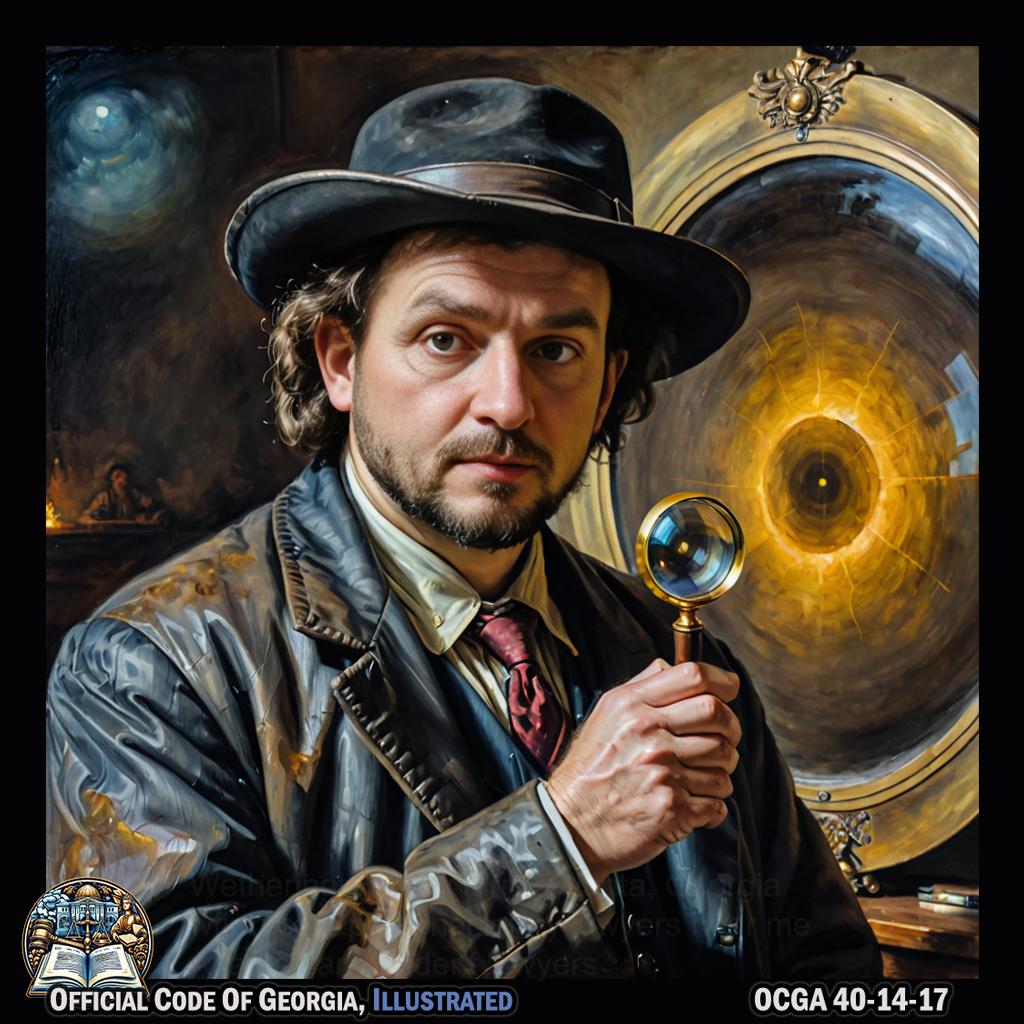
JID, dressed as a detective, intently examines a large magnifying glass and inspects a laser device for evidence in the atmospheric Quinlan Visual Arts Center in Georgia. -@JIDsv -
40-14-18. Enforcement of speed limit in school zones with recorded images; civil monetary penalty; vehicle registration and transfer of title restrictions for failure to pay penalty.

Ben Revere, a baseball player, stood in the picturesque Columbus, Georgia location, holding a toy car and pretending to take a picture with an imaginary camera before making a "stop" motion with his hand and putting a pretend ticket on the car. -@BenRevere9
40-14-1.1.Definitions.¶
As used in this article, the term:
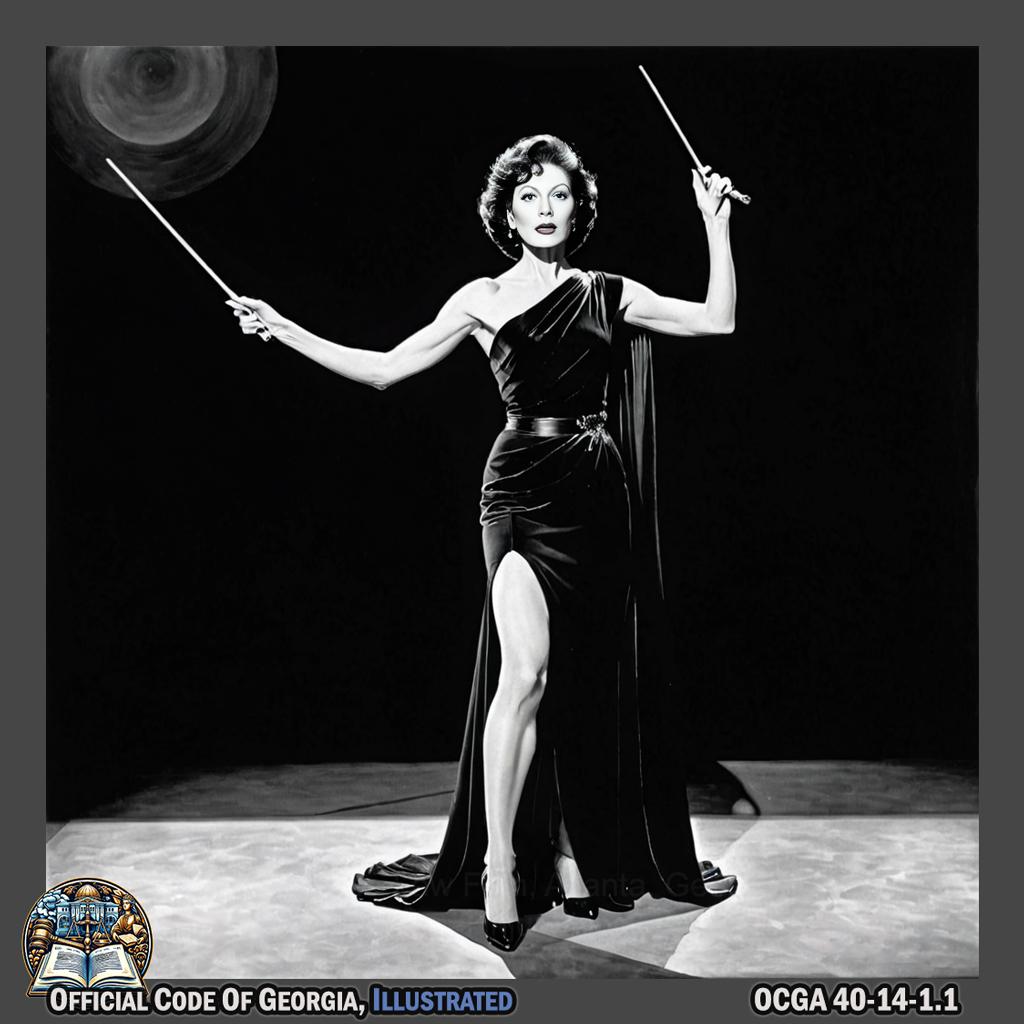
-
“Agent” means a person or entity who is authorized by a law enforcement agency or governing body to administer the procedures contained herein and:
- Provides services to such law enforcement agency or governing body;
- Operates, maintains, leases, or licenses an automated traffic enforcement safety device; or
- Is authorized by such law enforcement agency or governing body to review and assemble the recorded images captured by the automated traffic enforcement safety device for review by a peace officer.
-
“Automated traffic enforcement safety device” means a speed detection device that:
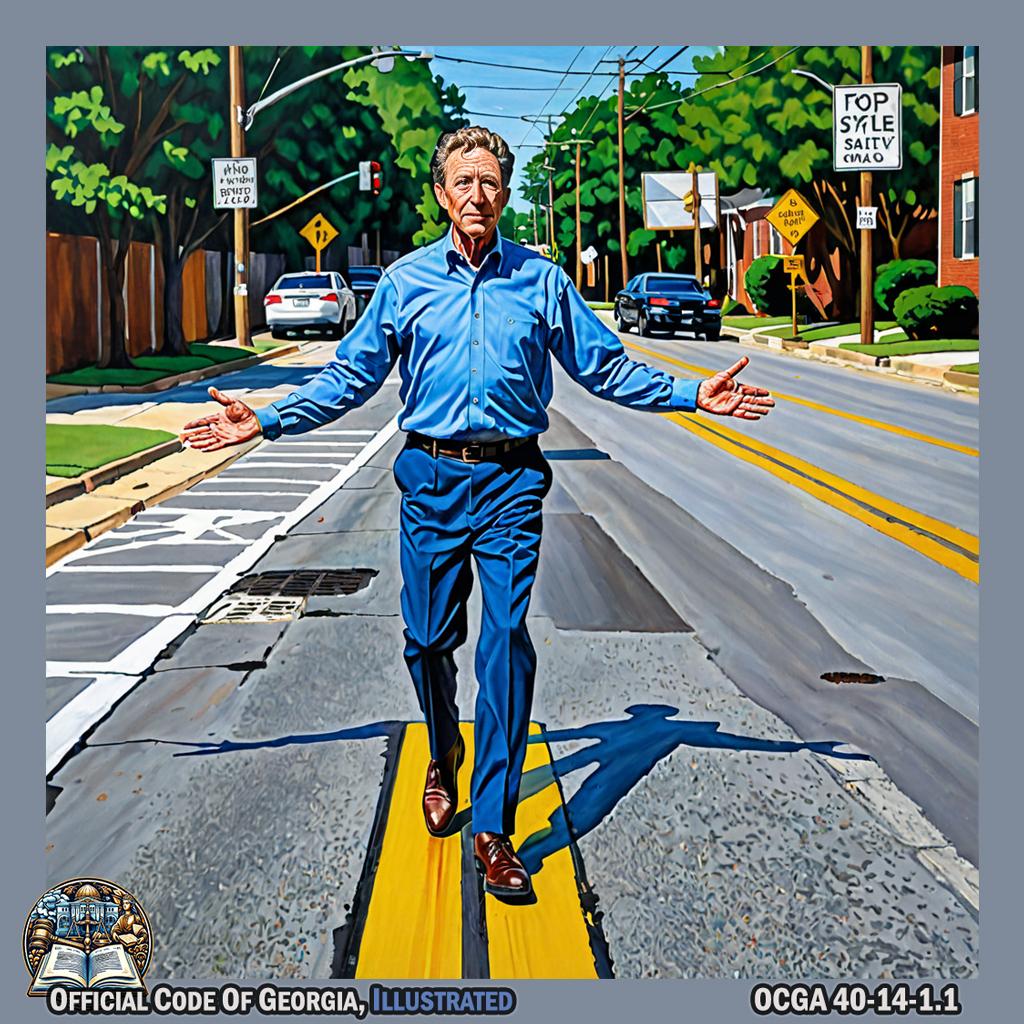
Randy McMichael, in the style of Alberto Giacometti, visually and physically represents an automated traffic enforcement safety device as he elongates his body dramatically to symbolize the speed detection function, with exaggerated arms and legs extending outward in a dynamic and engaging manner within a vibrant South Atlanta neighborhood setting. - Is capable of producing photographically recorded still or video images, or both, of the rear of a motor vehicle or of the rear of a motor vehicle being towed by another vehicle, including an image of such vehicle’s rear license plate;
- Is capable of monitoring the speed of a vehicle as photographically recorded pursuant to subparagraph (A) of this paragraph; and
- Indicates on each photographically recorded still or video image produced the date, time, location, and speed of a photographically recorded vehicle traveling at a speed above the posted speed limit within a marked school zone.
-
“Owner” means the registrant of a motor vehicle, except that such term shall not include a motor vehicle rental company when a motor vehicle registered by such company is being operated by another person under a rental agreement with such company.

Maria Louise Eve stands on a brightly colored stage, holding a motor vehicle registration document while gesturing to an imaginary rental car company and another person signing a rental agreement. She then gracefully pretends to hand over the keys to the car with dramatic flair and enthusiasm, all set against a backdrop of vibrant geometric shapes reminiscent of Robert Indiana's iconic style at CNN Center Studio Tour. -
“Recorded images” means still or video images recorded by an automated traffic enforcement safety device.
- “School zone” means the area within 1,000 feet of the boundary of any public or private elementary or secondary school.
40-14-1.2.Agent not private investigator or subject to certain laws.¶
Nothing in this article shall be construed to mean that an agent is providing or participating in private investigative services or acting in such manner as would render such agent subject to the provisions of Article 4 of Chapter 18 of Title 50.
40-14-2.Permit required for use; use not authorized where officers paid on fee system; operation by registered or certified peace officers.¶
- The law enforcement officers of the various counties, municipalities, colleges, and universities may use speed detection devices only if the sheriffs of such counties, or the governing authorities of such counties, or the governing authorities of such municipalities, or the president of such college or university shall approve of and desire the use of such devices and shall apply to the Department of Public Safety for a permit to use such devices in accordance with this chapter.
- No county sheriff, county or municipal governing authority, college, or university shall be authorized to use speed detection devices where any arresting officer or official of the court having jurisdiction of traffic cases is paid on a fee system. This subsection shall not apply to any official receiving a recording fee.
- A permit shall not be issued by the Department of Public Safety to an applicant under this Code section unless the applicant provides law enforcement services by certified peace officers 24 hours a day, seven days a week on call or on duty or allows only peace officers employed full time by the applicant to operate speed detection devices. Speed detection devices can only be operated by registered or certified peace officers of the county sheriff, county, municipality, college, or university to which the permit is applicable; provided, however, that an automated traffic enforcement safety device may be operated by an agent or registered or certified peace officers of the county sheriff, county, or municipality to which the permit is applicable. Persons operating the speed detection devices must be registered or certified by the Georgia Peace Officer Standards and Training Council as peace officers and certified by the Georgia Peace Officer Standards and Training Council as operators of speed detection devices; provided, however, that agents may operate automated traffic enforcement safety devices without such registrations or certifications.
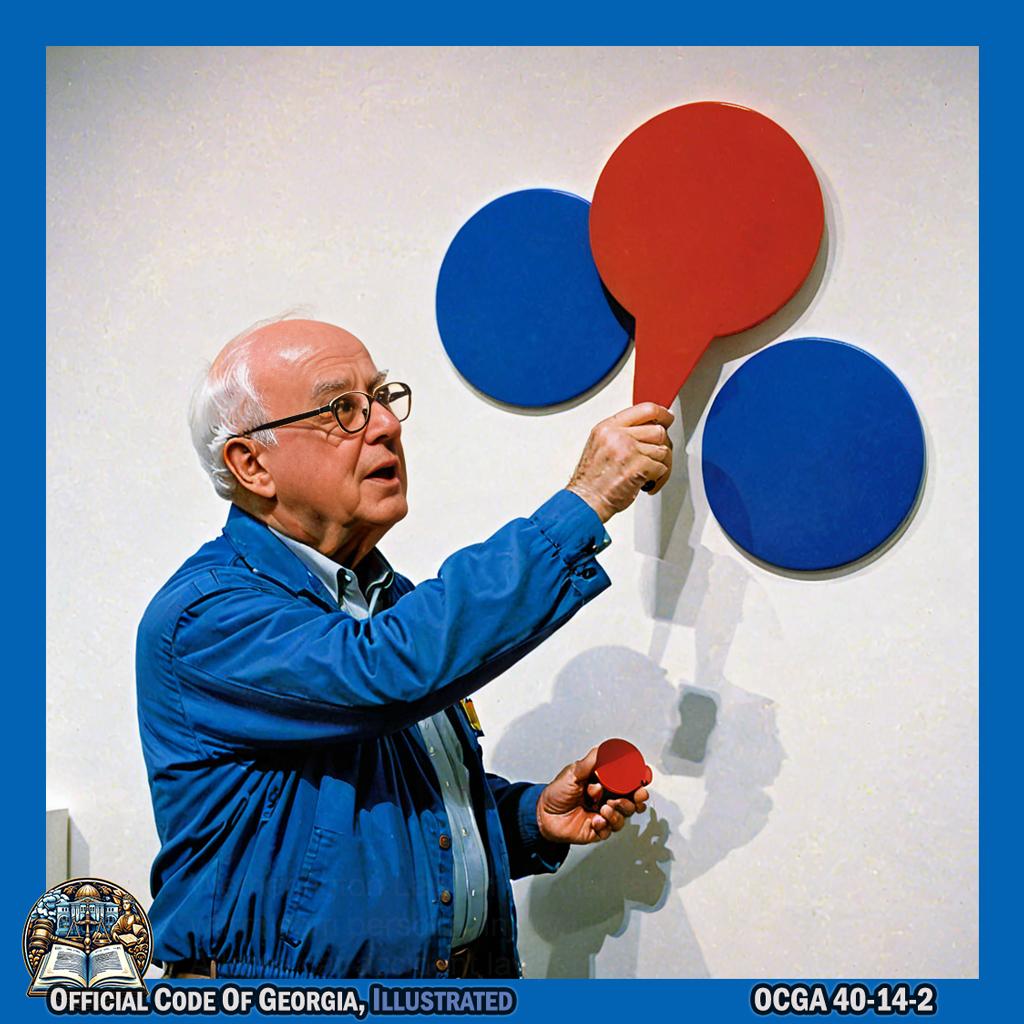
Philosopher Robert Arrington points a toy speed detection device while making a "beep beep" sound, as if holding a badge, in an art piece reminiscent of Ellsworth Kelly's style.
40-14-3.Application for permit; use of device while application pending.¶
- A county sheriff, county or municipal governing authority, or the president of a college or university may apply to the Department of Public Safety for a permit to authorize the use of speed detection devices for purposes of traffic control within such counties, municipalities, colleges, or universities on streets, roads, and highways, provided that such application shall name the street or road on which the device is to be used and the speed limits on such street or road shall have been approved by the Office of Traffic Operations of the Department of Transportation. Law enforcement agencies are authorized to use speed detection devices on streets and roads for which an application is pending as long as all other requirements for the use of speed detection devices are met. Nothing in this subsection shall be construed to affect the provisions of Code Section 40-14-9.
- The Department of Public Safety is authorized to prescribe by appropriate rules and regulations the manner and procedure in which applications shall be made for such permits and to prescribe the required information to be submitted by the applicants. The Department of Public Safety may deny the application or suspend the speed detection device permit for failure to provide information or documentation at the department’s request.
40-14-4.Compliance with rules of Federal Communications Commission; certification of devices.¶
No state, county, municipal, or campus law enforcement agency may use speed detection devices unless the agency possesses a license in compliance with Federal Communications Commission rules, and unless each device, before being placed in service and annually after being placed in service, is certified for compliance by a technician possessing a certification as required by the Department of Public Safety.
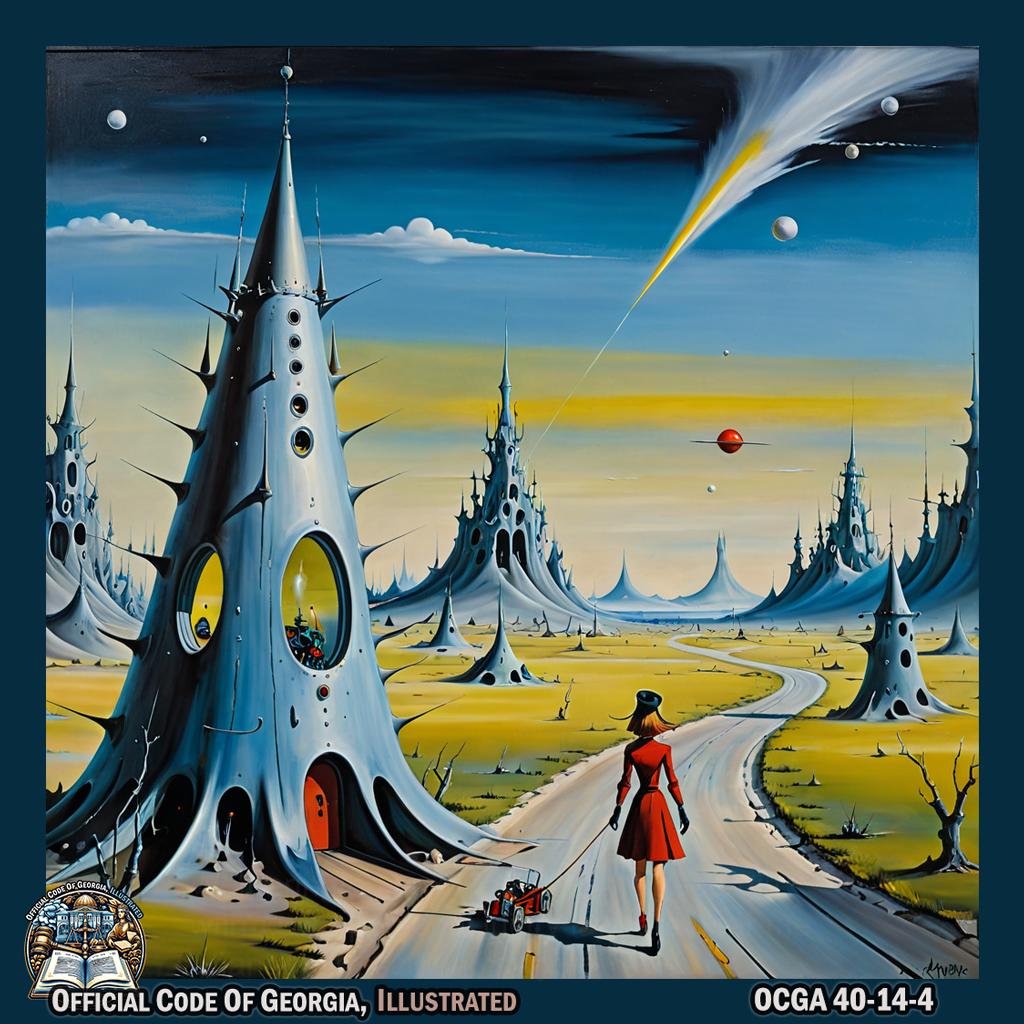
40-14-5.Testing of radar devices; removal of inaccurate radar devices from service; maintenance of testing log and independent calibration tests of automated traffic enforcement devices.¶
-
Each state, county, municipal, or campus law enforcement officer using a radar device, except for an automated traffic enforcement safety device as provided for under Code Section 40-14-18, shall test the device for accuracy and record and maintain the results of the test at the beginning and end of each duty tour. Each such test shall be made in accordance with the manufacturer’s recommended procedure. Any radar unit not meeting the manufacturer’s minimum accuracy requirements shall be removed from service and thereafter shall not be used by the state, county, municipal, or campus law enforcement agency until it has been serviced, calibrated, and recertified by a technician with the qualifications specified in Code Section 40-14-4.
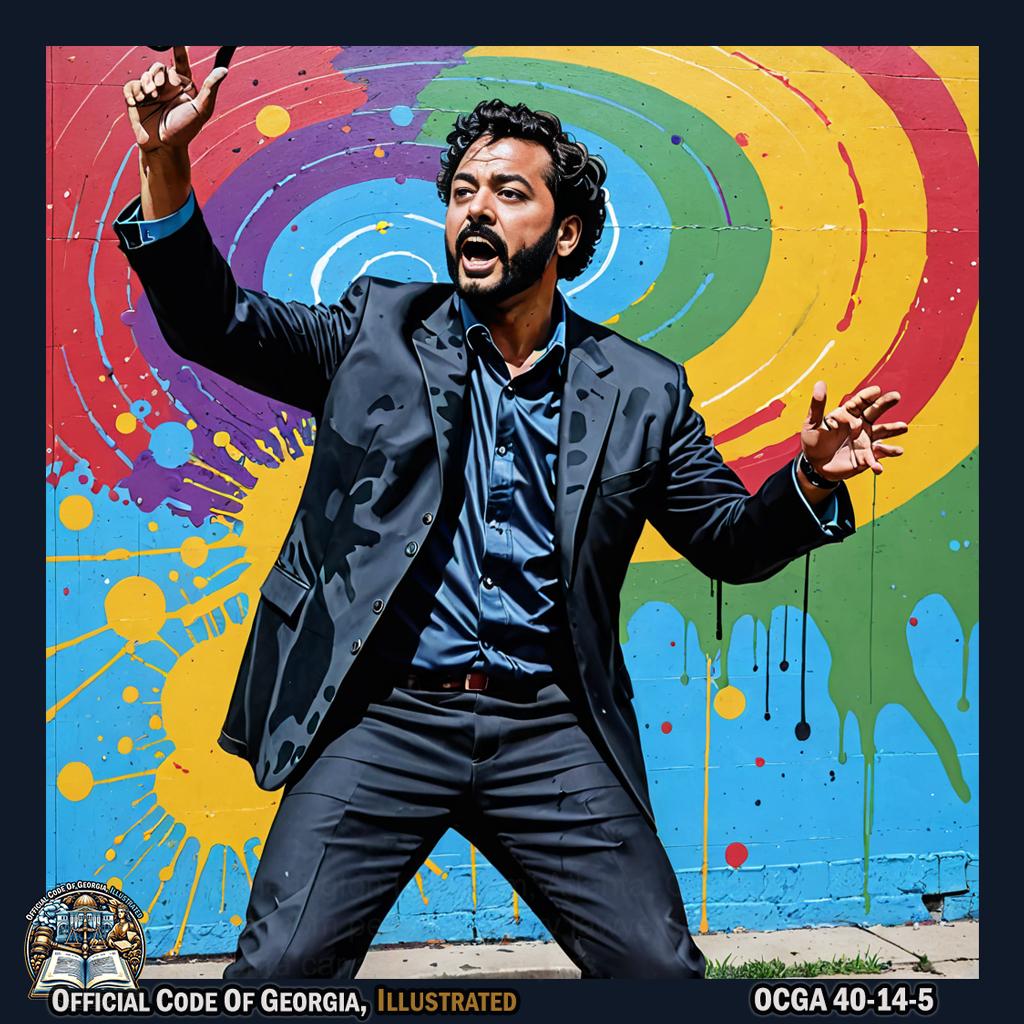
In a vibrant mural in Dalton, actor Douglass Watson dramatically gestures as if testing a radar device, surrounded by swirling colors and abstract shapes reminiscent of Blek Le Rat's signature style. -
Each county, municipal, or campus law enforcement officer using a radar device, except for an automated traffic enforcement safety device as provided for under Code Section 40-14-18, shall notify each person against whom the officer intends to make a case based on the use of the radar device that the person has a right to request the officer to test the radar device for accuracy. The notice shall be given prior to the time a citation and complaint or ticket is issued against the person and, if requested to make a test, the officer shall test the radar device for accuracy. In the event the radar device does not meet the minimum accuracy requirements, the citation and complaint or ticket shall not be issued against the person, and the radar device shall be removed from service and thereafter shall not be used by the county, municipal, or campus law enforcement agency until it has been serviced, calibrated, and recertified by a technician with the qualifications specified in Code Section 40-14-4.
-
- The law enforcement agency, or agent on behalf of the law enforcement agency, operating an automated traffic enforcement safety device provided for under Code Section 40-14-18 shall maintain a log for the automated traffic enforcement safety device attesting to the performance of such device’s self-test at least once every 30 days and the results of such self-test pertaining to the accuracy of the automated traffic enforcement safety device. Such log shall be admissible in any court proceeding for a violation issued pursuant to Code Section 40-14-18.
- The law enforcement agency, or agent on behalf of the law enforcement agency, operating an automated traffic enforcement safety device shall perform an independent calibration test on the automated traffic enforcement safety device at least once every 12 months. The results of such calibration test shall be admissible in any court proceeding for a violation issued pursuant to Code Section 40-14-18.
40-14-6.Warning signs required; signage requirements.¶
- Each county, municipality, college, and university using speed detection devices shall erect signs on every highway which comprises a part of the state highway system at that point on the highway which intersects the corporate limits of the municipality, the county boundary, or the boundary of the college or university campus. Such signs shall be at least 24 by 30 inches in area and shall warn approaching motorists that speed detection devices are being employed. No such devices shall be used within 500 feet of any such warning sign erected pursuant to this subsection.
- In addition to the signs required under subsection (a) of this Code section, each county, municipality, college, and university using speed detection devices shall erect speed limit warning signs on every highway which comprises a part of the state highway system at that point on the highway which intersects the corporate limits of the municipality, the county boundary, or the boundary of the college or university campus. Such signs shall be at least 24 by 30 inches in area, shall warn approaching motorists of changes in the speed limit, shall be visible plainly from every lane of traffic, shall be viewable in any traffic conditions, and shall not be placed in such a manner that the view of such sign is subject to being obstructed by any other vehicle on such highway. No such devices shall be used within 500 feet of any such warning sign erected pursuant to this subsection.
- In addition to the signs required under subsections (a) and (b) of this Code section, each law enforcement agency using an automated traffic enforcement safety device as provided for in Code Section 40-14-18 shall erect signs warning of the use of a stationary speed detection device within the approaching school zone. Such signs shall be at least 24 by 30 inches in area, shall be visible plainly from every lane of traffic, shall be viewable in all traffic conditions, and shall not be placed in such a manner that the view of such sign is subject to being obstructed by any other vehicle on such highway. Such signs shall be placed within 500 feet prior to the warning sign announcing the reduction of the speed limit for the school speed zone. There shall be a rebuttable presumption that such signs are properly installed pursuant to this subsection at the time of any alleged violation under this article.
40-14-7.Visibility of vehicle from which device is operated.¶
Except as provided for in Code Section 40-14-18, no stationary speed detection device shall be employed by county, municipal, college, or university law enforcement officers where the vehicle from which the device is operated is obstructed from the view of approaching motorists or is otherwise not visible for a distance of at least 500 feet.

40-14-8.When case may be made and conviction had.¶
- No county, city, or campus officer shall be allowed to make a case based on the use of any speed detection device, unless the speed of the vehicle exceeds the posted speed limit by more than ten miles per hour and no conviction shall be had thereon unless such speed is more than ten miles per hour above the posted speed limit.
- The limitations contained in subsection (a) of this Code section shall not apply in properly marked school zones one hour before, during, and one hour after the normal hours of school operation or programs for care and supervision of students before school, after school, or during vacation periods as provided for under Code Section 20-2-65, in properly marked historic districts, and in properly marked residential zones. For purposes of this chapter, thoroughfares with speed limits of 35 miles per hour or more shall not be considered residential districts. For purposes of this Code section, the term “historic district” means a historic district as defined in paragraph (5) of Code Section 44-10-22 and which is listed on the Georgia Register of Historic Places or as defined by ordinance adopted pursuant to a local constitutional amendment.
40-14-9.Certain evidence inadmissible; use of device on hill.¶
Evidence obtained by county or municipal law enforcement officers in using speed detection devices within 300 feet of a reduction of a speed limit inside an incorporated municipality or within 600 feet of a reduction of a speed limit outside an incorporated municipality or consolidated city-county government shall be inadmissible in the prosecution of a violation of any municipal ordinance, county ordinance, or state law regulating speed; nor shall such evidence be admissible in the prosecution of a violation as aforesaid when such violation has occurred within 30 days following a reduction of the speed limit in the area where the violation took place, except that this 30 day limitation shall not apply to a speeding violation within a highway work zone, as defined in Code Section 40-6-188, or in an area with variable speed limits, as defined in Code Section 40-6-182. No speed detection device shall be employed by county, municipal, or campus law enforcement officers on any portion of any highway which has a grade in excess of 7 percent.

40-14-10.Unlawful use of devices generally.¶
It shall be unlawful for speed detection devices to be used in any county or municipality or on any campus for which a permit authorizing such use has not been issued or for which a permit authorizing such use has been suspended or revoked and not reissued. It shall be unlawful for any official of such county, municipality, college, or university to order such speed detection devices to be used. It shall be unlawful for any law enforcement officer of any such county, municipality, college, or university to use any such speed detection devices. Any such official or law enforcement officer violating this Code section shall be guilty of a misdemeanor.
40-14-11.Investigations by commissioner of public safety; issuance of order suspending or revoking permit; ratio of speeding fines to agency’s budget.¶
-
Upon a complaint being made to the commissioner of public safety that any county, municipality, college, or university is employing speed detection devices for purposes other than the promotion of the public health, welfare, and safety or in a manner which violates this chapter or violates its speed detection device permit, the commissioner or the commissioner’s designee is authorized and empowered to conduct an investigation into the acts and practices of such county, municipality, college, or university with respect to speed detection devices. If, as a result of this investigation, the commissioner or the commissioner’s designee finds that there is probable cause to suspend or revoke the speed detection device permit of such county, municipality, college, or university, he or she shall issue an order to that effect.
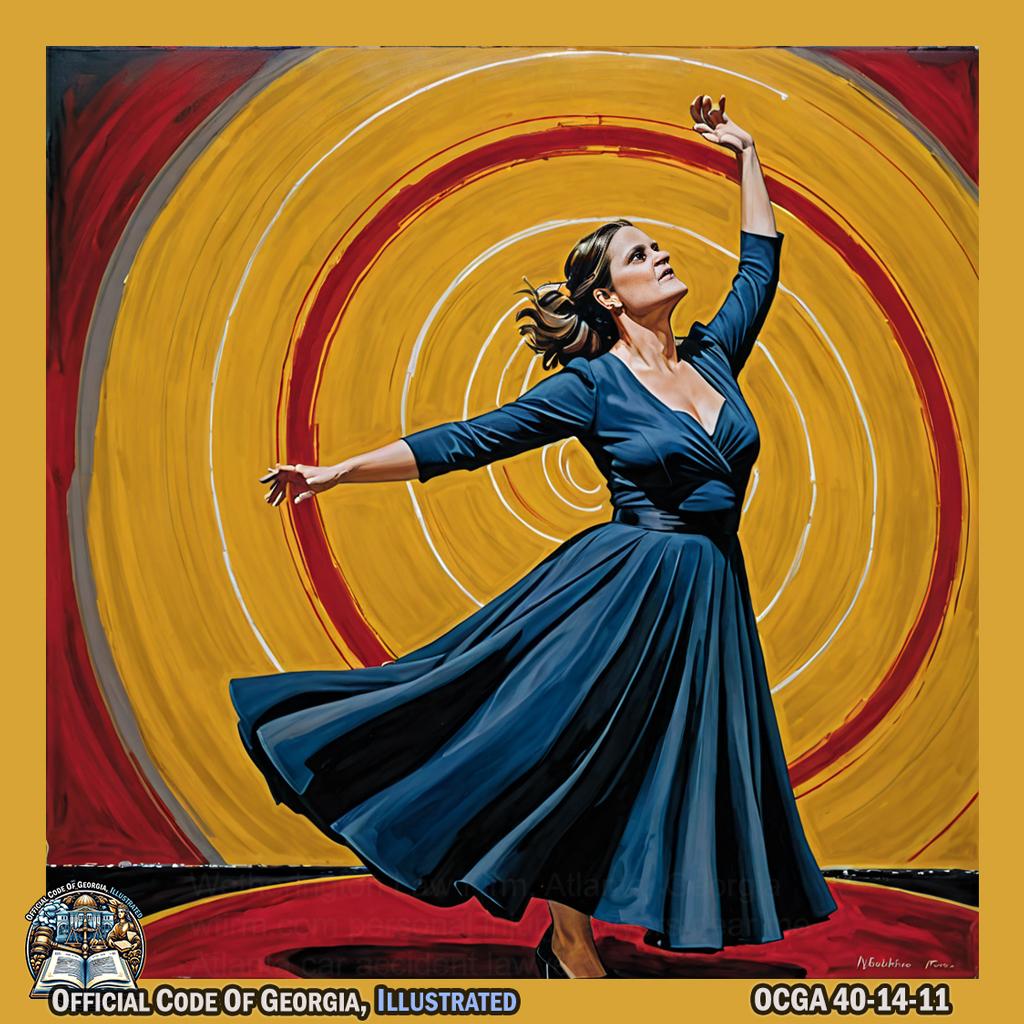
Madeleine Peyroux elegantly twirls and spins, embodying the power of investigation as she gracefully conducts a symphony with her movements, symbolizing the process of uncovering and addressing misuse of speed detection devices in a captivating art piece set against the backdrop of Columbus. -@mpeyrouxmusic -
Upon the suspension or revocation of any speed detection device permit for the reasons set forth in this Code section, the commissioner of public safety shall notify the executive director of the Georgia Peace Officer Standards and Training Council of the action taken.
- Upon receipt from the executive director of the Georgia Peace Officer Standards and Training Council that an officer’s certification to operate speed detection devices has been withdrawn or suspended pursuant to Code Section 35-8-12, the commissioner of public safety or the commissioner’s designee shall suspend the speed detection device permit for the employing agency. The period of suspension or revocation shall be consistent with the action taken by the Georgia Peace Officer Standards and Training Council.
- There shall be a rebuttable presumption that a law enforcement agency is employing speed detection devices for purposes other than the promotion of the public health, welfare, and safety if the fines levied based on the use of speed detection devices for speeding offenses are equal to or greater than 35 percent of a municipal or county law enforcement agency’s budget. For purposes of this Code section, fines collected for citations issued for violations of Code Section 40-6-180 shall be included when calculating total speeding fine revenue for the agency; provided, however, that fines for speeding violations exceeding 20 miles per hour over the established speed limit and civil monetary penalties for speeding violations issued pursuant to Code Section 40-14-18 shall not be considered when calculating total speeding fine revenue for the agency.
40-14-12.Administrative hearing upon permit suspension or revocation.¶
Upon issuance by the commissioner of public safety of an order suspending or revoking the speed detection device permit of any county, municipality, college, or university, the county, municipality, college, or university affected shall be afforded a hearing, to be held within ten days of the effective date of the order. The hearing shall be held before the commissioner or deputy commissioner of public safety, and, following the hearing, the county, municipality, college, or university affected shall be served with a written decision announcing whether the permit shall remain revoked or whether it shall be reinstated.
40-14-13.Administrative and judicial appeal of decision suspending or revoking permit.¶
Any county, municipality, college, or university aggrieved by a decision of the commissioner or deputy commissioner of public safety suspending or revoking its speed detection device permit may appeal that decision within 30 days of its effective date to the Board of Public Safety, which shall schedule a hearing with respect thereto before the board. Following a hearing before the board, the county, municipality, college, or university affected shall be served with a written decision announcing whether the permit shall remain revoked or whether it shall be reinstated. An adverse decision of the board may be appealed by the county, municipality, college, or university to the superior court with appropriate jurisdiction, but the municipality, county, college, or university shall be denied the use of the speed detection device until after such appeal is decided by the court.

40-14-14.Petition for reconsideration following permit suspension or revocation.¶
At the expiration of six months following the suspension or revocation of a speed detection device permit by the Board of Public Safety or, if no appeal was taken, by the commissioner or deputy commissioner of public safety, the governing authority of any such county or municipality or the president of any such college or university may, upon a change of circumstances being shown to the commissioner, petition the commissioner for a reconsideration of whether such county, municipality, college, or university should be permitted to use speed detection devices within their respective jurisdictions.
40-14-15.Rehearing or restoration of permit at direction of Governor.¶
The Governor, in his discretion, may direct the commissioner of public safety, or his delegate, to inquire into such change of circumstances and report the same to him together with any recommendations he might have. The Governor, in his discretion, may order a new hearing on the matter before the Board of Public Safety or may, without hearing, issue his order directing the commissioner to grant a permit to such a county, municipality, college, or university to use speed detection devices. If a county, municipality, college, or university shall not be granted a permit to use such devices, it shall not apply for a rehearing until the expiration of six months.

40-14-16.Restrictions on suspension or revocation of drivers’ licenses; reports to Department of Driver Services to specify speed.¶
No speeding violation of less than ten miles per hour above the legal speed limit in the county or municipality or on a college or university campus in which a person is given a speeding ticket shall be used by the Department of Driver Services for the purpose of suspending or revoking the driver’s license of the violator. No speeding violation report by a county, municipality, or college or university campus to the Department of Driver Services which fails to specify the speed of the violator shall be used by the Department of Driver Services to revoke the driver’s license of a violator.

40-14-17.Laser devices; reliability and admissibility of evidence.¶
Evidence of speed based on a speed detection device using the speed timing principle of laser which is of a model that has been approved by the Department of Public Safety shall be considered scientifically acceptable and reliable as a speed detection device and shall be admissible for all purposes in any court, judicial, or administrative proceedings in this state. A certified copy of the Department of Public Safety list of approved models of such laser devices shall be self-authenticating and shall be admissible for all purposes in any court, judicial, or administrative proceedings in this state.
40-14-18.Enforcement of speed limit in school zones with recorded images; civil monetary penalty; vehicle registration and transfer of title restrictions for failure to pay penalty.¶
-
-
The speed limit within any school zone as provided for in Code Section 40-14-8 and marked pursuant to Code Section 40-14-6 may be enforced by using photographically recorded images for violations which occurred only on a school day during the time in which instructional classes are taking place and one hour before such classes are scheduled to begin and for one hour after such classes have concluded when such violations are in excess of ten miles per hour over the speed limit.
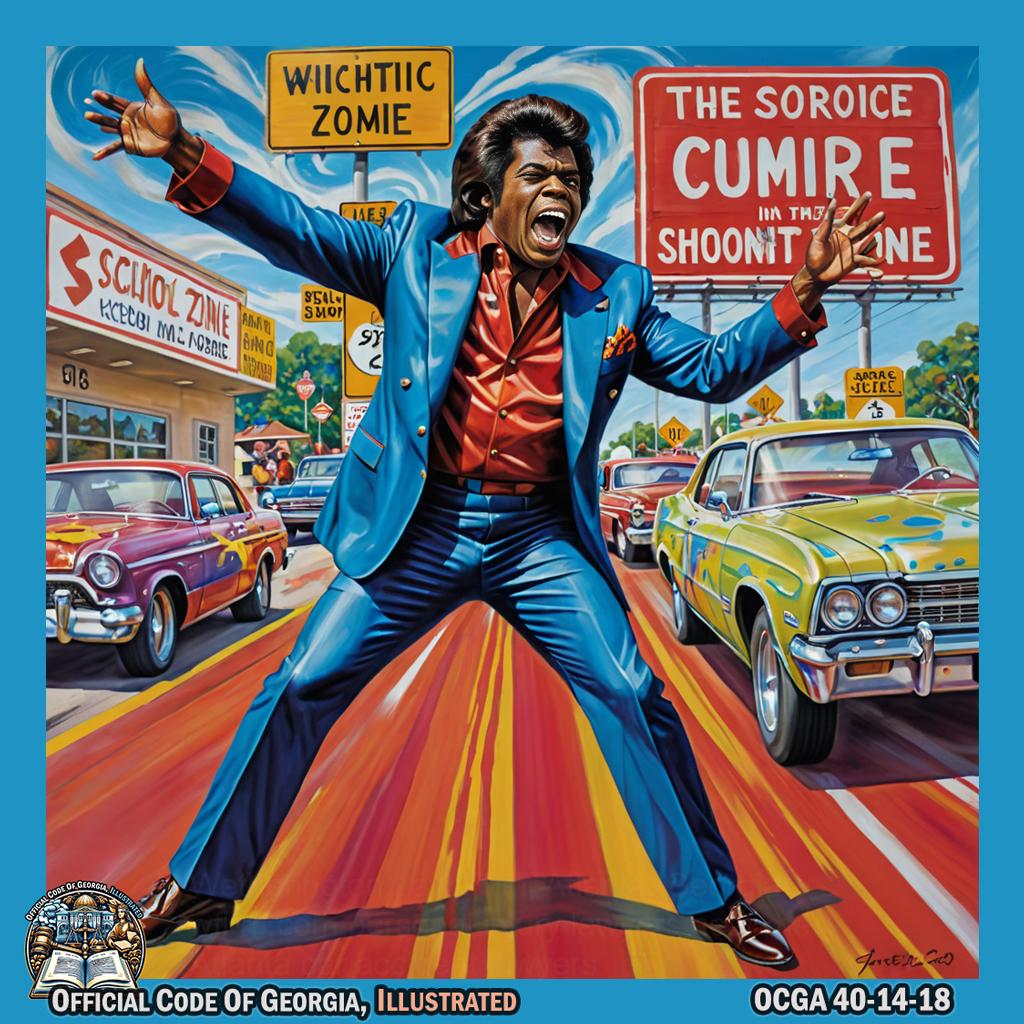
James Brown, dressed in vibrant colors and moving with rhythmic energy, gestures wildly at a large hourglass while surrounded by swirling images of speeding cars and school zone signs, all set against a backdrop of vividly painted pottery. -
Prior to the placement of a device within a school zone, each school within whose school zone such automated traffic enforcement safety device is to be placed shall first apply for and secure a permit from the Department of Transportation for the use of such automated traffic enforcement safety device. Such permit shall be awarded based upon need. The Department of Transportation shall promulgate rules and regulations for the implementation of this paragraph.
-
-
For the purpose of enforcement pursuant to this Code section:

Thomas Davis, in a poised stance, holds up an open book towards the audience while pointing to a symbolic representation of the "Code section," such as a gavel or scales of justice, against the backdrop of Valdosta's historic courthouse, captured with Mapplethorpe's dramatic lighting and composition. -@ThomasDavisSDTM -
The owner of a motor vehicle shall be liable for a civil monetary penalty to the governing body of the law enforcement agency provided for in paragraph (2) of this subsection if such vehicle is found, as evidenced by photographically recorded images, to have been operated in disregard or disobedience of the speed limit within any school zone and such disregard or disobedience was not otherwise authorized by law. The amount of such civil monetary penalty shall be $75.00 for a first violation and $125.00 for a second or any subsequent violation, in addition to fees associated with the electronic processing of such civil monetary penalty which shall not exceed $25.00; provided, however, that for a period of 30 days after the first automated traffic enforcement safety device is introduced by a law enforcement agency within a school zone, the driver of a motor vehicle shall not be liable for a civil monetary penalty but shall be issued a civil warning for disregard or disobedience of the speed limit within the school zone;
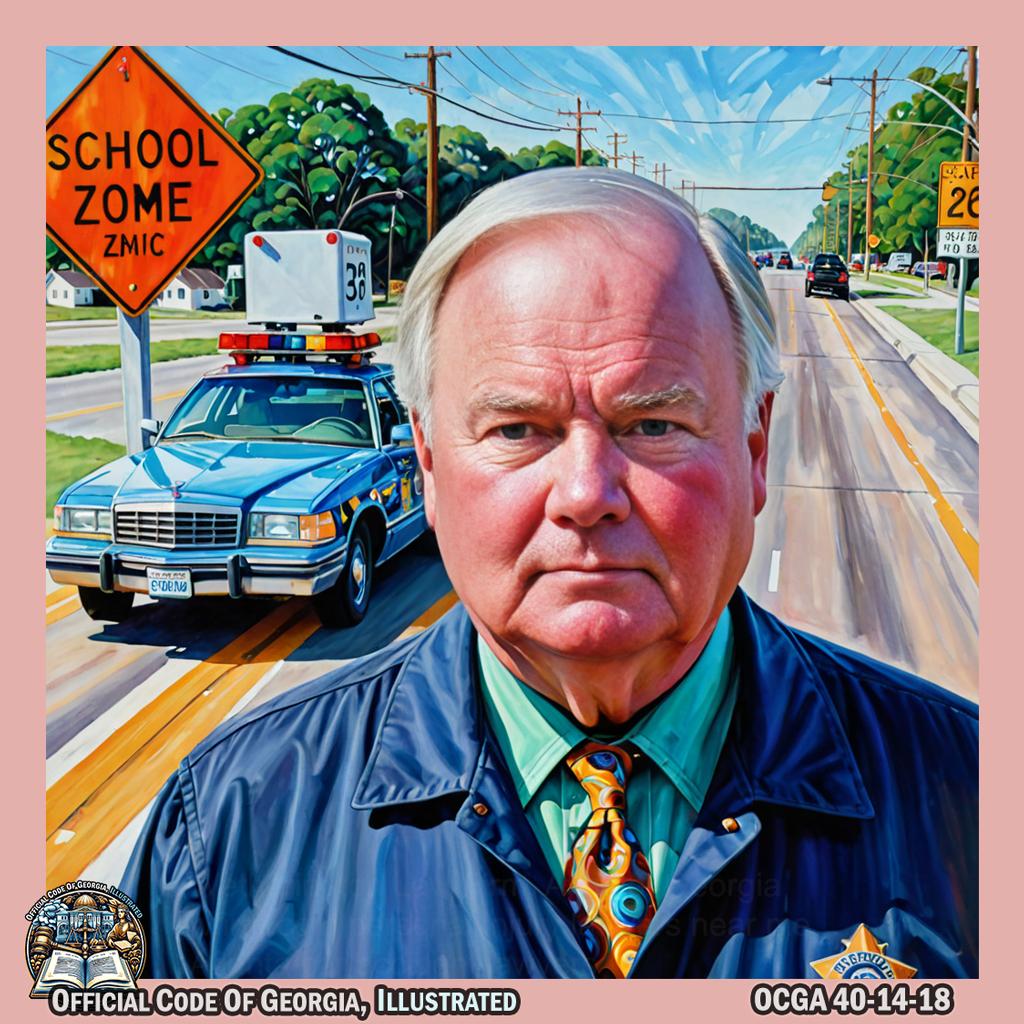
Pat Conroy standing in a school zone, driving over the speed limit with a serious expression as he's caught on camera by an automated traffic enforcement safety device, surrounded by vibrant colors and intricate patterns reminiscent of Georgia O'Keeffe's style. -
A law enforcement agency authorized to enforce the speed limit of a school zone, or an agent working on behalf of a law enforcement agency or governing body, shall send by first class mail addressed to the owner of the motor vehicle within 30 days after obtaining the name and address of the owner of the motor vehicle but no later than 60 days after the date of the alleged violation:
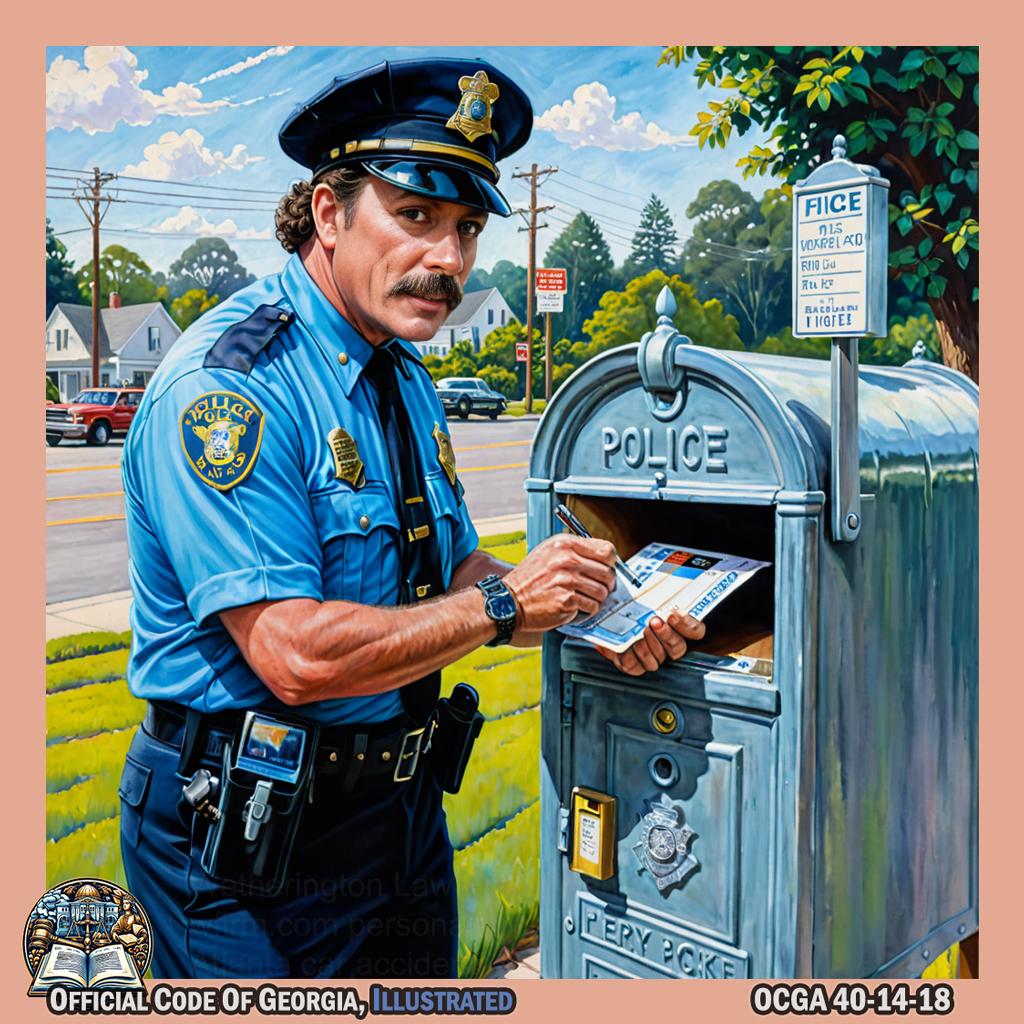
Singer John Michael "Mickey" Thomas embodies the role of a police officer writing a fictitious ticket and depositing it into an ethereal mailbox, creating a scene reminiscent of David Herbert's artwork. -@Mickey_Thomas - A citation for the alleged violation, which shall include the date and time of the violation, the location of the infraction, the maximum speed at which such motor vehicle was traveling in photographically recorded images, the maximum speed applicable within such school zone, the civil warning or the amount of the civil monetary penalty imposed, and the date by which a civil monetary penalty shall be paid;
- An image taken from the photographically recorded images showing the vehicle involved in the infraction;
-
A website address where photographically recorded images showing the vehicle involved in the infraction and a duplicate of the information provided for in this paragraph may be viewed;

Actress Noureen DeWulf performs the action of looking through a pretend camera and pointing to a pretend website address while making a clicking sound, in an art piece reminiscent of John Ery Coleman's work. -@noureendewulf -
A copy of a certificate sworn to or affirmed by a certified peace officer employed by a law enforcement agency authorized to enforce the speed limit of the school zone and stating that, based upon inspection of photographically recorded images, the owner’s motor vehicle was operated in disregard or disobedience of the speed limit in the marked school zone and that such disregard or disobedience was not otherwise authorized by law;
- A statement of the inference provided by paragraph (4) of this subsection and of the means specified therein by which such inference may be rebutted;
-
Information advising the owner of the motor vehicle of the manner in which liability as alleged in the citation may be contested through an administrative hearing; and
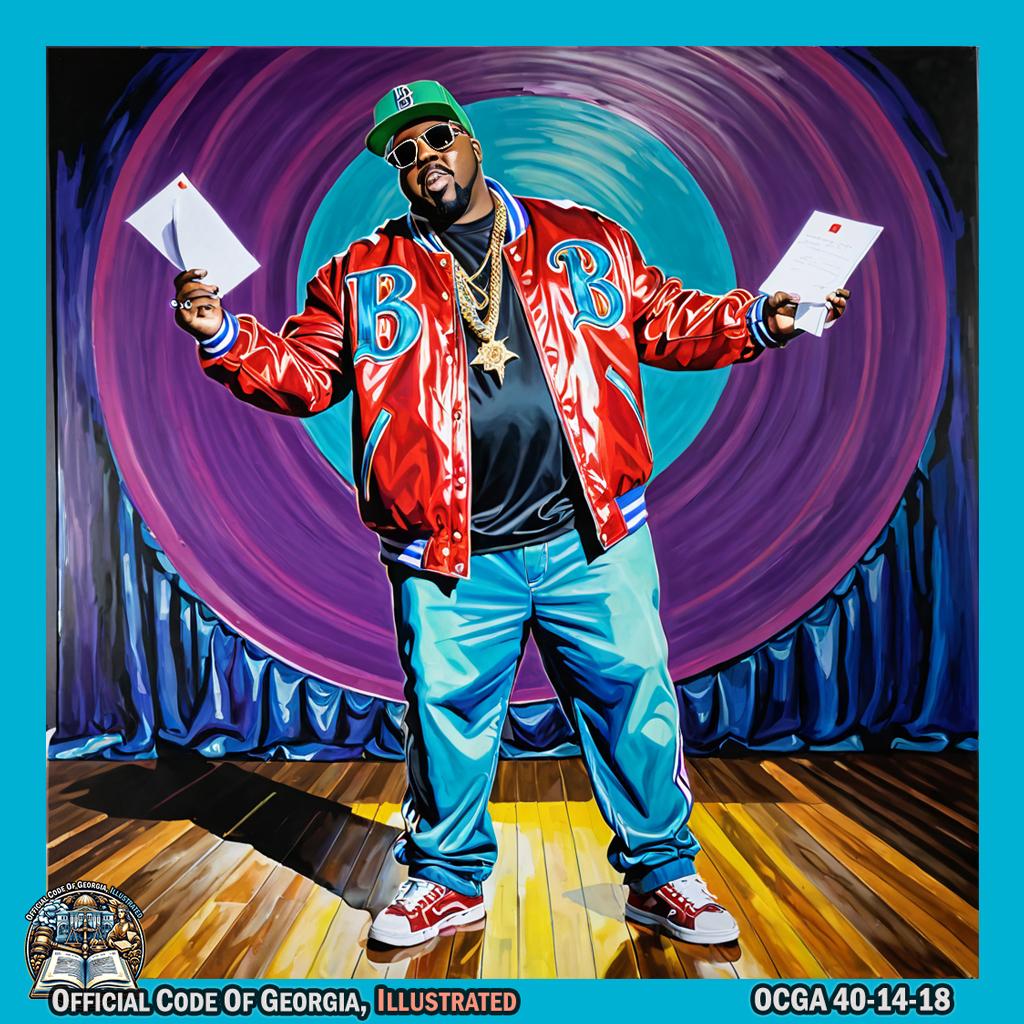
Big Boi stands on a vibrant stage in Villa Rica, gracefully miming the act of receiving a letter and reading it with exaggerated curiosity, all while embodying the dynamic style of Brian Robinson's art. -@BigBoi -
A warning that failure to pay the civil monetary penalty or to contest liability in a timely manner as provided for in subsection (d) of this Code section shall waive any right to contest liability;
- Proof that a motor vehicle was operated in disregard or disobedience of the speed limit of the marked school zone shall be evidenced by photographically recorded images. A copy of a certificate sworn to or affirmed by a certified peace officer employed by a law enforcement agency and stating that, based upon inspection of photographically recorded images, a motor vehicle was operated in disregard or disobedience of the speed limit in the marked school zone and that such disregard or disobedience was not otherwise authorized by law shall be prima-facie evidence of the facts contained therein; and
- Liability under this Code section shall be determined based upon a preponderance of the evidence. Prima-facie evidence that the vehicle described in the citation issued pursuant to this Code section was operated in violation of the speed limit of the school zone, together with proof that the defendant was, at the time of such violation, the registered owner of the vehicle, shall permit the trier of fact in its discretion to infer that such owner of the vehicle was the driver of the vehicle at the time of the alleged violation. Such an inference may be rebutted if the owner of the vehicle:
- Testifies under oath in open court or submits to the court a sworn notarized statement that he or she was not the operator of the vehicle at the time of the alleged violation;
- Presents to the court a certified copy of a police report showing that the vehicle had been reported to the police as stolen prior to the time of the alleged violation.
-
-
A violation for which a civil warning or a civil monetary penalty is imposed pursuant to this Code section shall not be considered a moving traffic violation for the purpose of points assessment under Code Section 40-5-57. Such violation shall be deemed noncriminal, and imposition of a civil warning or civil monetary penalty pursuant to this Code section shall not be deemed a conviction and shall not be made a part of the operating record of the person upon whom such liability is imposed, nor shall it be used for any insurance purposes in the provision of motor vehicle insurance coverage.
- If a person issued and mailed a citation pursuant to subsection (b) of this Code section fails to pay the civil monetary penalty for the violation or has not filed a police report or notarized statement pursuant to paragraph (4) of subsection (b) of this Code section in no less than 30 nor more than 60 days after such mailing as determined and noticed by the law enforcement agency, the agent or law enforcement agency shall send to such person by first class mail a second notice of any unpaid civil monetary penalty, except in cases where there is an adjudication that no violation occurred or there is otherwise a lawful determination that no civil monetary penalty shall be imposed. The second notice shall include all information required in paragraph (2) of subsection (b) of this Code section and shall include a new date of return which shall be no less than 30 days after such mailing as determined and noticed by the law enforcement agency. If such person notified by second notice again fails to pay the civil monetary penalty or file a police report or notarized statement pursuant to paragraph (4) of subsection (b) of this Code section by the new date of return, such person shall have waived the right to contest the violation and shall be liable for the civil monetary penalty provided for under this Code section, except in cases where there is an adjudication that no violation occurred or there is otherwise a lawful determination that no civil monetary penalty shall be imposed.
- Notices mailed by first class mail pursuant to this Code section shall be adequate notification of the fees and penalties imposed by this Code section. No other notice shall be required for the purposes of this Code section.
- Any court having jurisdiction over violations of subsection (a) of this Code section shall have jurisdiction over cases arising under this subsection and shall be authorized to impose the civil monetary penalty provided by this subsection. Except as otherwise provided in this subsection, the provisions of law governing jurisdiction, procedure, defenses, adjudication, appeal, and payment and distribution of penalties otherwise applicable to violations of subsection (a) of this Code section shall apply to enforcement under this Code section except as provided in subsection (b) of this Code section; provided, however, that any appeal from superior or state court shall be by application in the same manner as that provided by Code Section 5-6-35.
- If a violation has not been contested and the assessed penalty has not been paid, the agent or governing body shall send to the person who is the registered owner of the motor vehicle a final notice of any unpaid civil monetary penalty authorized by this Code section, except in cases where there is an adjudication that no violation occurred or there is otherwise a lawful determination that no civil monetary penalty shall be imposed. The notice shall inform the registered owner that the agent or governing body shall send a referral to the Department of Revenue if the assessed penalty is not paid within 30 days after the final notice was mailed and such that such referral shall result in the nonrenewal of the registration of such motor vehicle and shall prohibit the title transfer of such motor vehicle within this state.
-
The agent or governing body shall send a referral to the Department of Revenue not sooner than 30 days after the final notice required under subsection (g) was mailed if a violation of an ordinance or resolution adopted under this article has not been contested and the assessed penalty has not been paid. The referral to the Department of Revenue shall include the following:

Precious Bryant, wearing a bold, solid-colored robe akin to Barnett Newman's "Who's Afraid of Red, Yellow and Blue," stands by Lake Lanier's shore. She stretches out her arms with one holding an invisible scroll symbolizing the referral as she theatrically gazes towards an imaginary Department of Revenue across the water, poised as if ready to release a carrier pigeon. The background is a vibrant canvas of vertical color fields representing Newman’s "zip" paintings, reflecting off the lake's surface for dramatic effect. - Any information known or available to the agent or governing body concerning the license plate number, year of registration, and the name of the owner of the motor vehicle;
- The date on which the violation occurred;
-
The date when the notice required under this Code section was mailed; and

Chuck Willis gracefully dances around a larger-than-life fabric sculpture, miming the act of mailing a letter, while surrounded by billowing and colorful swaths of fabric art in the style of Christo and Jeanne-Claude. -
The seal, logo, emblem, or electronic seal of the governing body.

Akeem Dent miming the act of holding up a large, invisible seal emblem with an expression of authority and pride in a vibrant, dynamic art piece inspired by Cusseta. -@AkeemDent
-
If the Department of Revenue receives a referral under subsection (h) of this Code section, such referral shall be entered into the motor vehicle database within five days of receipt and the Department of Revenue shall refuse to renew the registration of the motor vehicle and shall prohibit the title transfer of such vehicle within this state unless and until the civil monetary penalty plus any late fee is paid to the governing body. The Department of Revenue shall mail a notice to the registered owner:
-
That the registration of the vehicle involved in the violation will not be permitted to be renewed;
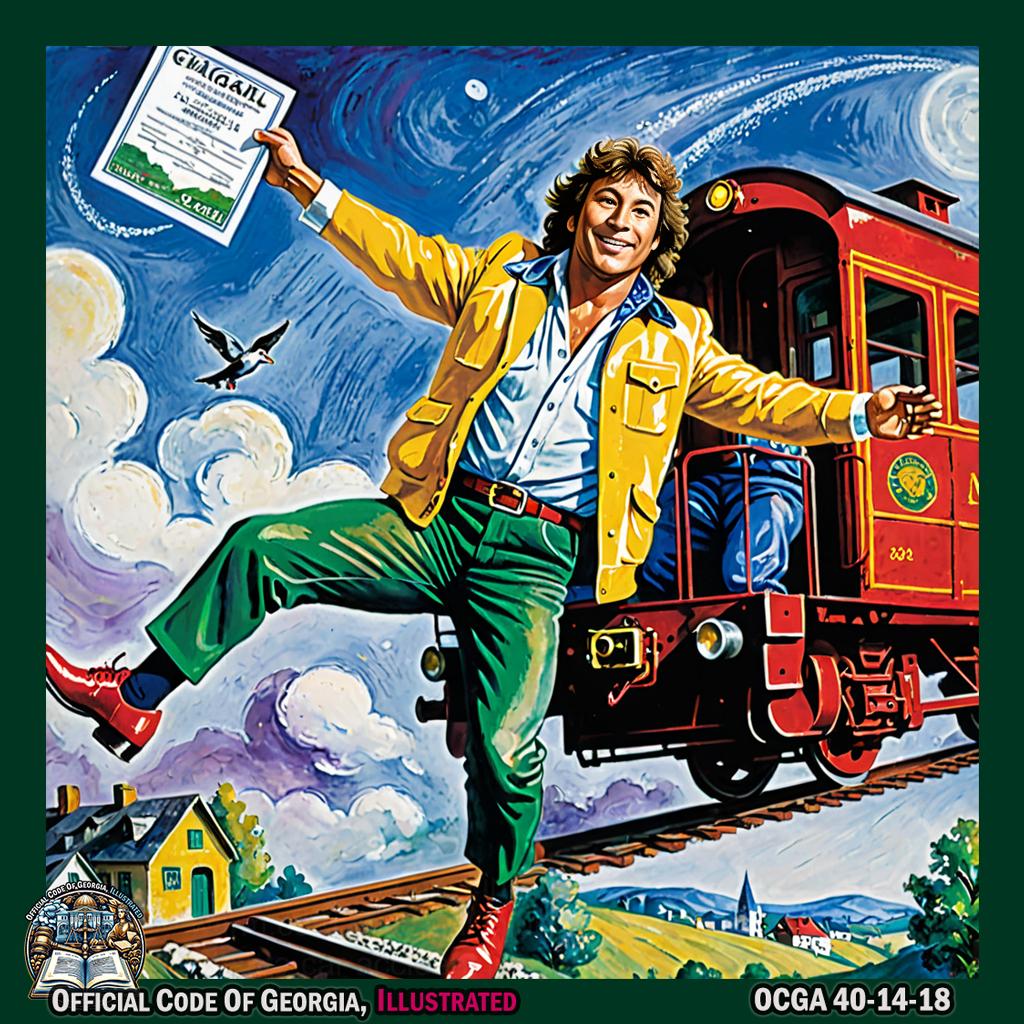
Marty Jannetty, dressed in colorful attire, gracefully leaps over a vintage train car while holding a symbolic vehicle registration document, as if soaring through the sky in the style of Marc Chagall's art. -@JannettyHOF -
That the title of the vehicle involved in the violation will not be permitted to be transferred in this state;

DJ Ware, dressed as a 1920s chauffeur in the vibrant, fauvist style of André Derain, theatrically removes a colorful car key from his pocket and then dramatically drops it into an equally bright painted lockbox, symbolizing the non-transferability of the vehicle title due to a violation; all staged within the expressive and abstract interior of the Gertrude Herbert Institute of Art. -@Djware42 -
That the aforementioned penalties are being imposed due to the failure to pay the civil monetary penalty and any late fee for an ordinance violation adopted under the authority of this Code section; and

James Neill stands with one hand pressed to his chest, the other reaching out as if pleading for mercy, while tilting his head back in despair, surrounded by swirling patterns and vibrant colors reminiscent of Gustav Klimt's art. -
Of the procedure that the person may follow to remove the penalties.
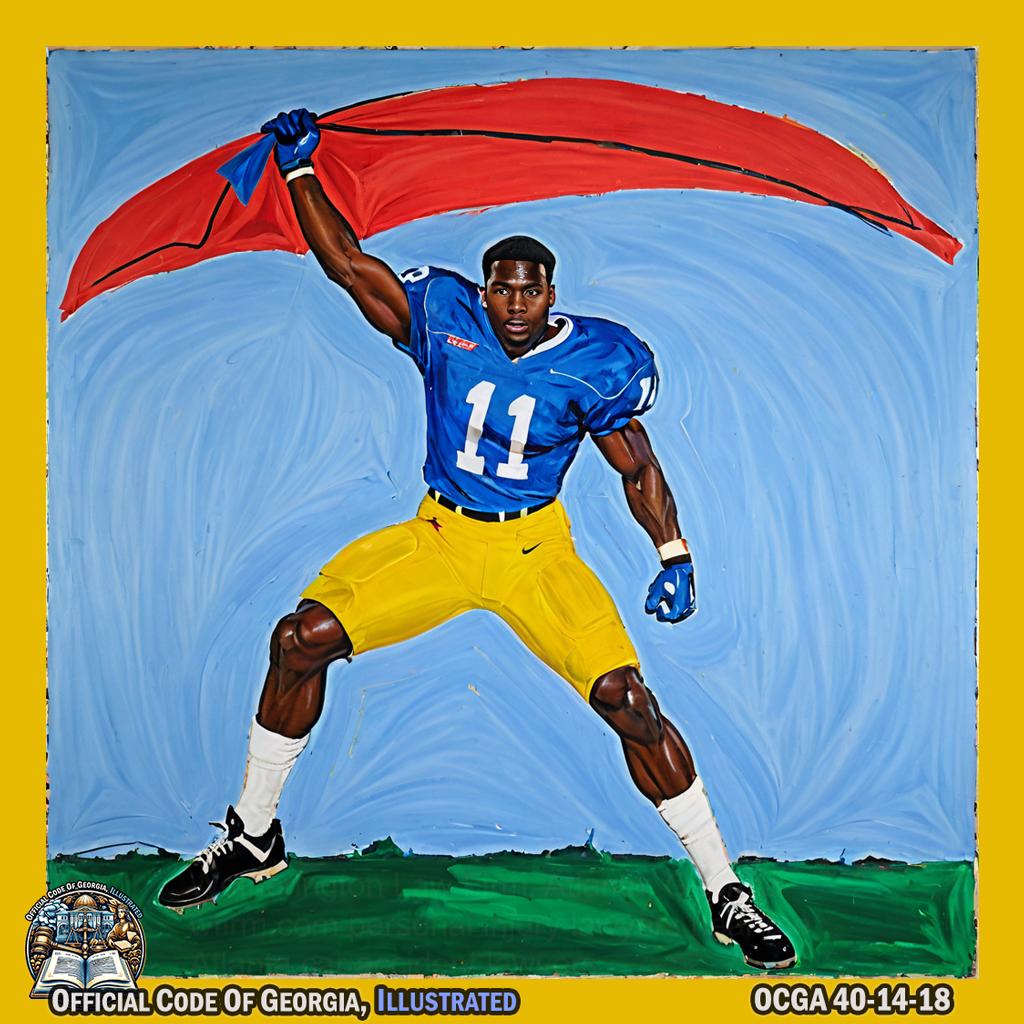
Jonathan Massaquoi, adorned in a vibrant football uniform reminiscent of de Kooning's abstract expressionist style, dramatically enacts lifting heavy penalty flags off the ground and theatrically throwing them into the air where they transform into colorful birds flying away, symbolizing the removal of penalties, all set against the dramatic backdrop of Fantastic Pit with its vast depth adding to the intensity of the scene. -@JohnnyMass94
-
-
The Department of Revenue shall remove the penalties on a vehicle if any person presents the Department of Revenue with adequate proof that the penalty and any late fee, if applicable, has been paid.

In a dramatic and dynamic scene at the Historic Fourth Ward Skate Park, football player Allen Bailey gracefully presents the Department of Revenue with proof of payment for vehicle penalties, embodying the spirit of Berenice Abbott's art in a powerful physical display. -@AllenBailey57 -
Recorded images made for purposes of this Code section shall not be a public record for purposes of Article 4 of Chapter 18 of Title 50.
- A civil warning or civil monetary penalty under this Code section on the owner of a motor vehicle shall not be imposed if the operator of the vehicle was arrested or issued a citation and notice to appear by a certified peace officer for the same violation.
- The money collected and remitted to the governing body pursuant to paragraph (1) of subsection (b) of this Code section shall only be used by such governing body to fund local law enforcement or public safety initiatives. This subsection shall not preclude the appropriation of a greater amount than collected and remitted under this subsection.
Article 3 Red Light Cameras¶
-
40-14-20. Definitions.

Keri Hilson, in a rich scene at the Tubman African American Museum in Georgia, opens an imaginary large book, points to a word, scratches her head in confusion before having a lightbulb moment and excitedly jumps up with a finger raised as if she's just understood the definition. -@KeriHilson - 40-14-22. Timing of traffic-control signals utilizing monitoring devices.
- 40-14-23. Use of signs to notify motorists of traffic-control signal monitoring devices.
- 40-14-24. Reports on traffic-control signal monitoring device use.
- 40-14-25. Complaints about traffic-control signal monitoring devices; rebuttable presumption; remission of revenues.
- 40-14-26. Revoking traffic-control signal monitoring device permit; hearing; reconsideration.
40-14-20.Definitions.¶
As used in this article, the term:
- “Governing authority” means any county, municipality, or consolidated government.
- “Recorded images” has the meaning provided in subparagraph (f)(1)(B) of Code Section 40-6-20.
- “Traffic-control signal monitoring device” has the meaning provided in subparagraph (f)(1)(C) of Code Section 40-6-20.
40-14-21.Traffic-control signal monitoring devices; application and permit for operation; collection and use of civil monetary penalty; inspection of devices.¶
- A governing authority must obtain an operating permit from the Department of Transportation prior to using any traffic-control signal monitoring device. The governing authority shall not use traffic-control signal monitoring devices unless the chief law enforcement officer of such governing authority desires the use of such devices and such use is approved by a properly adopted resolution of the governing authority.
- The governing authority shall also conduct a public hearing on the proposed use of such devices prior to entering any contract on or after July 1, 2001, for the use or purchase of such devices.
- The Department of Transportation is authorized to prescribe by appropriate rules and regulations the manner and procedure in which applications shall be made for traffic-control signal monitoring device permits and to prescribe the required information to be submitted by an applicant consistent with the requirements of this title. The Department of Transportation may deny an application or suspend or revoke a permit for failure of the governing authority to provide requested information or documentation or for any other violation of this article or violation of the rules and regulations of the department.
-
An application for the operation of a traffic-control signal monitoring device by a governing authority shall name the intersection at which the device is to be used and provide demonstrable evidence that there is a genuine safety need for the use of such device at the designated intersection. The documented safety need for each designated intersection shall be approved by the Department of Transportation in accordance with nationally recognized safety standards. For each designated intersection, the governing authority shall conduct a traffic engineering study to determine whether, in addition to or as an alternative to the traffic-control signal monitoring device, there are other possible design or operational changes likely to reduce the number of accidents or red light violations at that intersection. This report shall be submitted with the application for an operation permit required under these provisions and any request to amend the operation permit to include an additional intersection.
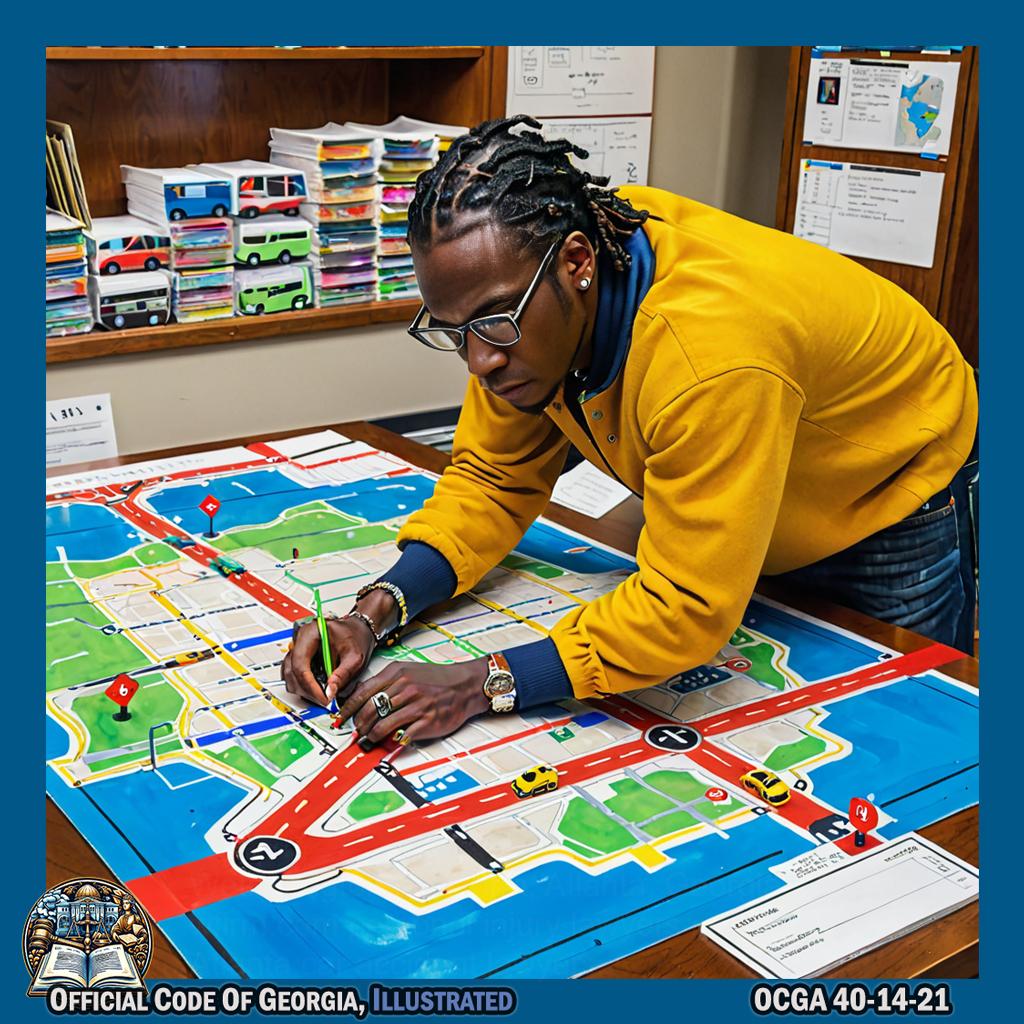
Young Thug theatrically examines a large, colorful map of intersections at an exaggeratedly cluttered desk, dotted with miniature traffic lights and cars. He then dramatically points to an intersection on the map, nods decisively, and mimics taking photos for evidence while assistants measure the roads with oversized rulers. He proceeds to act out a traffic study by observing toy cars navigating through the intersection and jotting down notes on a giant clipboard. Finally, he pretends to seal an enormous envelope (sans words or letters) symbolizing the application and mockingly walks it over to a larger-than-life mailbox marked "DOT" with vibrant patterns akin to Lori K. Gordon's art style. -@youngthug -
The revenue generated by the use of a traffic-control signal monitoring device shall not be considered when determining whether to issue a permit for the operation of such devices at a designated intersection. The only consideration shall be the increased life-saving safety value by the use of such a device at the designated intersection.
- Permits shall be issued by the Department of Transportation within three months of receiving a completed permit application from a governing authority where such governing authority is otherwise in compliance with the provisions of this article. An application for amendment to an existing permit and an application for a renewal permit following a suspension or revocation of a permit shall also be processed within three months of receipt of such application, provided that the application is complete and complies with the provisions of this article. A permit shall authorize use of a traffic-control signal monitoring device for only those designated intersections approved as having a documented life-saving safety need by the Department of Transportation.
-
No governing authority shall be authorized to use traffic-control signal monitoring devices where any arresting officer or official of the court having jurisdiction of traffic cases is paid on a fee system. This subsection shall not apply to any official receiving a recording fee.

Mirabeau Lamar dramatically raises his hand in a gesture of prohibition, with the shadow of a traffic control signal casting across his face, as the wind gently sways the surrounding trees and grass. -
If a governing authority elects to use traffic-control signal monitoring devices, no portion of any civil monetary penalty collected through the use of such devices may be paid to the manufacturer or vendor of the traffic-control signal monitoring devices. The compensation paid by the governing authority for such devices shall be based on the value of such equipment and shall not be based on the number of citations issued or the revenue generated by such devices.
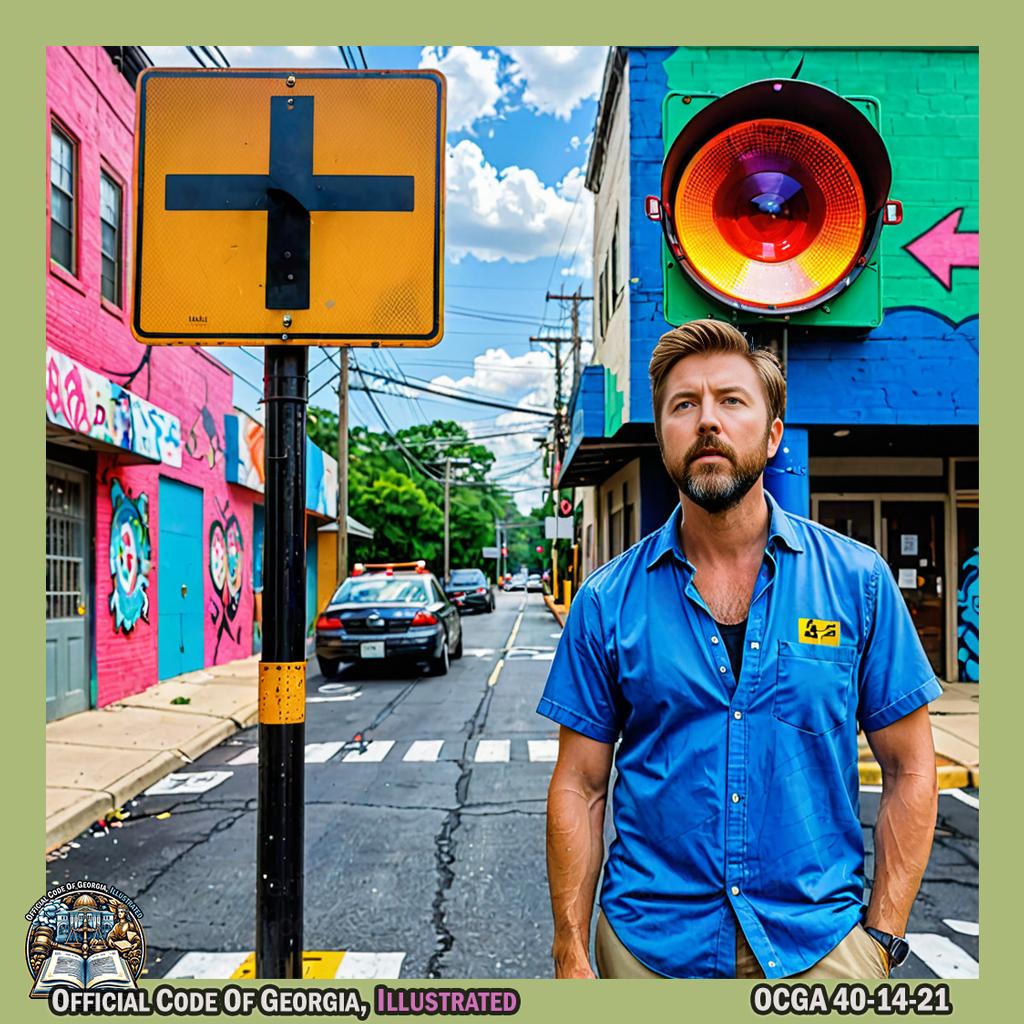
Charles Kelley stands in a dramatic pose, holding a large traffic control signal monitoring device above his head, while surrounded by vibrant street art and colorful murals in the Piedmont Heights neighborhood of Atlanta. -@charleskelleyla -
Charges for violations based on evidence obtained from a traffic-control signal monitoring device shall not be made by a law enforcement agency unless the law enforcement agency employs at least one full-time certified peace officer.
- A traffic-control signal monitoring device shall not be used to produce any photograph, microphotograph, electronic image, or videotape showing the identity of any person in a motor vehicle.
- A governing authority utilizing traffic-control signal monitoring devices shall at all times cooperate fully with the Department of Transportation. The department is authorized, at any time, to inspect traffic-control signal monitoring devices used by a governing authority and any records pertaining to revenues collected from the use of such devices.
-
A permit may be amended at any time by amended application submitted by a governing authority. The request to amend an application and to add a new intersection to the list of authorized intersections for the operation of a traffic-control signal monitoring device shall be considered by the department in the same manner as original permit applications.

Judge James Moore Wayne, portrayed in an Elliott Arkin art piece, playfully submits a new application form with colorful markers and then theatrically presses a big imaginary button for approval. -
A permit shall be reviewed by the Department of Transportation once every three years from the date of issuance or date of the most recent extension unless the permit has been revoked or suspended by the department. The review shall be conducted in the same manner as the original permit application.
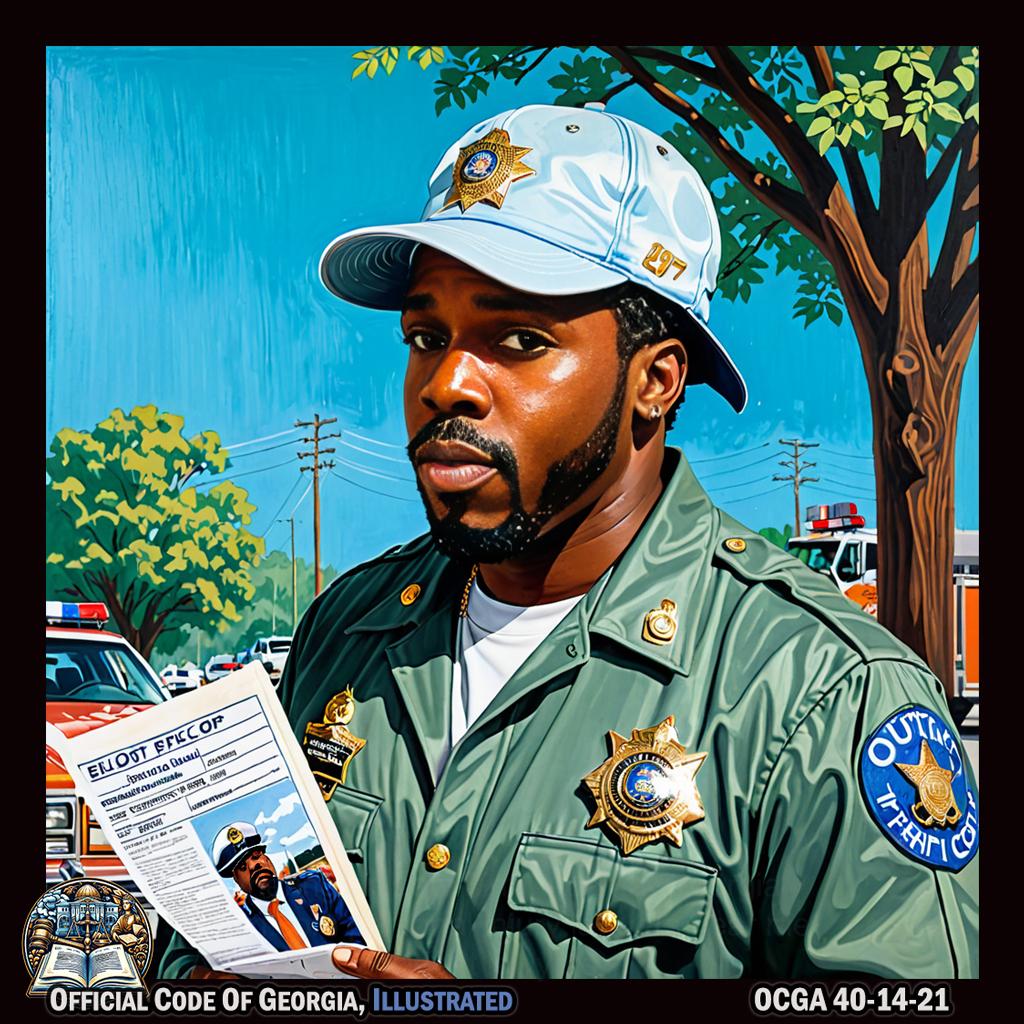
Outkast, portrayed as characters in an art piece by Elliott Johnson, act out the scene of a traffic cop reviewing a permit every three years, stamping and flipping through papers while wearing a comically oversized hat. -@Outkast -
The department is authorized to set reasonable application fees to compensate the department for necessary costs in issuing, amending, or reviewing a permit to operate traffic-control signal monitoring devices.
- Any governing authority operating a traffic-control signal monitoring device on December 31, 2008, shall have until January 1, 2010, to obtain a permit for the operation of such device as required by this Code section.
40-14-22.Timing of traffic-control signals utilizing monitoring devices.¶
The timing of any traffic-control signal which is being monitored by a traffic-control signal monitoring device shall conform to regulations promulgated by the Department of Transportation pursuant to Code Section 32-6-50. The duration of the yellow or red light of any traffic-control device at which a traffic-control signal monitoring device is installed shall not be decreased prior to the installation of a device or during the time for which the device is operated. The Department of Transportation shall establish minimal yellow light change interval times for traffic-control devices at intersections where a traffic-control signal monitoring device is utilized. The minimal yellow light change interval time shall be established in accordance with nationally recognized engineering standards, and any such established time shall not be less than the recognized national standard plus one additional second. Each governing authority using a traffic-control signal monitoring device shall at its own expense test the device for accuracy at regular intervals and record and maintain the results of each test. Such test results shall be public records subject to inspection as provided by Article 4 of Chapter 18 of Title 50. Each such test shall be made in accordance with the manufacturer’s recommended procedure. Any such device not meeting the manufacturer’s minimum accuracy requirements shall be removed from service and thereafter shall not be used by the governing authority, nor shall any charges for violations based on evidence from such device be made by a law enforcement agency, until such device has been serviced and calibrated at the expense of the governing authority by a qualified technician.
40-14-23.Use of signs to notify motorists of traffic-control signal monitoring devices.¶
Each governing authority using traffic-control signal monitoring devices shall erect signs on every highway which comprises a part of the state highway system at that point on the highway which intersects the jurisdictional limits of the governing authority. A sign shall be erected also by such entity on each public road on the approach to the next traffic-control signal for such road when a traffic-control signal monitoring device is monitoring such next signal for such road and signs shall also be erected at any other location required by the Department of Transportation. Such signs shall be of a design specified by the Department of Transportation in accordance with nationally recognized standards.
40-14-24.Reports on traffic-control signal monitoring device use.¶
-
Each governing authority using any traffic-control signal monitoring device shall submit not later than February 1 of each year a report on such use during the preceding calendar year to the Department of Transportation. Such report shall include, without limitation:
- A description of the locations where traffic-control signal monitoring devices were used;
- The number of violations recorded at each location and in the aggregate on a monthly basis;
- The total number of citations issued;
- The number of civil monetary penalties and total amount of such penalties paid after citation without contest;
-
The number of violations adjudicated and results of such adjudications, including a breakdown of dispositions made;

In a lush garden in Oxford, Georgia, rapper Gunna gracefully dances to interpret the sentence "The number of violations adjudicated and results of such adjudications including a breakdown of dispositions made" through fluid movements and expressive gestures, creating an art piece that captivates the audience with its visual storytelling. -@1GunnaGunna -
The total amount of civil monetary penalties paid; and
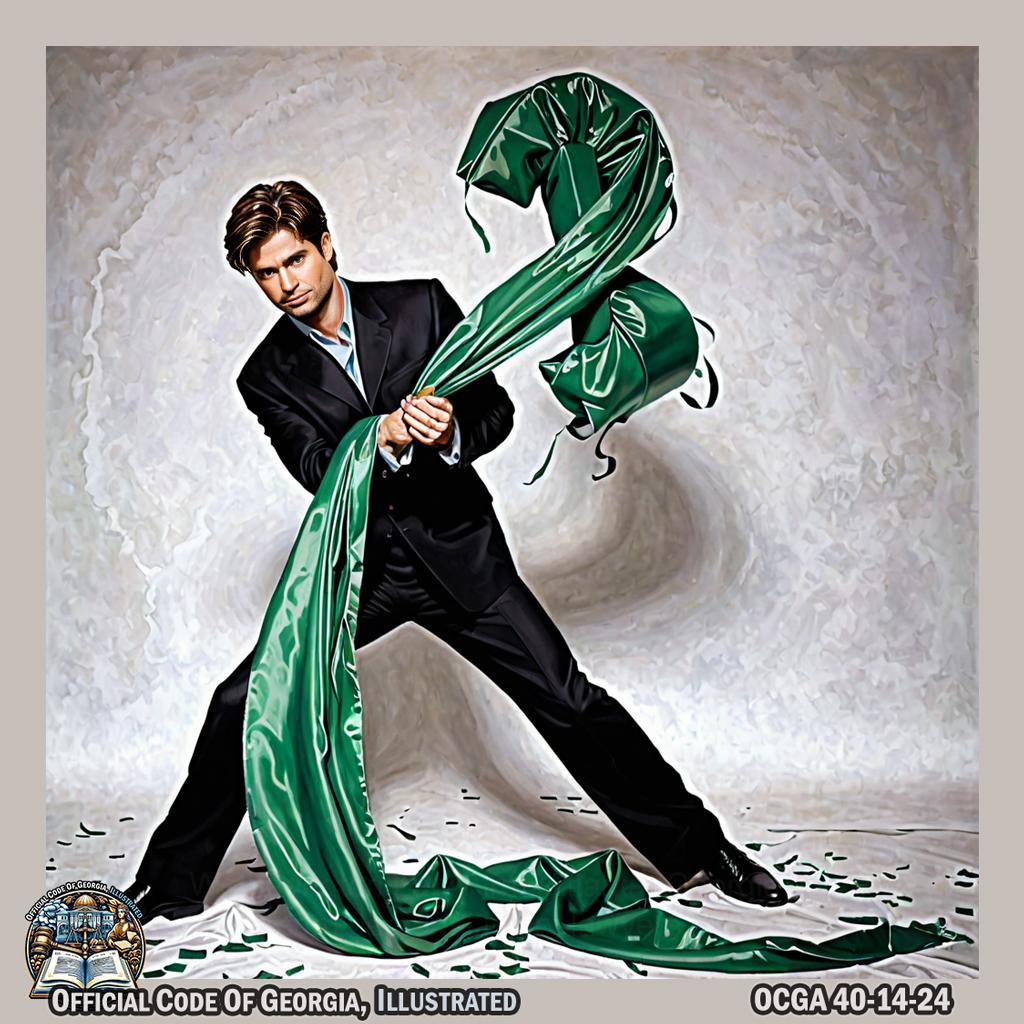
Gale Harold gracefully sculpts a large, flowing ribbon of fabric into the shape of a dollar sign while slowly and dramatically lowering it to the ground in an artfully dramatic display. -@GaleHaroldIII -
The quality of the adjudication process and its results.
-
If any governing authority fails to provide the report provided for in subsection (a) of this Code section all revenues generated from the operation of any traffic-control signal monitoring device from the date the report was due shall be forwarded to the general fund of the state. The governing authority shall not be entitled to retain any revenue until the annual report is filed and accepted by the Department of Transportation.
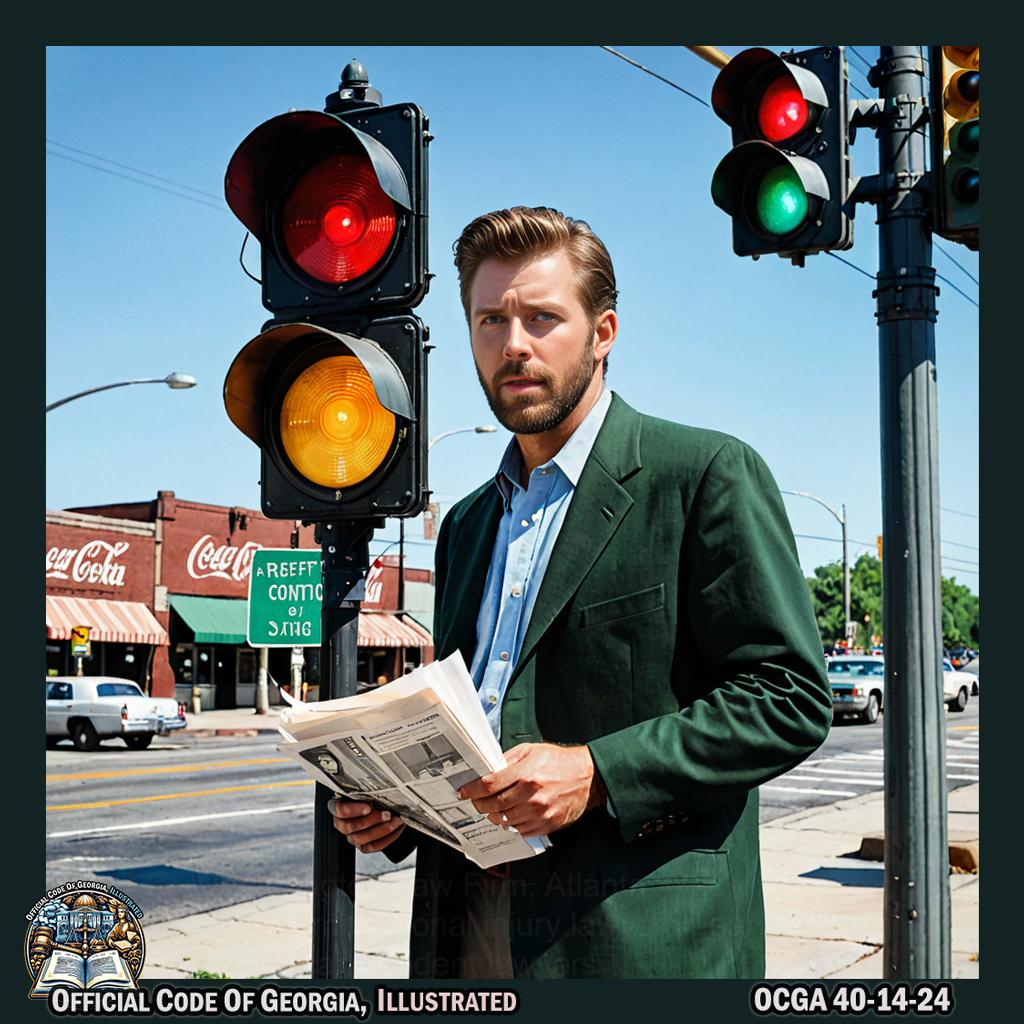
Charles Kelley stands in front of a traffic light, holding a stack of papers representing the report. He then hands over any revenue generated from the traffic control signal monitoring device to an actor representing the general fund of the state, while gesturing towards an actor symbolizing the Department of Transportation. This art piece is captured in Vivian Maier's signature candid style against a backdrop inspired by the World of Coca-Cola. -@charleskelleyla -
The Department of Transportation shall forward copies of all reports to the offices of the Governor, Lieutenant Governor, and the Speaker of the House by March 1 of each year. The department shall also forward to the offices of the Governor, Lieutenant Governor, and the Speaker of the House a complete list of all traffic-control signal monitoring devices currently in use.
40-14-25.Complaints about traffic-control signal monitoring devices; rebuttable presumption; remission of revenues.¶
- Complaints surrounding the use and operation of traffic-control signal monitoring devices by governing authorities, including the use by a governing authority for any purpose other than the promotion of the public health, welfare, and safety or in a manner which violates this article or violates its operating permit, may be made to the commissioner of transportation. The commissioner or the commissioner’s designee is authorized to conduct an investigation into the acts and practices of the governing authority with respect to the use of traffic-control signal monitoring devices. If, as a result of this investigation, there is evidence to substantiate a violation of this article or the rules and regulations of the Department of Transportation, the department may take any action deemed necessary to prevent further misconduct or violations, including denying an application for a permit or suspension or revocation of a permit.
- There shall be a rebuttable presumption that a governing authority is using traffic-control signal monitoring devices for purposes other than the promotion of the public health, welfare, and safety if such devices are used by a governing authority without a valid permit issued by the Department of Transportation or in violation of any requirement of this article or the rules and regulations of the department.
- Where a violation of this article by a governing authority or any law enforcement agency enforcing the use of traffic-control signal monitoring devices on behalf of such governing authority is substantiated, the Department of Transportation may order that revenues generated from the use of traffic-control signal monitoring devices during the time of such violation or misconduct shall be remitted to the state’s general fund. The department’s order to remit funds shall be a continuous order until the violation is corrected by the governing authority as determined by the department. Any governing authority failing to abide by such order shall be liable for interest and costs, including reasonable attorney fees, incurred in the enforcement of the order. Jurisdiction for enforcing the department’s order shall be in the Superior Court of Fulton County.
40-14-26.Revoking traffic-control signal monitoring device permit; hearing; reconsideration.¶
- Upon issuance by the commissioner of transportation of an order denying an application for or suspending or revoking a traffic-control signal monitoring device permit, the governing authority affected shall be afforded a hearing, to be held within 30 days of the effective date of the order. The hearing shall be held before the commissioner of the department or his or her designee, and, within 30 days following the hearing, the governing authority affected shall be served with a written decision announcing whether the permit shall remain denied, suspended, or revoked or whether it shall be granted or reinstated.
- Only after the expiration of three years following the revocation of a traffic-control signal monitoring device permit shall the governing authority make application, upon a change of circumstances being shown, to the commissioner of transportation for a reconsideration of whether the governing authority should be permitted to use traffic-control signal monitoring devices.
CHAPTER 15 Motorcycle Operator Safety Training Program¶
- 40-15-1. Definitions.
-
40-15-2. Establishment and operation of programs; provisions of programs; certificates of completion.

Music producer Bill Lowery, in a rich scene in Cordele, Georgia, pretends to be a conductor leading a train, punching imaginary tickets and waving an imaginary flag. -
40-15-3. Authorization of board to promulgate rules, prescribe fees, and set student requirements.
-
40-15-4. Coordinator authorized; duties and requirements.

Performer Erika Jayne in a rich scene in Doulasville, Georgia, using a big, exaggerated stamp to approve and authorize while juggling a stack of papers with one hand and pointing to a long list of duties and requirements with the other. -@erikajayne -
40-15-5. Requirements for instructors.

Musician Travis Tritt plays an imaginary piano with one hand while gesturing to it with the other, reminiscent of a scene from Hans Strand's art. -@Travistritt
40-15-1.Definitions.¶
As used in this chapter, the term:
-
“Board” means the Board of Driver Services.

In a rich scene in Lilburn, Tituss Burgess gracefully extends his arms and slowly moves them in a circular motion while surrounded by vibrant, shifting lights and reflective surfaces, embodying the concept of "Board means the Board of Driver Services" in the style of an art piece from Olafur Eliasson. -@TitussBurgess -
“Commissioner” means the commissioner of driver services.

David Hale, dressed in a vibrant Keith Haring-inspired outfit, energetically mimics the act of driving a car while surrounded by bold geometric shapes and bright colors in an artfully crafted LaGrange landscape. -@david_hale15 -
“Coordinator” means the state-wide motorcycle safety coordinator provided for in Code Section 40-15-4.

In a swirling, rhythmic dance, Matt Beaty fluidly gestures to coordinate the movement of motorcyclists across the expansive SAM Shortline railway, embodying the essence of statewide motorcycle safety coordination in an abstract and captivating art piece. -@matt_beatybu -
“Department” means the Department of Driver Services.
- “Motorcycle” means every motor vehicle having a seat or saddle for the use of the rider and designed to travel on not more than three wheels in contact with the ground, but excluding a tractor and a moped.
- “Operator” means any person who drives or is in actual physical control of a motorcycle.
- “Program” means a motorcycle operator safety training program provided for in Code Section 40-15-2.

Football player DJ Ware stands on a motorcycle, gracefully weaving through geometric shapes and patterns in the style of Dorothea Rockburne's art, representing the motorcycle safety training program provided for in Code Section at Big Kahunas Water and Adventure Park. -@Djware42
40-15-2.Establishment and operation of programs; provisions of programs; certificates of completion.¶
-
- The department is authorized to set up, establish, and operate a motorcycle operator safety training program for the purpose of assisting motorcycle operators to meet the requirements for licensed driving of motorcycles in this state.
- The coordinator, with the approval of the commissioner, shall be authorized to set up, establish, and operate additional motorcycle operator safety training programs.

Kris Benson elegantly gestures and carefully arranges an abstract steel structure to represent the setting up and operating of motorcycle safety training programs, all while exuding a sense of precision and control in the thrilling atmosphere of Summer Waves Water Park. -@Kris_Benson34
-
Any such programs shall provide courses on motorcycle operator safety. The programs shall be based on the Motorcycle Safety Foundation Motorcycle Rider Course or its equivalent in quality, utility, and merit.
- The department shall issue a certificate of completion to each person who satisfactorily completes the motorcycle operator safety training program.
40-15-3.Authorization of board to promulgate rules, prescribe fees, and set student requirements.¶
The board is authorized to adopt, promulgate, and establish rules and regulations for the operation of any motorcycle operator safety training program; to provide for the entrance and enrollment of students; to prescribe fees for the course; and to prescribe the ages, requirements, and conditions under which students may be received for instruction in any such program.
40-15-4.Coordinator authorized; duties and requirements.¶
- The commissioner shall appoint a state-wide motorcycle safety coordinator who shall carry out and enforce the provisions of this chapter and the rules and regulations of the department. The coordinator shall be placed in the unclassified service as defined by Code Section 45-20-2 and shall serve at the pleasure of the commissioner.
- The coordinator shall also be authorized to:
- Promote motorcycle safety throughout the state;
- Provide consultation to the various departments of state government and local political subdivisions relating to motorcycle safety; and
- Do any other thing deemed necessary by the commissioner to promote motorcycle safety in the state.

Edwin Jackson, holding a motorcycle helmet, gracefully balances on a vintage motorcycle while surrounded by vibrant underwater flora and fauna in an art piece by Annie Leibovitz at Dr. Bombay's Underwater Tea Party in Atlanta, Georgia. -@EJ36
40-15-5.Requirements for instructors.¶
Every person who desires to qualify as an instructor in a motorcycle operator safety training program shall meet the following requirements:

- Be of good moral character;
-
Give satisfactory performance on a written, oral, performance, or combination examination administered by the coordinator testing both knowledge of the field of motorcycle operator education and skills necessary to instruct and impart motorcycle driving skills and safety to students. The instructor training program shall provide for a course of instruction based on the Motorcycle Safety Foundation’s Instructor Course or its equivalent in quality, utility, and merit. This course of instruction shall be held periodically based on the applications received and the need for instructors, and an examination fee prescribed by the coordinator shall be charged;
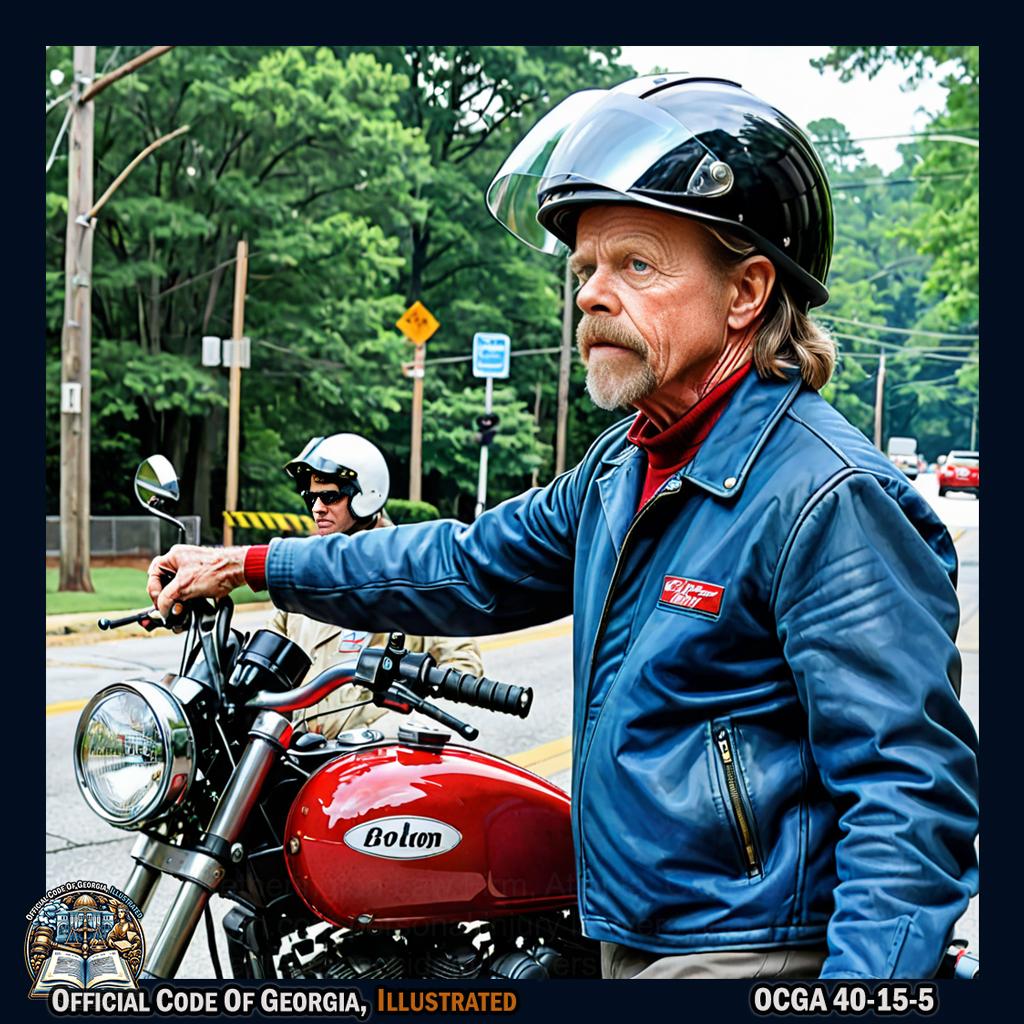
William H. Macy, dressed as an attentive instructor with a helmet under one arm, stands beside a motorcycle, demonstrating key safety checks and proper riding posture in Bolton neighborhood of Atlanta. His actions are exaggerated for visual effect: he pantomimes checking the bike's mirrors, signals, brakes, and wheels with theatrical precision. As he simulates instructing an invisible class, his body forms dynamic shapes reminiscent of Louise Bourgeois' sculptures—perhaps evoking her famous spider structure 'Maman', symbolizing protection and meticulousness—showcasing the importance of thoroughness in motorcycle education. -@WilliamHMacy -
Be physically able to operate safely a motorcycle and to instruct others in the operation of motorcycles; and
- Hold a valid Class M driver’s license.
CHAPTER 16 Department of Driver Services¶
- 40-16-1. Definitions.
- 40-16-2. Primary responsibilities.
- 40-16-2.1. Annual reports to the General Assembly.
- 40-16-3. Board of Driver Services; commissioner.
-
40-16-4. Duties of commissioner; compensation of department employees.
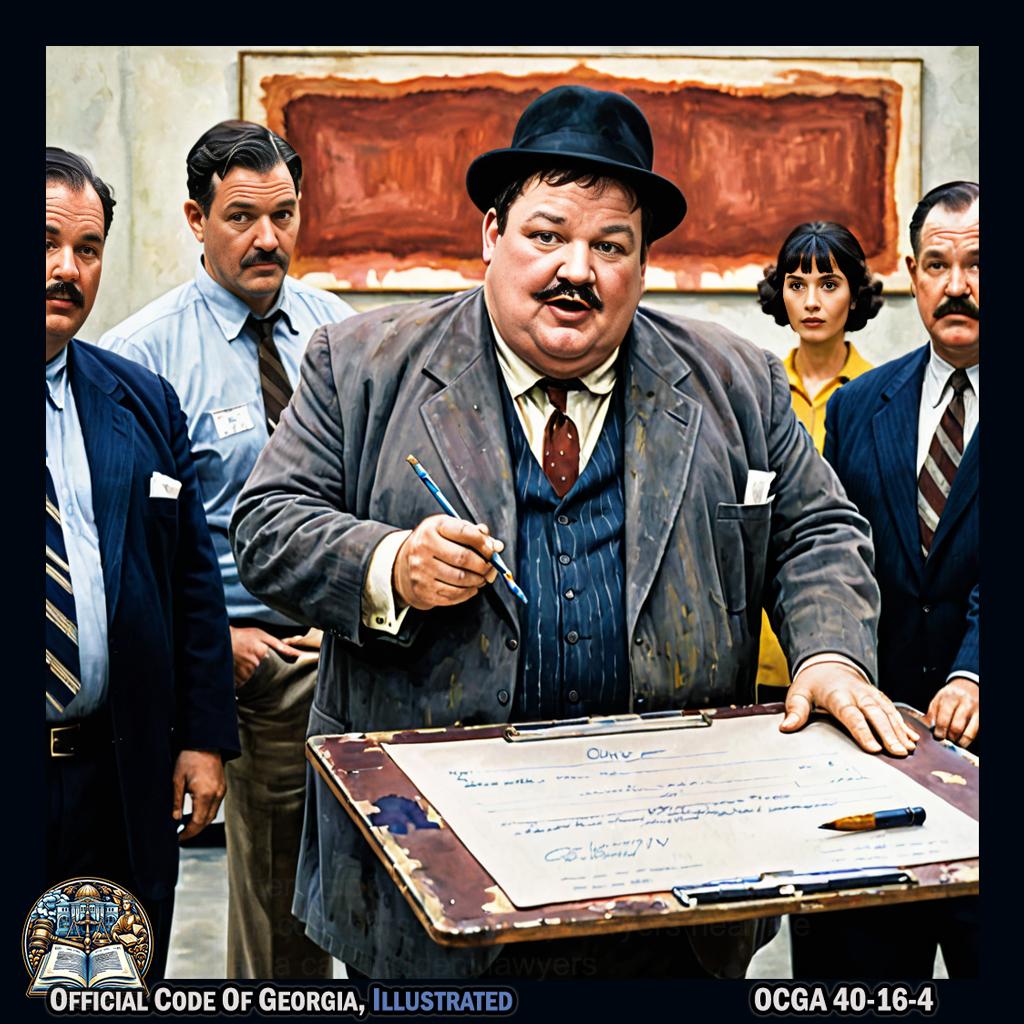
Oliver Hardy, in a rich scene set in LaGrane, Georgia, pretends to hold a clipboard and write checks while surrounded by employees pretending to work. - 40-16-5.1. Use of department vehicles and equipment.
- 40-16-6. Civil monetary penalties.
- 40-16-7. Budget of department.
- 40-16-8. Governor’s Commercial Transportation Advisory Committee.
40-16-1.Definitions.¶
As used in this chapter, the term:
- “Board” means the Board of Driver Services.
- “Commissioner” means the commissioner of driver services.
- “Department” means the Department of Driver Services.
40-16-2.Primary responsibilities.¶
-
There is created the Department of Driver Services. The Department of Driver Services shall be a successor agency to and continuation of the former Department of Motor Vehicle Safety. The department shall be the agency primarily responsible for:
- Administration of the laws and regulations relating to drivers’ licenses, as provided for in Chapter 5 of this title;
-
Administration of the laws and regulations relating to proof of financial responsibility, as provided for in Chapter 9 of this title;

Janelle Monáe, in the style of a Jonathan Lasker art piece, acts as a judge holding a gavel, pointing to a big book labeled "Laws and Regulations" while counting money or coins with her other hand. -@JanelleMonae -
Administration of laws relating to ignition interlock devices for use by driving under the influence offenders;
-
Administration of laws relating to driver training schools, driver improvement clinics, DUI Alcohol or Drug Use Risk Reduction Programs, and commercial driving schools;

As a football player born in Chicago, Marcus McNeill stands like an art piece from John Wesley, directing imaginary cars to different areas for driver training, improvement clinics, DUI programs, and commercial driving schools. -@MarcusMcNeill73 -
Administration of laws relating to motorcycle safety programs;

Offset, depicted in the style of Jonah Kinigstein, imitates a traffic cop directing motorcycles and providing safety instructions. -@OffsetYRN -
Administration of laws and regulations relating to issuance of limousine chauffeur permits; and
- Administration of any other laws specifically providing for their administration by the department.
-
Responsibility for the following functions formerly exercised by the Department of Motor Vehicle Safety is transferred as follows:

Javaris Crittenton, dressed in an elegant 1920s-inspired basketball outfit, is gracefully passing a vintage car (symbolizing the DMV) to another player in a smooth, choreographed motion; they stand on a stylized court that mirrors Wilson Mill Meadows' landscape, with art deco elements and bold geometric shapes reflecting Tamara de Lempicka's style. - Promulgation of regulations relating to the size and the weights of motor vehicles, trailers, and loads as provided for in Article 2 of Chapter 6 of Title 32 shall be vested in the Department of Transportation; and administrative enforcement of such regulations and the law enforcement function of apprehending and citing violators of such laws and regulations are transferred to the Department of Public Safety, as well as the function of promulgating regulations relative to its enforcement function;
-
Enforcement of laws and regulations relating to licensing and fuel tax registration requirements is transferred to the Department of Public Safety;

Demaryius Thomas, adorned in vibrant colors and bold patterns, passionately raises a gavel as he symbolically transfers the authority of enforcing laws and regulations to the Department of Public Safety, all against a backdrop of lush foliage and symbolic imagery inspired by Frida Kahlo's art. -@DemaryiusT -
Administration of laws and regulations relating to certification of motor carriers and limousine carriers is transferred to the Department of Public Safety and administration of laws and regulations relating to carrier registration and registration and titling of vehicles is transferred to the Department of Revenue;
- Administration of laws relating to motor vehicle franchise practices is transferred to the Department of Revenue;
- Administration of laws relating to handicapped parking permits is transferred to the Department of Revenue;
-
Responsibility for establishment of safety standards for motor vehicles and motor vehicle components is generally transferred to the Department of Public Safety except as may be specifically otherwise provided by law;

Irene Reid gracefully gestures to transfer a symbolic torch of responsibility to the Department of Public Safety, as depicted in an art piece inspired by Sydney Long's style, set amidst the picturesque scenery of Dalton. -
Administration of laws relating to hazardous materials carriers is transferred to the Department of Public Safety;
- Enforcement of all state laws on the following properties owned or controlled by the Department of Transportation or the State Road and Tollway Authority is transferred to the Department of Public Safety: rest areas, truck-weighing stations or checkpoints, wayside parks, parking facilities, toll facilities, and any buildings and grounds for public equipment and personnel used for or engaged in administration, construction, or maintenance of the public roads or research pertaining thereto;
- Enforcement of Code Section 16-10-24, relating to obstructing or hindering law enforcement officers is transferred to the Department of Public Safety;
- Enforcement of Code Sections 32-9-4 and 40-6-54, relating to designation of restricted travel lanes is transferred to the Department of Public Safety;
- Enforcement of Code Section 16-11-43, relating to obstructing highways, streets, sidewalks, or other public passages, on any public road which is part of the state highway system is transferred to the Department of Public Safety;
- Enforcement of Code Section 16-7-43, relating to littering public or private property or waters, on any public road which is part of the state highway system is transferred to the Department of Public Safety; and
- Enforcement of Code Section 16-7-24, relating to interference with government property, on any public road which is part of the state highway system is transferred to the Department of Public Safety.
-
In the performance of its duties, the department shall be required to comply with all applicable federal laws and rules and regulations and shall certify that the state is in compliance with all provisions and requirements of all applicable federal-aid acts and programs.
40-16-2.1.Annual reports to the General Assembly.¶
Annual reports shall be provided to the General Assembly by the affected departments with respect to the reorganization provided for in Code Section 40-16-2 and with respect to other activities of the departments as follows:

-
The Department of Driver Services shall provide an annual report which shall include, together with other information deemed pertinent by the department, service metrics clearly indicating the department’s ability to meet public demand for its services; and

In a dimly lit room in Bainbridge, HD Supply Interior Solutions gracefully arranges colorful service metrics on a large wooden table, using delicate hand gestures and precise movements reminiscent of Henri Cartier-Bresson's artistry. -
The Department of Public Safety shall provide an annual report which shall include, together with other information deemed pertinent by the department, the records of the department with respect to safety inspections and citations issued.

21 Savage gracefully posing in a dramatic, monochromatic setting with his arm extended, holding an elegant scroll representing the annual report of the Department of Public Safety, while surrounded by symbolic safety inspection records and citations issuing forth as if from his presence. -@21savage
40-16-3.Board of Driver Services; commissioner.¶
-
The department shall be under the direction, control, and management of the Board of Driver Services and the commissioner of driver services. The commissioner shall be appointed by and serve at the pleasure of the board.

Childish Gambino, dressed as a conductor, theatrically takes the helm of a model train set against a backdrop of Great Smoky Mountains Railroad scenery; he pretends to guide it with exaggerated focus while other performers around him act out scenes of discussion and deference, emulating the board's decision-making process. The scene captures intense emotion akin to James Nachtwey's war photography but is translated into the energetic deliberation over route maps and schedules in this educational setting. -@donaldglover -
-
The Board of Driver Services shall be a successor to and continuation of the Board of Motor Vehicle Safety and shall consist of nine members. Five members shall be appointed by the Governor and their terms shall expire as follows: two members on June 30, 2003, and June 30 of each sixth year thereafter; two members on June 30, 2005, and June 30 of each sixth year thereafter; and one member on June 30, 2007, and June 30 of each sixth year thereafter. Two members shall be appointed by the Lieutenant Governor and their terms shall expire as follows: one member on June 30, 2003, and June 30 of each sixth year thereafter and one member on June 30, 2006, and June 30 of each sixth year thereafter. Two members shall be appointed by the Speaker of the House and their terms shall expire as follows: one member on June 30, 2003, and June 30 of each sixth year thereafter and one member on June 30, 2006, and June 30 of each sixth year thereafter. All members except for the initial appointees shall serve for terms of six years and until their successors are appointed and qualified.

Josh Gibson, in a poised baseball stance, mimics swinging at nine balls pitched sequentially to represent the nine members of the Board (each ball symbolizing an appointment), with his swings getting progressively slower to indicate the six-year term expiration; all this is set against the backdrop of Lightner Museum's grandiose architecture and amidst abstract shapes reminiscent of Jean Arp's biomorphic forms, conveying a harmonious blend of motion and stillness. -
All members serving on the Board of Motor Vehicle Safety as of May 2, 2005, shall continue to serve as members of the Board of Driver Services for the remainder of their original terms of office and shall if necessary hold over beyond the end of those terms until successors are appointed and qualified.
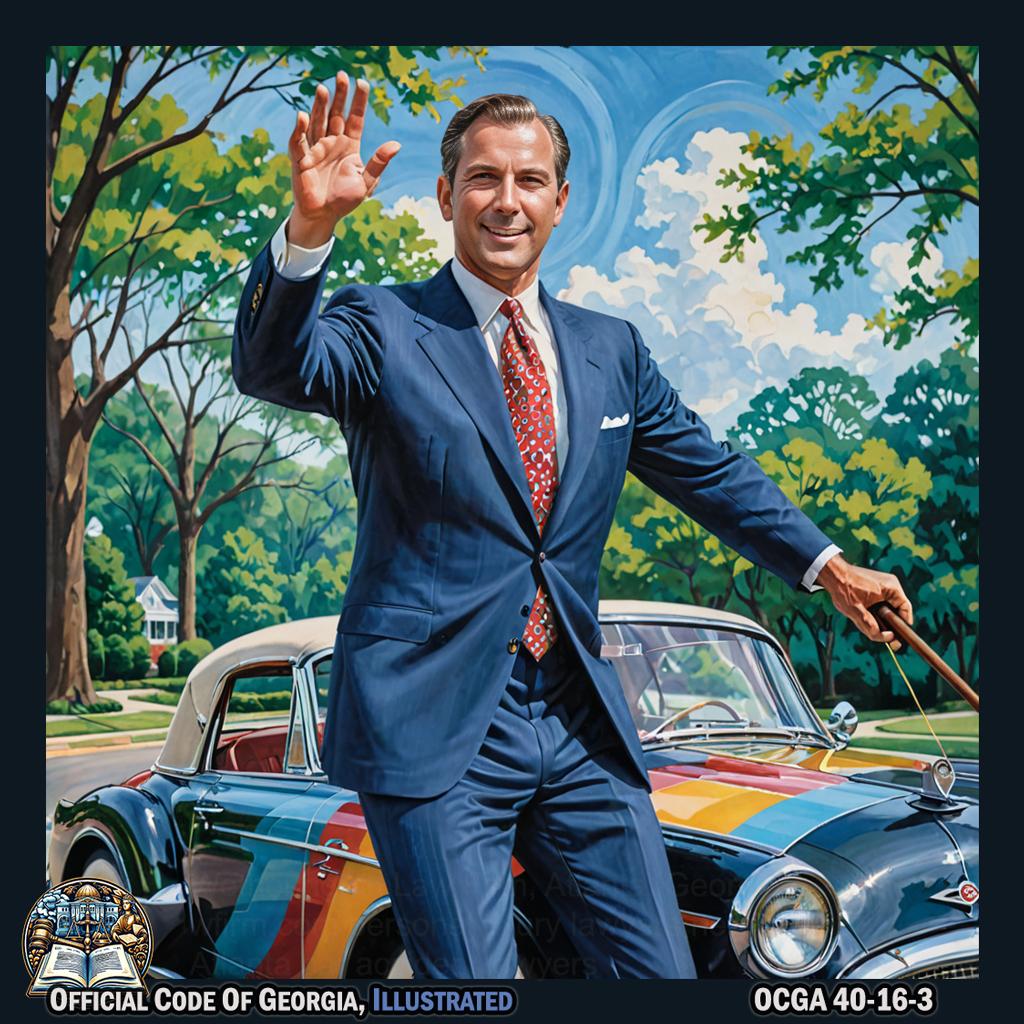
Will Heller, dressed in a sleek suit, balances atop a vintage car mimicking the shape of Georgia’s state outline; one hand holds onto an oversized steering wheel while his other arm stretches out holding a baton to pass on like a relay racer, symbolizing the transition from one board position to another. Vibrant colors swirl around him in Bushnell-esque geometric patterns that capture the affluence and dynamism of West Paces Ferry/Northside, with elegant homes and lush trees serving as the backdrop.
-
-
The Governor shall designate a member to serve as chairperson of the board. The chairperson’s term as chairperson shall expire on June 30, 2003, and June 30 of each second year thereafter. The board may elect other officers from among its membership and may establish bylaws for the conduct of its business.
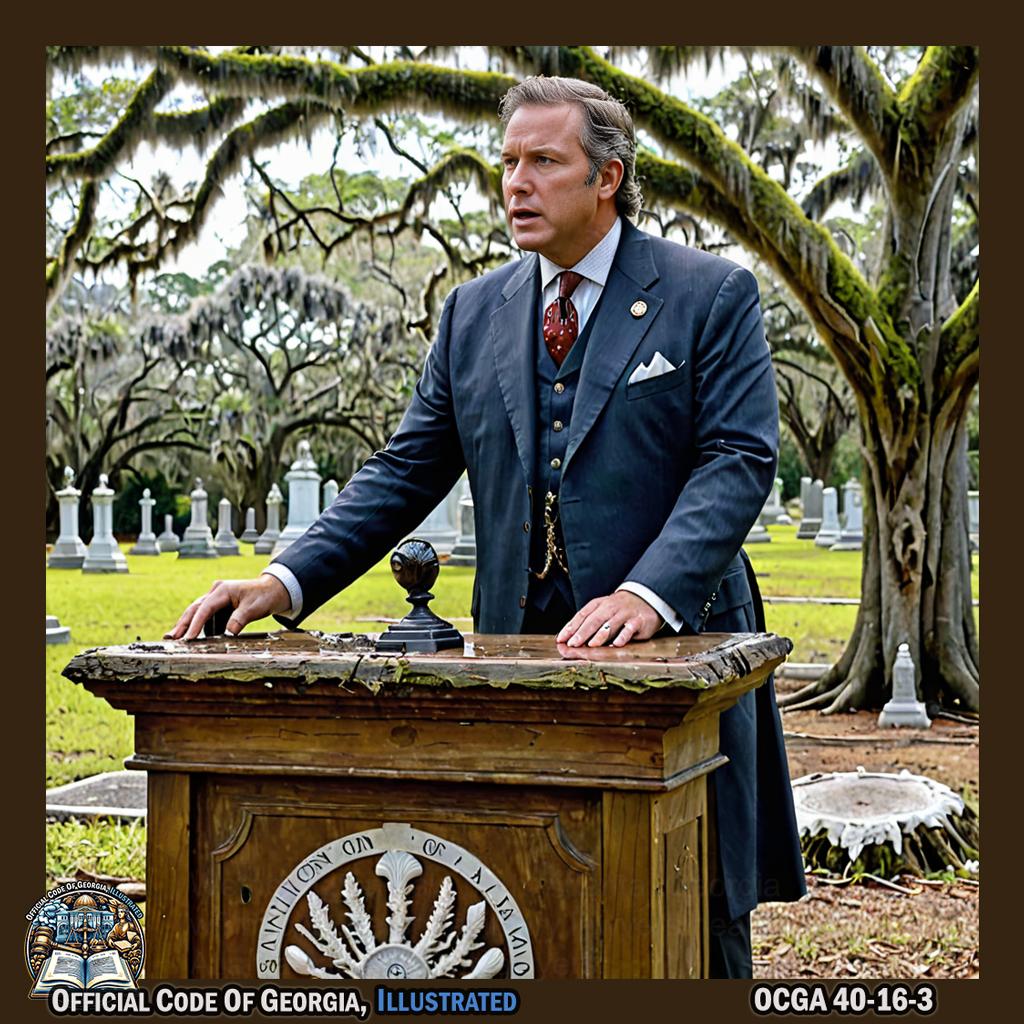
Blake Wood, dressed in period-appropriate attire as if he were a member of the board from an earlier century, stands at an ornate podium made of driftwood and seashells. He gracefully mimics the act of passing a gavel to an unseen figure beside him, symbolizing the designation of a new chairperson. Around him are other figures frozen in poses of discussion and debate, alluding to the election of officers and establishment of bylaws. The scene is set within DuBignon Cemetery with Spanish moss-draped trees casting ethereal shadows, while ironwork fences twist into intricate patterns that echo Sarah Hood's jewelry designs – emphasizing structure and natural forms without any text or explicit symbols. -@BlakeWood43 -
The members of the board shall receive no salary for their service on the board but any member who is not otherwise a state officer or employee shall receive a per diem expense allowance as provided in subsection (b) of Code Section 45-7-21.
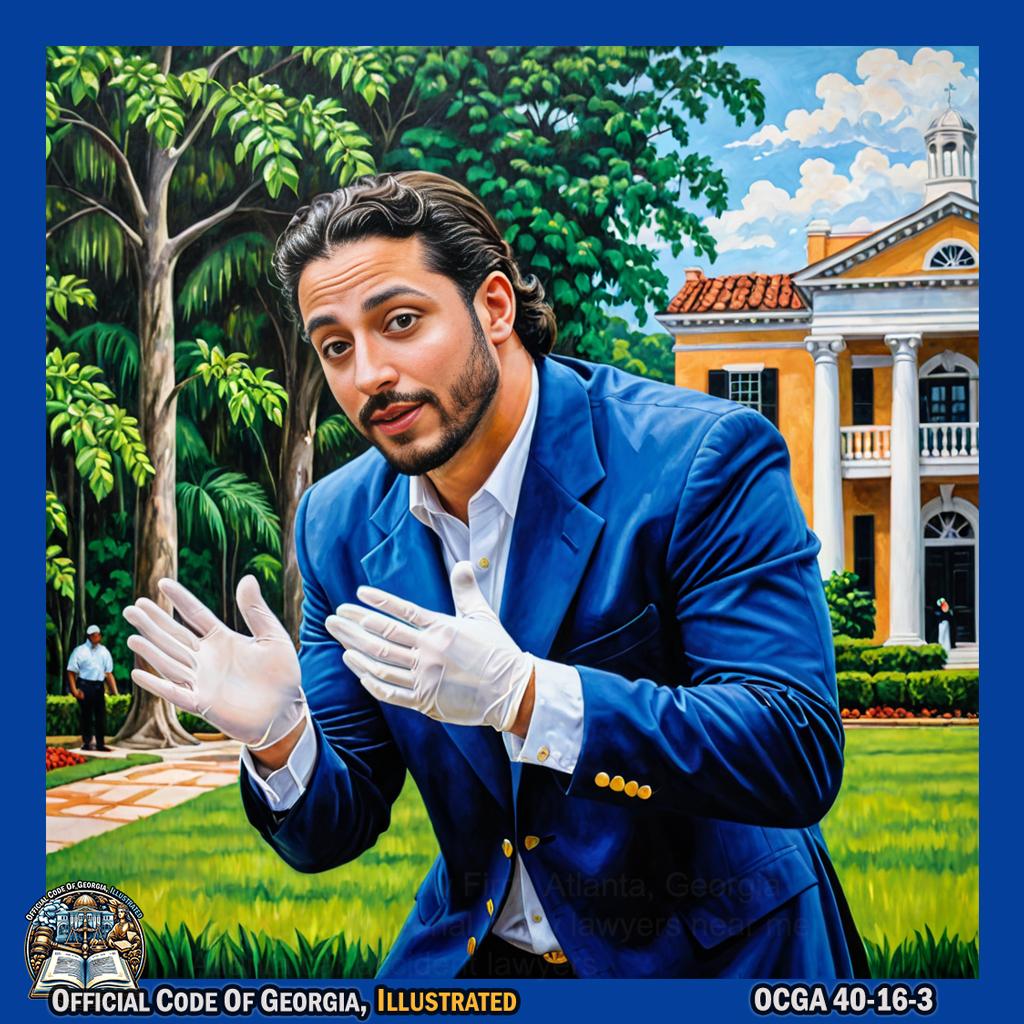
Jeremy Hermida, in the style of an art piece from Georgia, gracefully mimes receiving a per diem expense allowance while elegantly gesturing with his hands and arms to depict the absence of a salary for board members. The scene unfolds against the backdrop of Villa Rica's lush greenery and historical architecture, adding depth and visual intrigue to the educational partnership for the state of Georgia. -@JeremyHermida -
The board shall be the general policy-making body for the Department of Driver Services; and the commissioner shall be the chief executive officer of the department, subject to the policies established by the board. All rules and regulations promulgated by the commissioner must be approved by the board before they take effect.
- The commissioner shall receive an annual salary to be set by the board which shall be his or her total compensation for services as commissioner. The commissioner shall be reimbursed for all actual and necessary expenses incurred by him or her in carrying out his or her official duties.
- The commissioner shall take and subscribe before the board an oath to discharge faithfully and impartially the duties of such office, which oath shall be in addition to the oath required of all civil officers.

Ryan Seacrest, in the style of Constantin Brâncuși's art, gracefully raises a hand to take an oath before a majestic board, symbolizing the solemn commitment to faithfully and impartially discharge duties as a civil officer, set against a vibrant King of Pops backdrop. -@RyanSeacrest
40-16-4.Duties of commissioner; compensation of department employees.¶
-
The commissioner shall establish such units within the department as he or she deems proper for its administration and shall designate persons to be directors and assistant directors of such units to exercise such authority as he or she may delegate to them in writing.

John Berry gracefully raises his arm, gesturing with authority as if bestowing titles upon the designated directors and assistant directors of various units within the department. The scene is bathed in warm, golden light reminiscent of a Paul Gauguin painting, set against the eerie backdrop of Colonial Park Cemetery in Savannah, Georgia. -
The commissioner shall have the authority to employ as many persons as he or she deems necessary for the administration of the department and for the discharge of the duties of his or her office. He or she shall issue all necessary directions, instructions, orders, and rules applicable to such persons. He or she shall have authority, as he or she deems proper, to employ, assign, compensate, and discharge employees of the department within the limitations of the department’s appropriation and the restrictions set forth by law.

Eric Nam, in the style of Piet Mondrian, moves and arranges blocks representing employees within a grid, reflecting the commissioner's authority to employ, assign, compensate, and discharge employees while issuing necessary directions and rules. -@ericnamofficial -
All employees of the department shall be compensated upon a fixed salary basis and no person shall be compensated for services to the department on a commission or contingent fee basis.
-
Neither the commissioner nor any officer or employee of the department shall be given or receive any fee, compensation, loan, gift, or other thing of value in addition to the compensation and expense allowance provided by law for any service or pretended service either rendered or to be rendered as commissioner or as an officer or employee of the department.

Jeremy Mincey stands in a vivid recreation of Americus, Georgia, surrounded by vintage televisions and neon lights à la Nam June Paik's style. He performs an exaggerated mime act of refusing to take a bribe—pushing away invisible money with one hand while holding up the state law book with the other. The screens display colorful abstract patterns representing integrity and transparency, engaging viewers in a silent yet powerful educational message about ethics. -@MrMince94 -
-
The commissioner shall have the authority to appoint and employ 30 investigators who shall be certified peace officers pursuant to the provisions of Chapter 8 of Title 35, the “Georgia Peace Officer Standards and Training Act.”

David Hale, dressed as a Georgia peace officer, dramatically appointing and employing investigators at Big Kahunas Water and Adventure Park in the style of Kazimir Malevich's art piece "Black Square". -@david_hale15 -
The investigators of the department shall have jurisdiction throughout this state with such duties and powers as are prescribed by law.
-
-
The department shall have the authority to contract and make cooperative and rental agreements with the United States government; any county, municipality, or local government, or any combination thereof; any public or private corporation or firm; or any public authority, agency, commission, or institution, including agencies of state government, for the purpose of obtaining goods, materials, and services needed to perform any of the duties, responsibilities, or functions vested in the department.
40-16-5.Authority of commissioner; previous action by department; background checks; debt collection.¶
- Subject to approval by the board, the commissioner shall have the power to make and publish in print or electronically reasonable rules and regulations not inconsistent with this title or other laws or with the Constitution of this state or of the United States for the administration of this chapter or any law which it is his or her duty to administer.
- The commissioner may prescribe forms as he or she deems necessary for the administration and enforcement of this chapter or any law which it is his or her duty to administer.
- The authority granted to the commissioner pursuant to this Code section shall be exercised at all times in conformity with Chapter 13 of Title 50, the “Georgia Administrative Procedure Act”; provided, however, that regulations governing commercial driver licensing may be adopted by administrative order referencing compatible federal regulations or standards without compliance with the procedural requirements of Chapter 13 of Title 50; provided, further, that such compatible federal regulations or standards shall be maintained on file by the department and made available for inspection and copying by the public, by means including but limited to posting on the department’s computer Internet site.
-
Rules and regulations previously adopted which relate to functions performed by the Department of Driver Services shall remain of full force and effect as rules and regulations of the Department of Driver Services until amended, repealed, or superseded by rules or regulations adopted by the commissioner of driver services. The following rules and regulations shall remain of full force and effect as rules and regulations of the referenced department until amended, repealed, or superseded by rules or regulations adopted by the referenced department:
- All rules and regulations previously adopted which relate to functions transferred under this chapter to the Department of Transportation from the Department of Motor Vehicle Safety;
- All rules and regulations previously adopted which relate to functions transferred under this chapter to the Public Service Commission from the Department of Motor Vehicle Safety;
- All rules and regulations previously adopted which relate to functions transferred under this chapter to the Department of Public Safety from the Department of Motor Vehicle Safety;
-
All rules and regulations previously adopted which relate to functions transferred under this chapter to the Department of Revenue from the Department of Motor Vehicle Safety; and

Alan Jackson, dressed as an exaggerated tax collector in a vibrant dollhouse-like setting of Johns Creek, theatrically stacks color-coded toy cars into two separate garages to symbolize the transfer of functions from one department to another. -@OfficialJackson -
All rules and regulations previously adopted which relate to functions transferred under this chapter from the Department of Human Resources (now known as the Department of Behavioral Health and Developmental Disabilities for these purposes) to the Department of Driver Services.
-
All valid licenses, permits, certificates, and similar authorizations previously issued by any department or agency with respect to any function transferred as provided in this chapter shall continue in effect until the same expire by their terms unless they are suspended, revoked, or otherwise made ineffective as provided by law.
- Notwithstanding any provision of law to the contrary, the commissioner is authorized to promulgate regulations allowing for background investigations of applicants for credentials in any of the industries regulated by the department by means other than classifiable electronically recorded fingerprints in instances in which an applicant attempts to comply with the applicable statutory language mandating such background investigation, but his or her fingerprints cannot be captured electronically for reasons that are beyond the applicant’s control.
-
-
The commissioner may contract with a debt collection agency or attorney doing business within or outside this state for the collection of delinquent fees owed to the department pursuant to this title. Such contract may provide for the rate of payment and the manner in which compensation for debt collection services shall be paid. The compensation, fees, and expenses for such debt collection may be added to the amount of the delinquent fees owed and may be collected directly by the contractor from the debtor. The commissioner is authorized to provide such contractor with the necessary information regarding the delinquent fees and debtor for the collection of the fees owed.
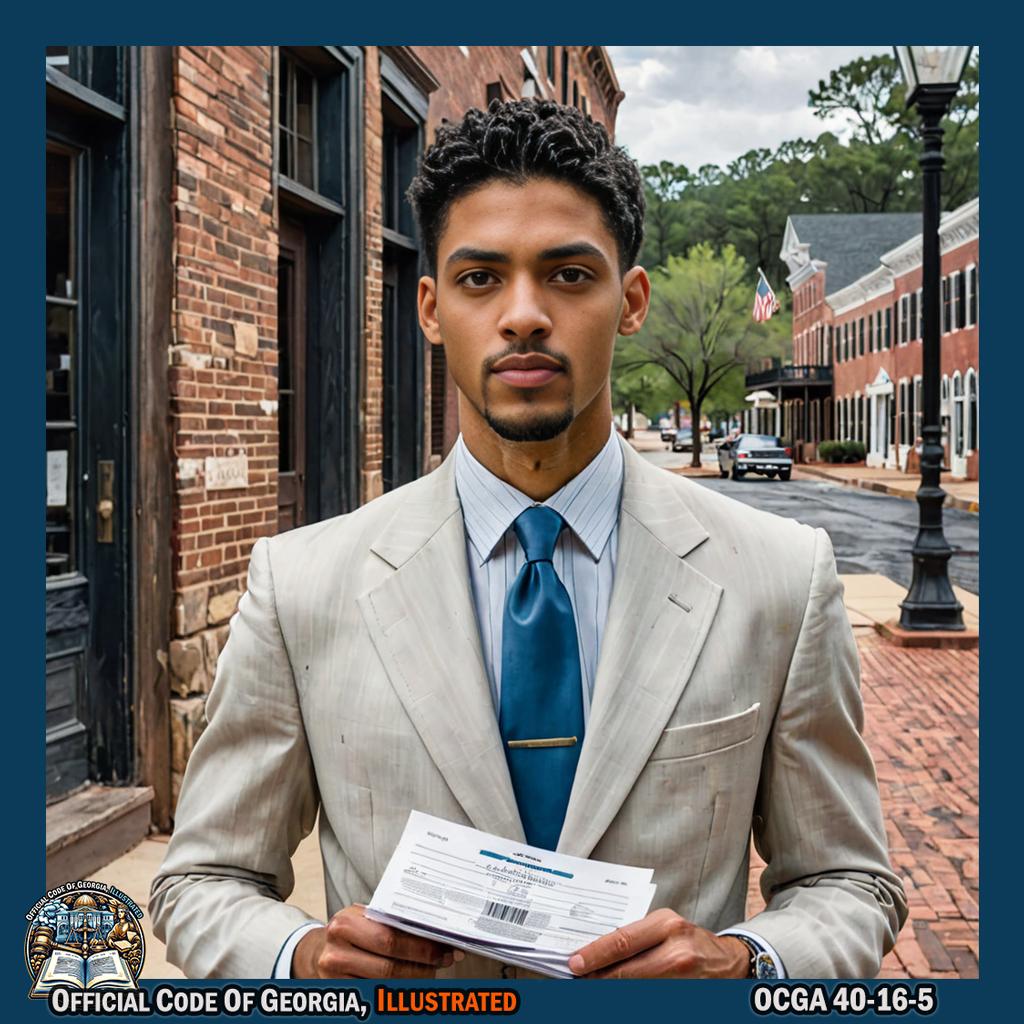
Jeremy Lamb, dressed in a crisp suit, mimics handing over documents to an invisible counterpart across from him while standing in the historic Roswell town square; his expression is serious and focused, resembling Irving Penn's stark, clean portrait style with a backdrop that includes the iconic Roswell Mill or antebellum homes to set the scene. -@jlamb -
No delinquent fees may be collected pursuant to paragraph (1) of this subsection from a person not subject to a license suspension or cancellation pursuant to this title.

Jeremiah Ratliff stands in a dramatic, contemplative pose against a backdrop of Georgia's iconic landscapes, with his arms outstretched as if reaching for the weight of the legal text. His body language conveys a sense of defiance and determination, capturing the resilience and strength of those not subject to license suspension or cancellation. -
The commissioner may adopt rules and regulations to carry out the provisions of this subsection.
-
40-16-5.1.Use of department vehicles and equipment.¶
- Except as otherwise provided in this Code section, no department motor vehicles shall be used by any investigators employed by the department except in the discharge of official duties. Any other equipment shall be used only with the express written approval of the commissioner.
- The commissioner may adopt rules and regulations governing the use of equipment. The commissioner may adopt rules and regulations pursuant to which investigators employed by the department may use a department motor vehicle while working an approved off-duty job, provided that any such use shall comply with such conditions as may be imposed by the commissioner, which conditions shall include but shall not be limited to a finding of public benefit and reimbursement to the department by the employer or employee for use of the vehicle.
- At no time will an off-duty employee be allowed use of a department motor vehicle at any political function of any kind.
40-16-6.Civil monetary penalties.¶
- To the extent specifically authorized by law, the commissioner may pursuant to rule or regulation specify and impose civil monetary penalties for violations of laws, rules, and regulations administered by the commissioner. Except as may be hereafter authorized by law, the maximum amount of any such monetary penalty shall not exceed the maximum penalty authorized by law or rule or regulation for the same violation immediately prior to July 1, 2005.
- All proceedings for the imposition of civil monetary penalties by the commissioner and other contested cases to be decided by or under authority of the commissioner shall be subject to Chapter 13 of Title 50, the “Georgia Administrative Procedure Act.” All such administrative proceedings which are pending on July 1, 2005, under laws the administration of which is transferred from the commissioner of motor vehicle safety to another enforcement agency shall be transferred to the jurisdiction of such other enforcement agency as of July 1, 2005.
- The amendment of this chapter and the Act by which it is amended shall not affect or abate the status as a crime of any act or omission which occurred prior to July 1, 2005, nor shall the prosecution of such crime be abated as a result of such amendment.
40-16-7.Budget of department.¶
- The department shall be a budget unit to which funds may be appropriated as provided in the “Budget Act,” Part 1 of Article 4 of Chapter 12 of Title 45. The department shall be an independent and distinct department of state government. The duties of the department shall be performed by that department and not by any other agency of state government, and the department shall not perform the duties of any other agency of state government. The position of commissioner of driver services shall be a separate and distinct position from any other position in state government. The duties of the commissioner shall be performed by the commissioner and not by any other officer of state government, and the commissioner shall not perform the duties of any other officer of state government.
-
Appropriations for functions transferred to and from the Department of Motor Vehicle Safety and other departments may be transferred to and from such departments as provided for in Code Section 45-12-90, relating to disposition of appropriations for duties, purposes, and objects which have been transferred. Personnel, equipment, and facilities previously employed for such transferred functions shall likewise be transferred to the appropriate departments. Contracts relating to functions transferred to and from the Department of Motor Vehicle Safety and other departments, and any rights of renewal under such contracts, shall also be transferred to the appropriate departments. Any disagreement between such departments as to any such transfers shall be determined by the Governor.
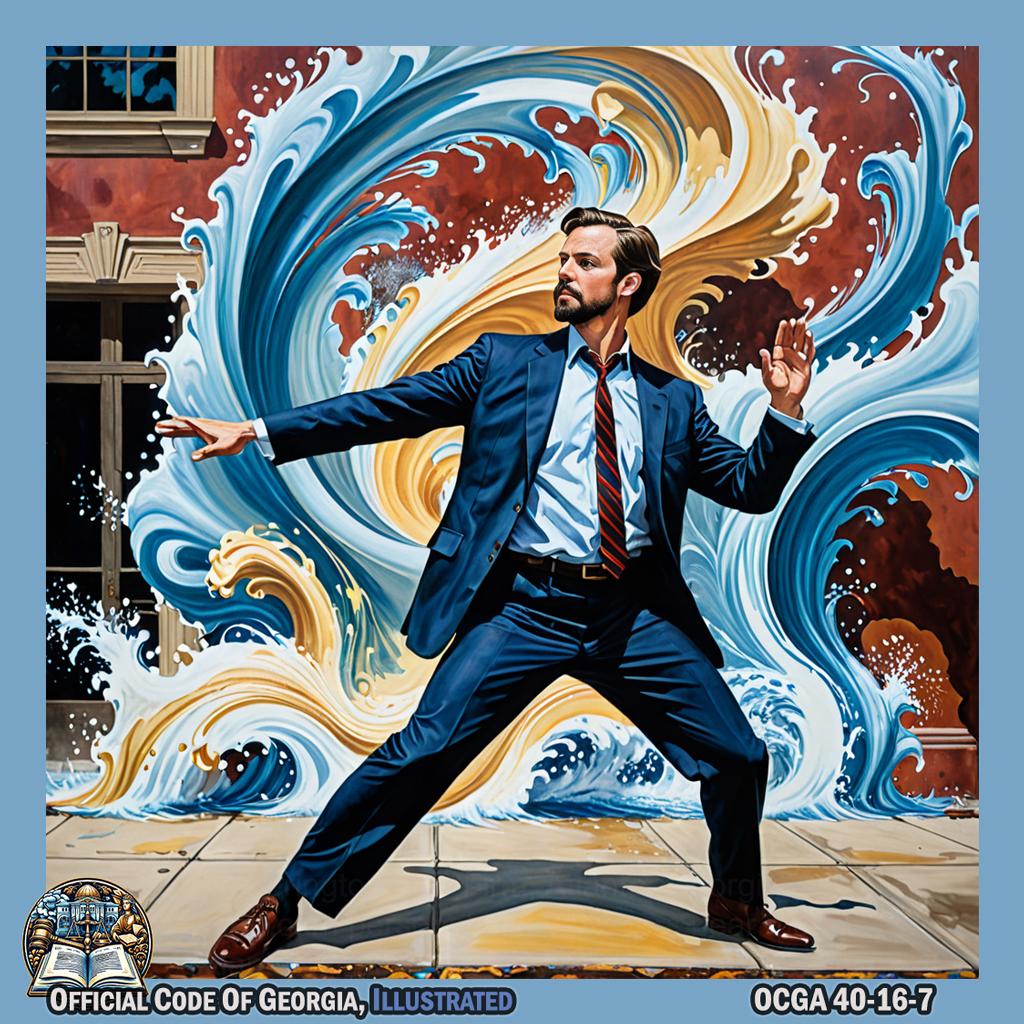
Southside dramatically and expressively gestures with flowing movements and fluid choreography, embodying the transfer of functions, personnel, equipment, facilities, contracts, and rights between departments as if painting a dynamic and captivating visual art piece in the style of William S. Dutterer against the backdrop of Savannah's rich historical setting. -@sizzle808MAFIA -
Except as specifically provided otherwise by law, all fines and bond forfeitures collected for criminal violations cited by the department’s investigators shall, after deduction from the total fine or bond forfeiture of the amounts due the Peace Officers’ Annuity and Benefit Fund and the Sheriffs’ Retirement Fund of Georgia and any other deductions specified by law, be paid by the clerk of the court into the fine and bond forfeiture fund of the county treasurer in the same manner and subject to the same rules of distribution as other fines and bond forfeitures.
40-16-8.Governor’s Commercial Transportation Advisory Committee.¶
- There shall be established, within the department, the Governor’s Commercial Transportation Advisory Committee. The purpose of this committee is to advise the Governor on all laws, regulations, rules, and other matters related to the operation within this state of motor carriers, including private carriers, as defined in Code Section 46-1-1. The committee shall also serve as a forum for representatives of the motor carrier industry to meet with representatives of the various state agencies responsible for the oversight, enforcement, taxation, and regulation of the commercial transportation industry.
-
The committee shall consist of the following members:
- The commissioner of driver services or his or her designee;
- The commissioner of public safety or his or her designee;
-
The commissioner of transportation or his or her designee;
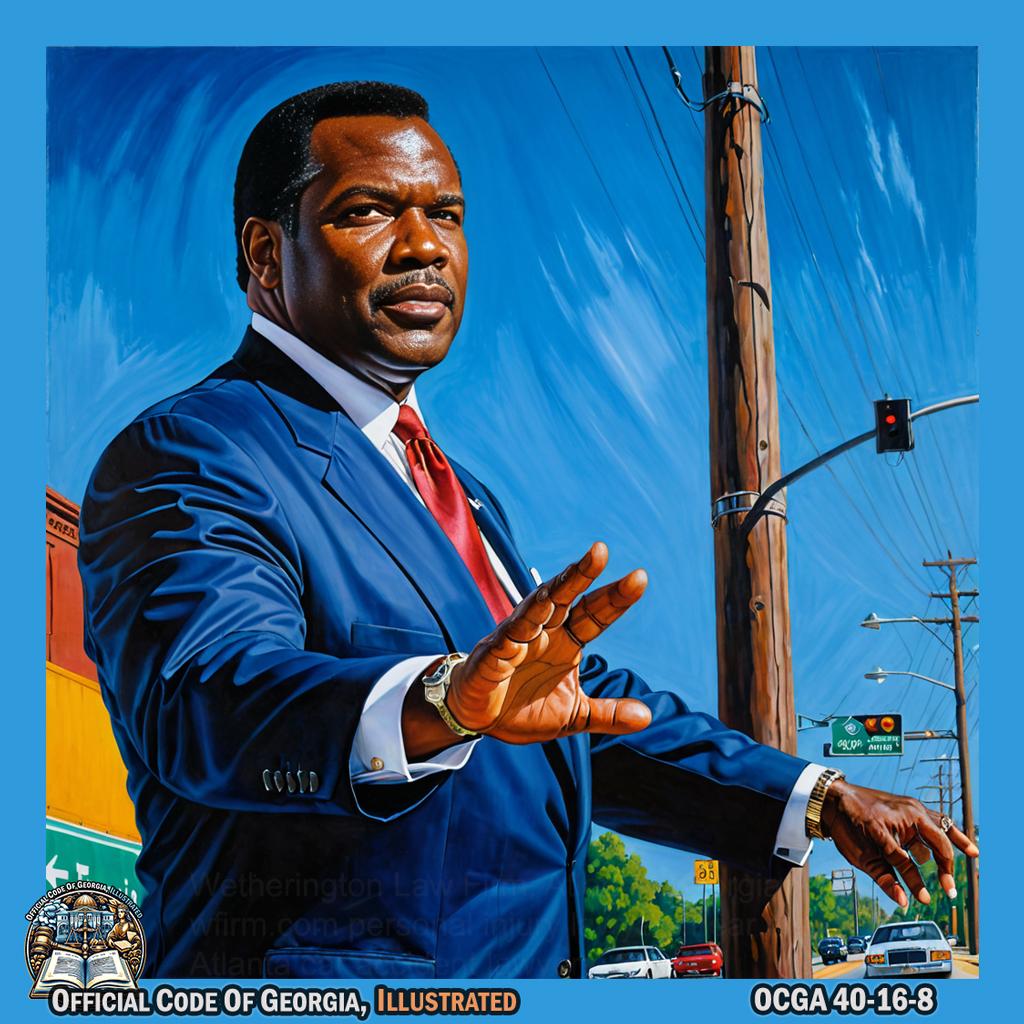
Richard Dent, as the commissioner of transportation or his designee, gracefully extends a hand in a dramatic pose reminiscent of Herb Ritts' style, set against the vibrant backdrop of Atlanta's Lakewood neighborhood. -@Richard_Dent95 -
The state revenue commissioner or his or her designee;
- The Speaker of the House or his or her designee;
-
The chairperson of the House Transportation Committee, who shall chair the committee;

Terrence Edwards standing in a polka-dotted room, holding a chair and gesturing to an imaginary committee with exaggerated hand movements. -@tedwards85 -
The President Pro Tempore of the Senate or his or her designee;
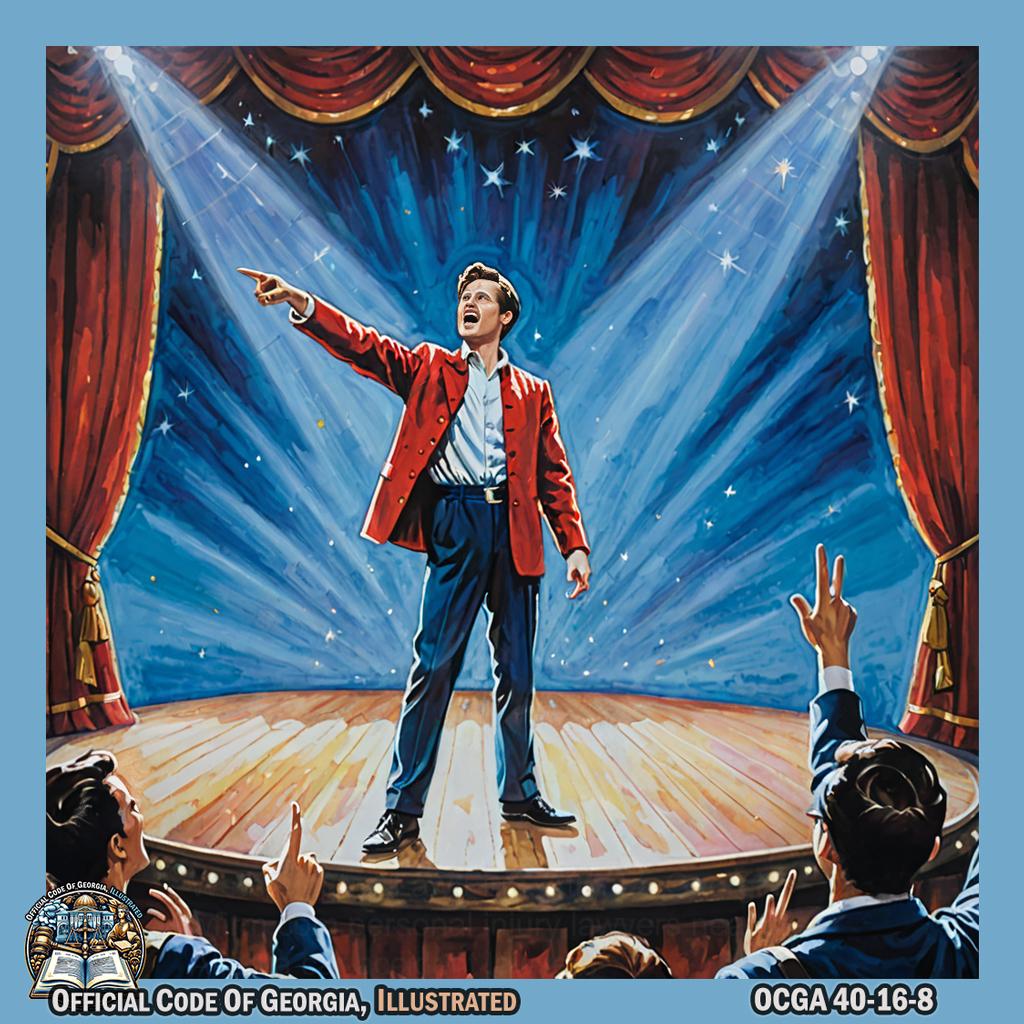
A person standing on a stage, pointing to the sky and then gesturing towards someone in the audience, while others surround them in a theatrical and dynamic display. -@CoxMediaGrp -
The chairperson of the Senate Transportation Committee;
- The president of the Georgia Motor Trucking Association or his or her designee;
- Five industry representatives appointed by the Governor; and
- The Governor or his or her designee who shall serve ex officio.
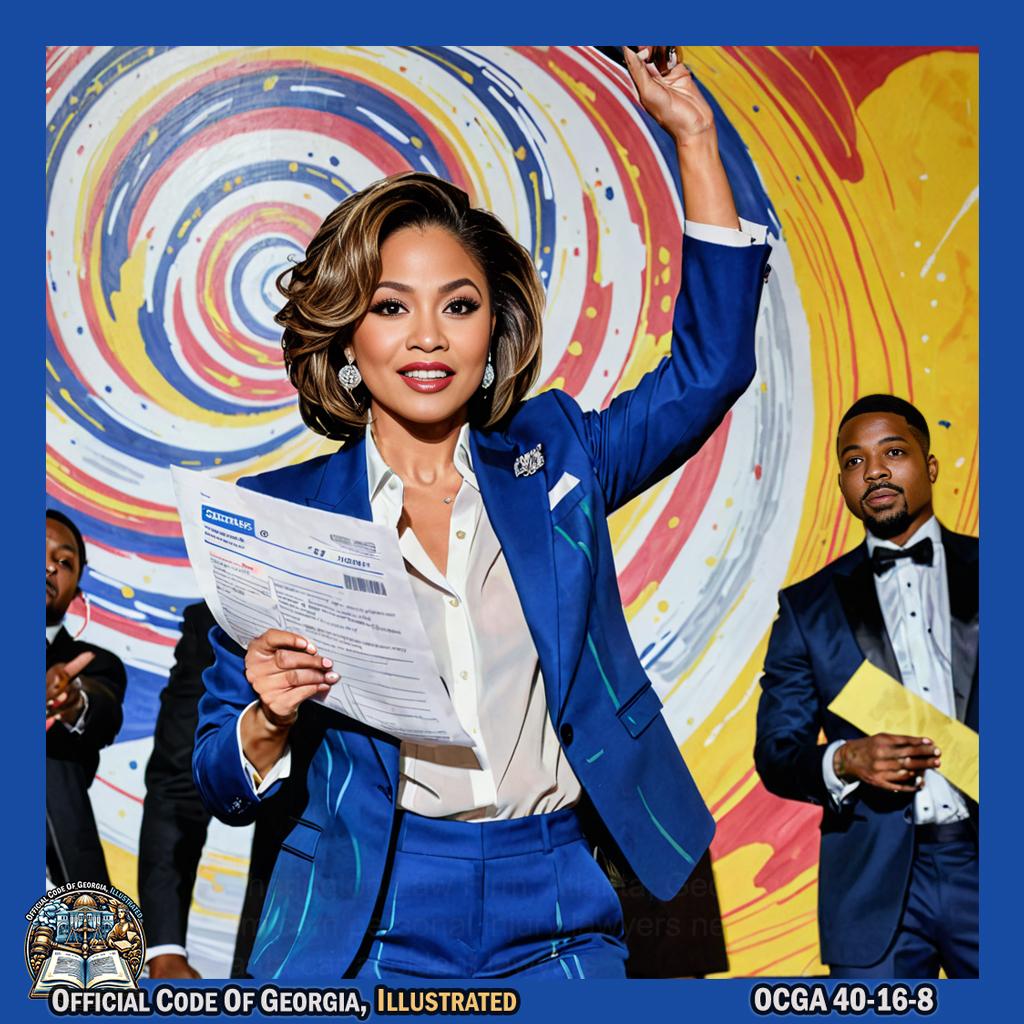
A person wearing a formal suit and holding an official-looking document, gesturing towards someone while standing on a stage with Dem Franchize Boyz dancing in the background, all set against a backdrop of swirling lines and patterns reminiscent of Sandra Cinto's art piece. -@FranchizeBoyz
-
Each member of the committee shall serve until replaced. All members of the committee shall have equal voting privileges on all matters brought before the committee. The committee shall meet at least three times per year at a date and time set by the chairperson. The chairperson shall prepare an agenda for each meeting and shall distribute the agenda for each meeting at least 20 days prior to the date of the meeting.

Travis Tritt is depicted sculpting equal-sized chairs out of natural materials found at Arabia Mountain, placing them in a circle to represent equal voting privileges, then stepping back as if waiting for others to fill them. Each chair has a unique, colorful geometric pattern inspired by Amy Joy Watson's art style. A calendar made of stones marks three dates for meetings, and he holds up a woven tapestry with abstract shapes indicating an agenda while standing on a peak as the sun sets behind him. -@Travistritt